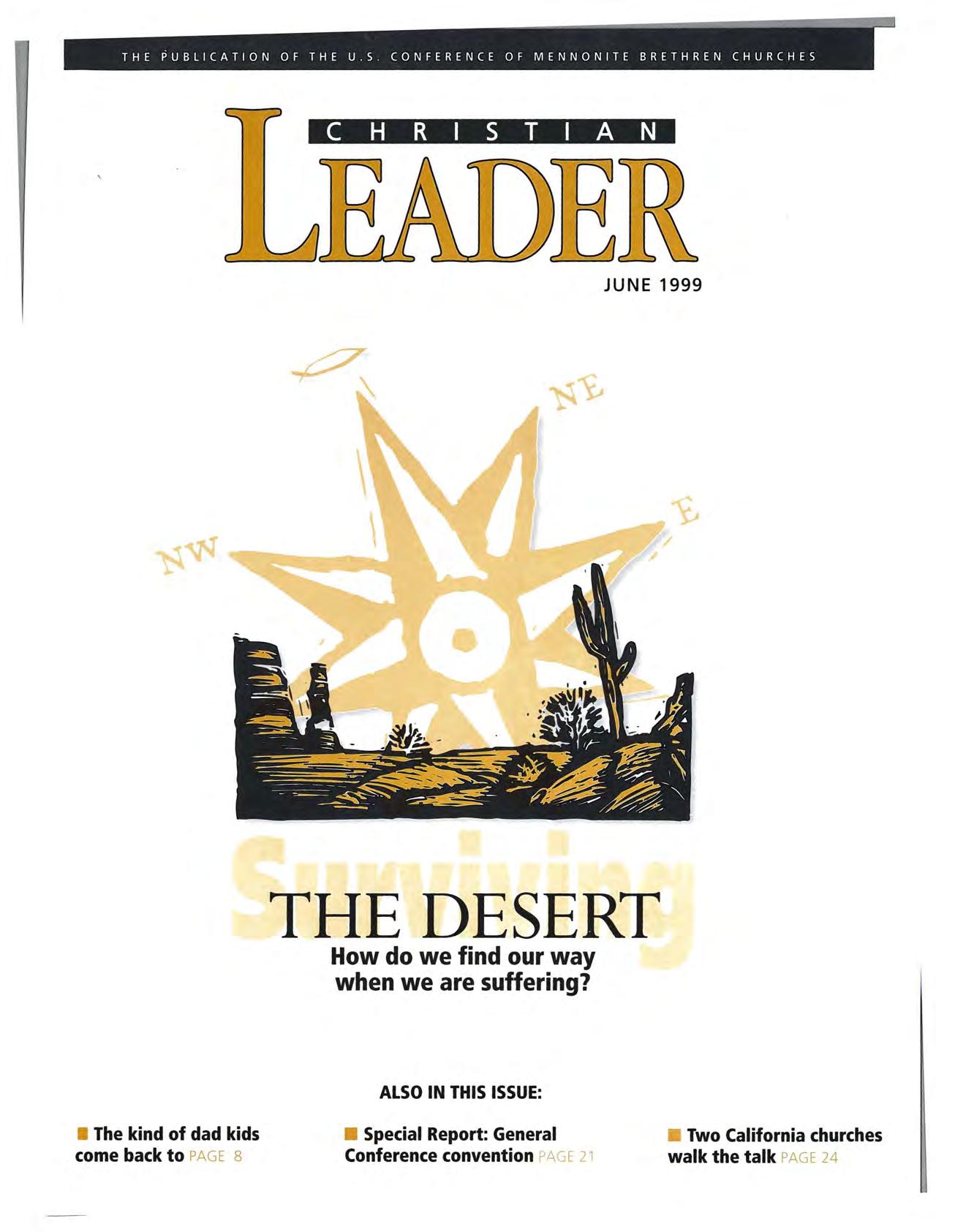

CHRISTIAN
FIRST WORDS ••• from the editor
SUMMER IS HERE. For me, contemplating the next few months always conjures up images of the southwest desert where I grew up, lazy afternoons by a swimming pool and the soft sting of the sun on my skin.
The desert can get very hot, even this early in the summer. In our first article, Doug Miller takes us through the heat of our own personal deserts. How can we survive suffering? Miller pulls some survival skills from Psalm 37.
The beginning of summer brings Father's Day. In our second article, Vange Thiessen takes a look at one of the parables in Luke and explores what kind of father kids come back to.
Summer also brings a slew of weddings. In our third article, Roland Reimer, drawing on his years of officiating and attending weddings, challenges us to make our weddings reflect our faith instead of the culture around us.
This summer holds an important event for North American Mennonite Brethren-the General Conference convention in July. Delegates will vote on a variety of recommendations, but taking center stage is a resolution to dissolve the General Conference. We have included a special report on the convention, including an article on the implications of that resolution. We encourage you to pray that our brothers and sisters will be filled with God's Spirit, wisdom and love as they decide the future of this conference.
God's blessings to you.
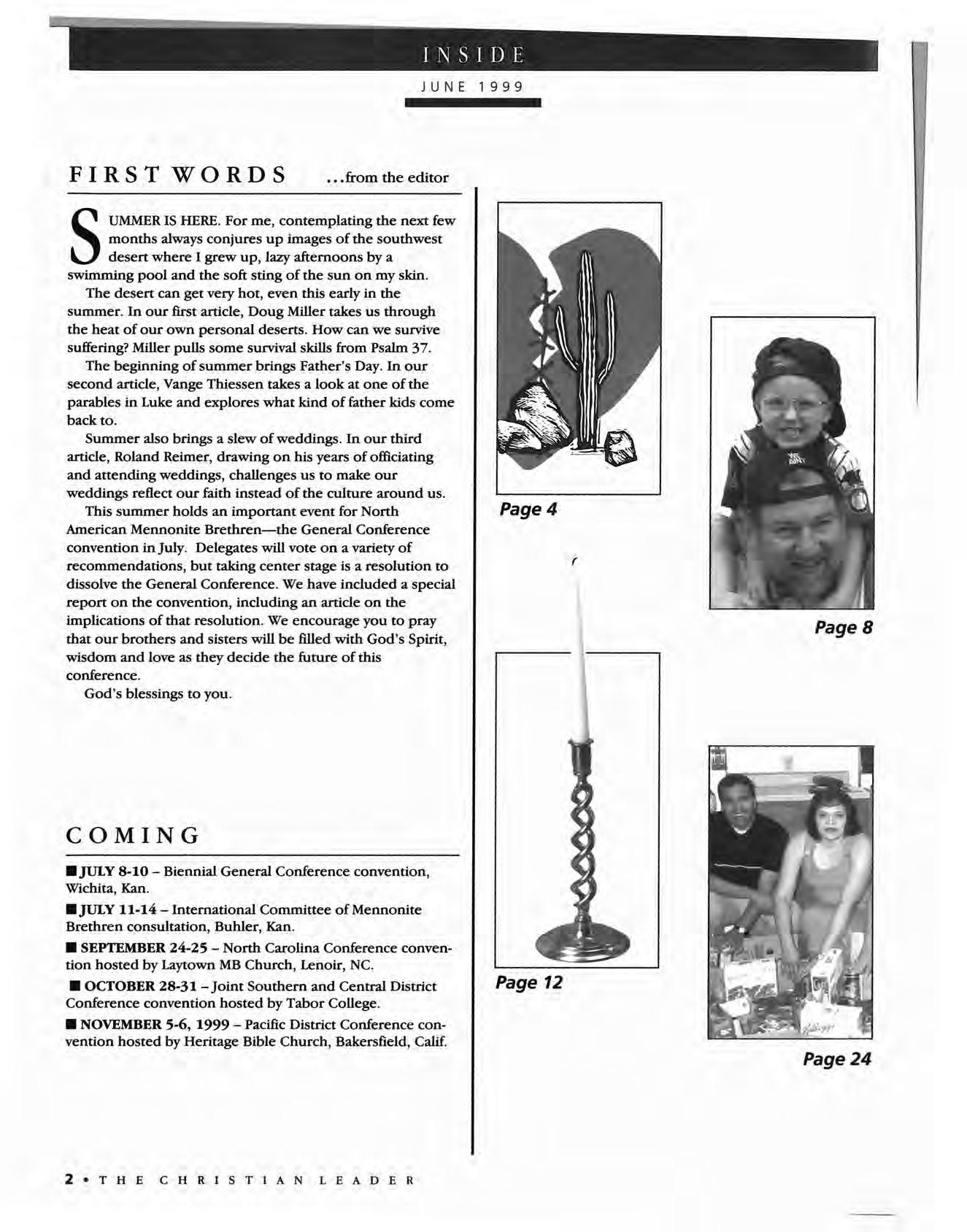
COMING
-JULY 8·10 - Biennial General Conference convention, Wichita, Kan.
JULY 11·14 - International Committee of Mennonite Brethren consultation, Buhler, Kan.
SEPTEMBER 24·25 - North Carolina Conference convention hosted by Laytown MB Church, Lenoir, NC.
OCTOBER 28-31 - Joint Southern and Central District Conference convention hosted by Tabor College.
NOVEMBER 5-6, 1999 - Pacific District Conference convention hosted by Heritage Bible Church, Bakersfield, Calif.
We each have our own personal deserts. Psalm 37 gives us the knowledge and equipment we need to survive. BY DOUG MILLER
The kind of dad kids come back
What can we learn from the Parable of a Father's Love that will help fathers be the kind of dads kids come back to? BY VANGE THIESSEN
12 What is a wedding?
In this age of Cinderella fanfare, what can we as believers do to make our weddings reflect our faith? BY ROLAND REIMER
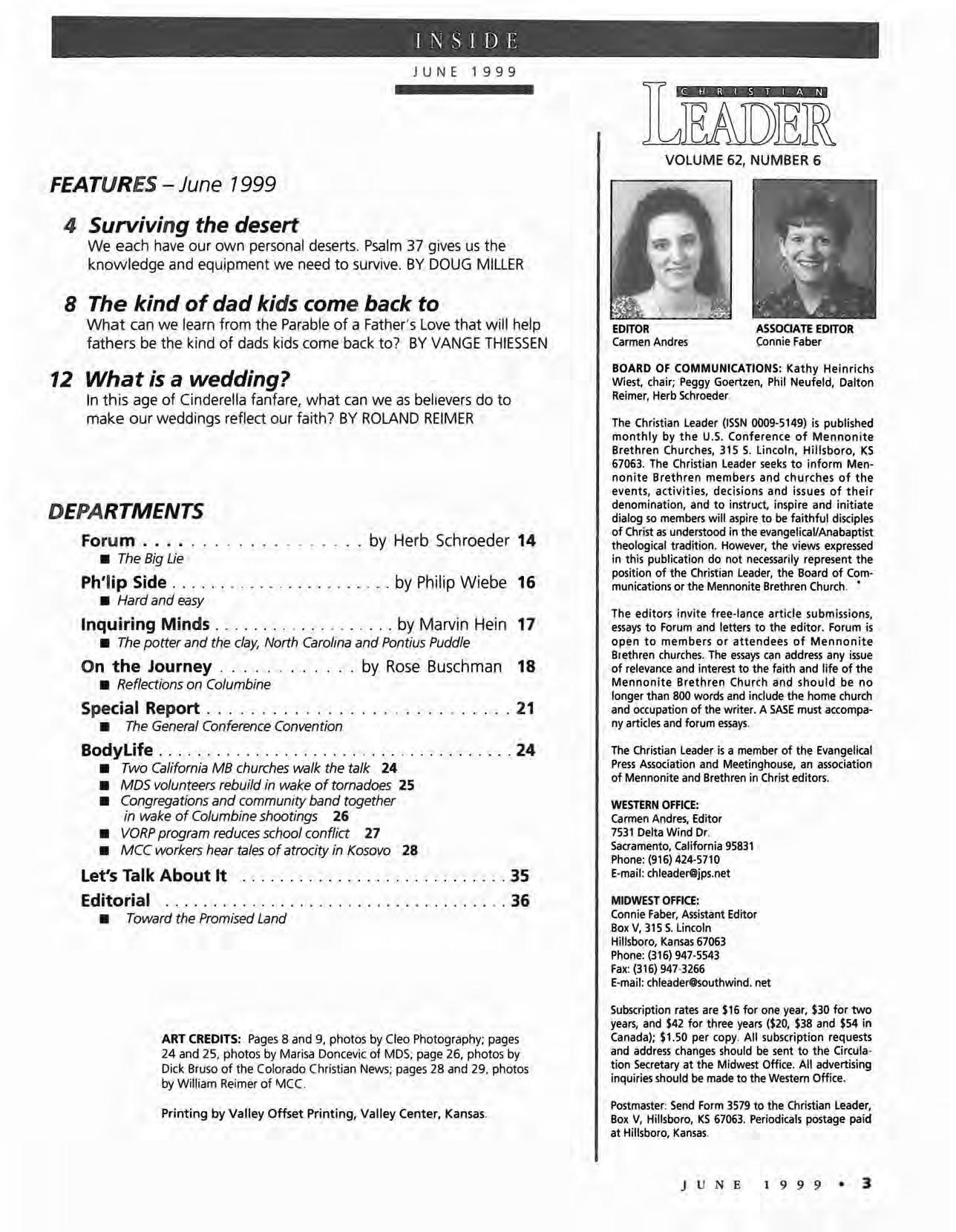
BOARD OF COMMUNICATIONS:
• The Big Lie Ph'lip Side
• Hard and easy Inquiring Minds by Marvin Hein
• The potter and the clay, North Carolina and Pontius Puddle On the Journey by Rose Buschman
• Reflections on Columbine
Special Report
• The General Conference Convention
• Two California MB churches walk the talk 24
• MDS volunteers rebuild in wake of tornadoes 25
• Congregations and community band together in wake of Columbine shootings 26
• VORP program reduces school conflict 27
• MCC workers hear tales of atrocity in Kosovo 28 Forum
The Christian Leader (ISSN 0009-5149) is published monthly by the U.S. Conference of Mennonite Brethren Churches, 315 S. Lincoln, Hillsboro, KS 67063. The Christian Leader seeks to inform Mennonite Brethren members and churches of the events, activities, decisions and issues of their denomination, and to instruct, inspire and initiate dialog so members will aspire to be faithful disciples of Christ as understood in the evangelicaVAnabaptist theological tradition. However, the views expressed in this publication do not necessarily represent the position of the Christian Leader, the Board of Communications or the Mennonite Brethren Church. •
E-mail: chleader@jps.net 21 18 17
The editors invite free-lance article submissions, essays to Forum and letters to the editor. Forum is open to members or attendees of Mennonite Brethren churches. The essays can address any issue of relevance and interest to the faith and life of the Mennonite Brethren Church and should be no longer than 800 words and include the home church and occupation of the writer. A SASE must accompany articles and forum essays.
The Christian Leader is a member of the Evangelical Press Association and Meetinghouse, an association of Mennonite and Brethren in Christ editors.
WESTERN OFFICE:
Carmen Andres, Editor 7531 Delta Wind Dr. Sacramento, California 95831
Phone: (916) 424-5710
MIDWEST OFFICE:
Connie Faber, Assistant Editor
Box V, 315 5. Lincoln Hillsboro, Kansas 67063
Phone: (316) 947-5543
Fax: (316) 947-3266
E-mail: chleader@southwind.net
ART CREDITS: Pages 8 and 9, photos by Cleo Photography; pages 24 and 25, photos by Marisa Doncevic of MDS; page 26, photos by Dick Bruso of the Colorado Christian News; pages 28 and 29, photos by William Reimer of 'v1CC.
Printing by Valley Offset Printing, Valley Center, Kansas.
Subscription rates are $16 for one year, $30 for two years, and $42 for three years ($20, $38 and $54 in Canada); $1.50 per copy. All subscription requests and address changes should be sent to the Circulation Secretary at the Midwest Office. All advertising inquiries should be made to the Western Office.
Postmaster: Send Form 3579 to the Christian Leader, Box V, Hillsboro, KS 67063. Periodicals postage paid at Hillsboro, Kansas.
Kathy Heinrichs Wiest, chair; Peggy Goertzen, Phil Neufeld, Dalton Reimer, Herb Schroeder.
GDT LOST ON THE ARIZONA DESERT when I out 12 years old. I was with the guys in my ub, playing around a watering hole. I thought my way to camp, so I headed out on the fivewalk back, taking the trail I had traveled
Soon I had been walking for over half an hour, and I was getting worried. Nothing looked familiar. The cactus, mountains, sand and heat all seemed pretty much the same as everywhere else. I came to some roads but didn't know whether to keep on going, go back or head in a different direction. I eventually overcame my shyness and started shouting "help!" But silence was all around me.
Walking slowly down a road, looking around, I was becoming increasingly scared and discouraged. When about an hour had gone by, I looked back behind me and saw someone. The figure came closer and closer. It was my club leader-I was saved!
THE DESERT
That experience, frightening as it was, didn't stop me from returning. As a boy, I enjoyed the Arizona desert, which is much like the desert of Israel. It was exciting to go hiking or hunting-and to stumble across the occasional rat\. tlesnake. on the trail.
"\ aUll taking little in the desert and having to actually live in one, as the Israelites did
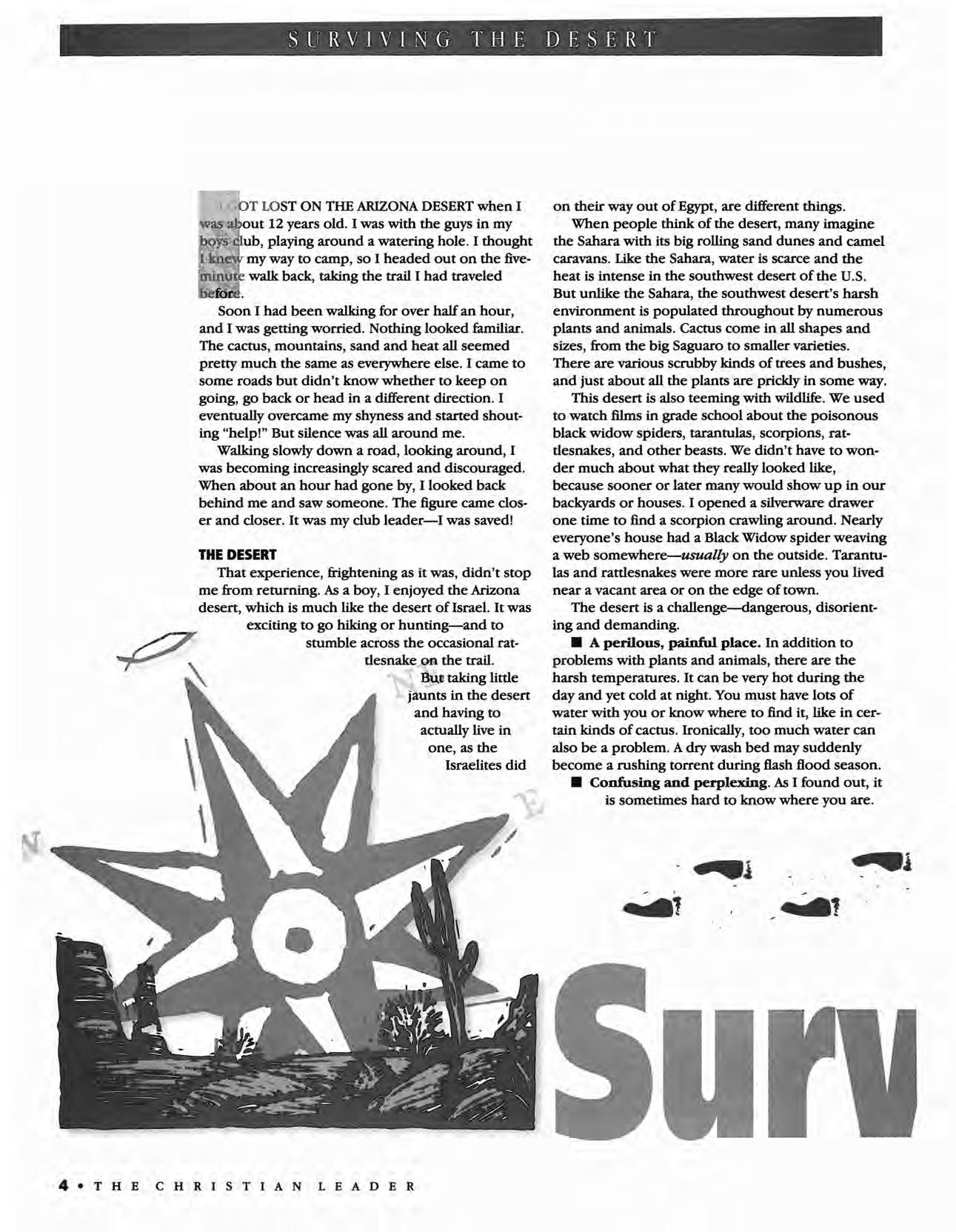
on their way out of Egypt, are different things.
When people think of the desert, many imagine the Sahara with its big rolling sand dunes and camel caravans. Like the Sahara, water is scarce and the heat is intense in the southwest desert of the U.S. But unlike the Sahara, the southwest desert's harsh environment is populated throughout by numerous plants and animals. Cactus come in all shapes and sizes, from the big Saguaro to smaller varieties. There are various scrubby kinds of trees and bushes, and just about all the plants are prickly in some way.
This desert is also teemingwith wildlife. We used to watch films in grade school about the poisonous black widow spiders, tarantulas, scorpions, rattlesnakes, and other beasts. We didn't have to wonder much about what they really looked like, because sooner or later many would show up in our backyards or houses. I opened a silverware drawer one time to find a scorpion crawling around. Nearly everyone's house had a Black Widow spider weaving a web somewhere-usualry on the outside. Tarantulas and rattlesnakes were more rare unless you lived near a vacant area or on the edge of town.
The desert is a challenge-dangerous, disorienting and demanding.
•A perilous, painful place. In addition to problems with plants and animals, there are the harsh temperatures. It can be very hot during the day and yet cold at night. You must have lots of water with you or know where to find it, like in certain kinds of cactus. Ironically, too much water can also be a problem. A dry wash bed may suddenly become a rushing torrent dUring flash flood season.
• Confusing and perplexing. As I found out, it is sometimes hard to know where you are.
The cactus, mountains, and sand come to look all the same. Without landmarks, a compass, or a guide, it's easy to get lost.
• Exacting and draining. I was found after a short hour of walking, but spending any significant amount of time in the desert tests one's resources and energy. To survive may demand all that one can muster, both emotionally and physically.
THE PERSONAL DESERT
The last few years have been a difficult time for my family and for me.It has been like being in the desert-painful, disorienting and demanding.
Few of us, if any, are immune from hardship and tragedy. I am amazed by how many of the major characters in the Bible went through difficult experiences: women who were unable to have children, people who were promised certain things by God and then had to wait a long time before anything happened, people who obeyed God and then experienced abuse from others for that very faithfulness, people who were lonely and friendless and people ,who were killed for their faith.
Your desert is no doubt different from mine, but also very difficult. How can we survive?
PSALM 37 SURVIVAL KIT
If you are out on a desert like the one in Arizona, you need the right resources to survive. First you need to know certain things, like where to find water. You also need the right equipment-at the very least, your snake bite kit and a pair of pliers to pull cactus needles out of your skin.
For our desert times, Scripture offers us knowledge which can equip us for survival. Psalm 37 is a
wisdom or teaching psalm. The psalmist describes a certain kind of desert: the experience of not having what you should have and, at the same time, noticing that your unrighteous neighbor is prospering. The psalmist begins to wonder about the justice of the universe. Is God really in control or not?
Whatever the terrain of our desert, we may also wonder if God is really there, powerful and caring about us. It is easy to get weary and discouraged. The psalmist offers us some good instruction that we can use in any kind of desert.
SURVIVAL TOOL 1: DON'T WORRY
The psalm begins by telling us to stop doing something: "Do not fret because of evil men or be envious of those who do wrong" (37: 1). The writer repeats at least twice more that we ought not to worry or fret (37:7-8).
So, how do we do this?
• Recognize that God is capable and loves us enough to help us. Worry is anticipating something bad that might happen in the future, but it usually has its roots in something else. It is like a headache or a fever: it simply indicates that something else is wrong. Worry is usually caused by one-or both-of two things.
First, we may wonder whether God is capable of rescuing or delivering us from whatever desert we are in. Listening to the testimonies of God's power in the Bible and from others can help us.
Second, many of us have a problem believing that God really loves us enough to do something about
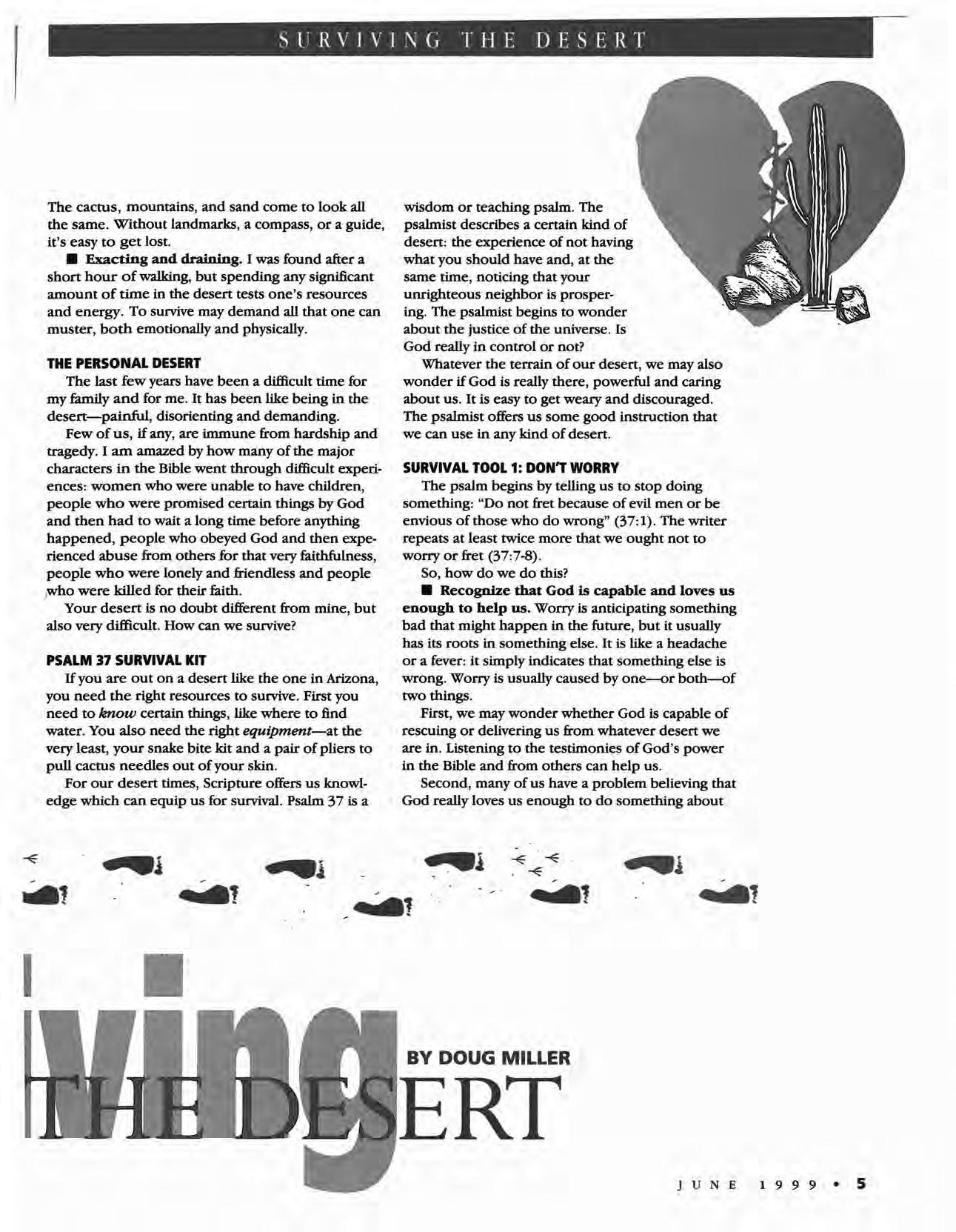
BY DOUG MILLER
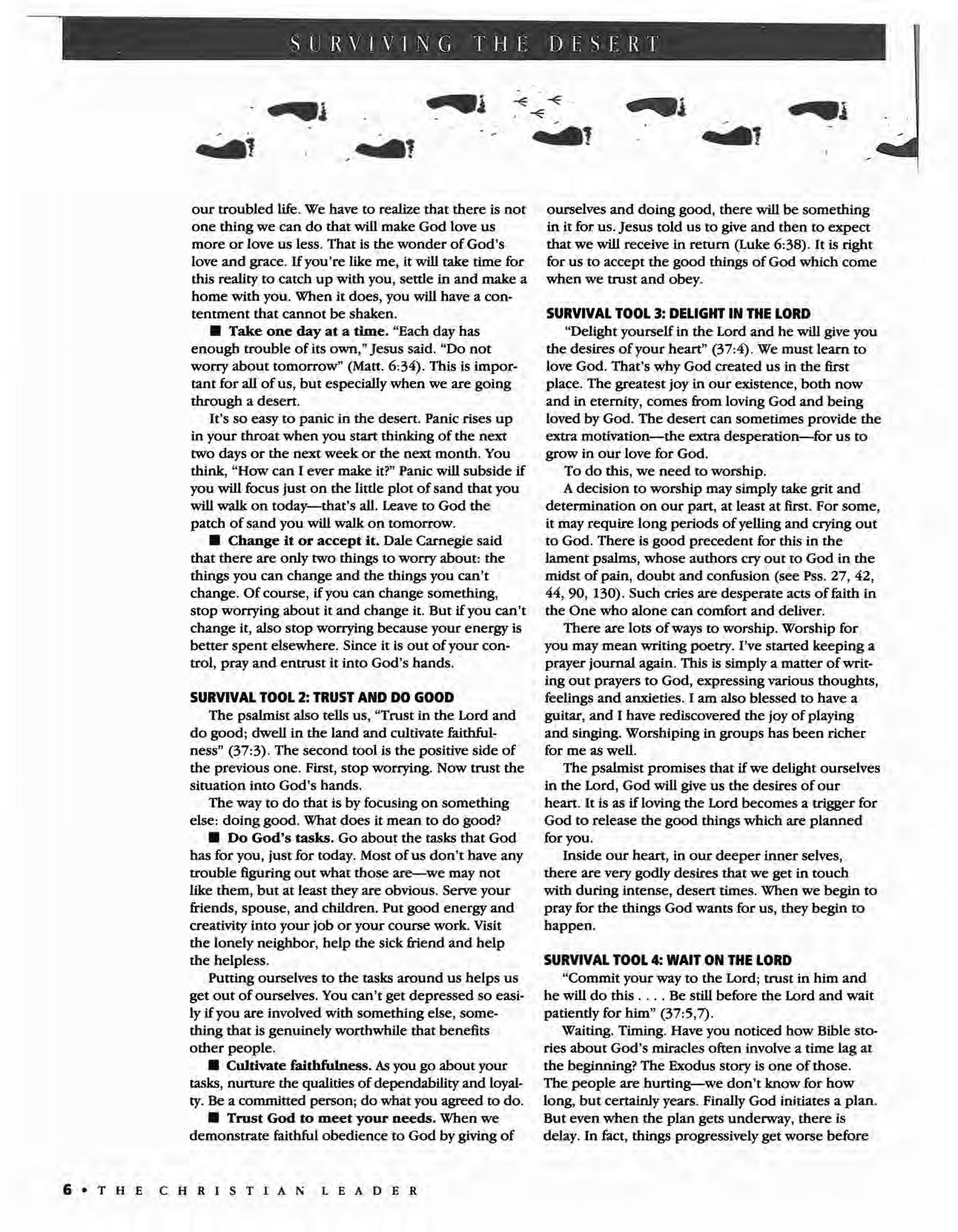
our troubled life. We have to realize that there is not one thing we can do that will make God love us more or love us less. That is the wonder of God's love and grace. If you're like me, it will take time for this reality to catch up with you, settle in and make a home with you. When it does, you will have a contentment that cannot be shaken.
• Take one day at a time. "Each day has enough trouble of its own, n Jesus said. "Do not worry about tomorrow" (Matt. 6:34). This is important for all of us, but especially when we are going through a desert.
It's so easy to panic in the desert. Panic rises up in your throat when you start thinking of the next two days or the next week or the next month. You think, "How can I ever make it?" Panic will subside if you will focus just on the little plot of sand that you will walk on today-that's all. Leave to God the patch of sand you will walk on tomorrow.
• Change it or accept it. Dale Carnegie said that there are only two things to worry about: the things you can change and the things you can't change. Of course, if you can change something, stop worrying about it and change it. But if you can't change it, also stop worrying because your energy is better spent elsewhere. Since it is out of your control, pray and entrust it into God's hands.
SURVIVAL TOOL 2: TRUST AND DO GOOD
The psalmist also tells us, "Trust in the Lord and do good; dwell in the land and cultivate faithfulness" (37:3). The second tool is the positive side of the previous one. First, stop worrying. Now trust the situation into God's hands.
The way to do that is by focusing on something else: doing good. What does it mean to do good?
• Do God's tasks. Go about the tasks that God has for you, just for today. Most of us don't have any trouble figuring out what those are-we may not like them, but at least they are obvious. Serve your friends, spouse, and children. Put good energy and creativity into your job or your course work. Visit the lonely neighbor, help the sick friend and help the helpless.
Putting ourselves to the tasks around us helps us get out of ourselves. You can't get depressed so easily if you are involved with something else, somethingthat is genuinely worthwhile that benefits other people.
• Cultivate faithfulness. As you go about your tasks, nurture the qualities of dependability and loyalty. Be a committed person; do what you agreed to do.
• Trust God to meet your needs. When we demonstrate faithful obedience to God by giving of
ourselves and doing good, there will be something in it for us. Jesus told us to give and then to expect that we will receive in return (Luke 6:38). It is right for us to accept the good things of God which come when we trust and obey.
SURVIVAL TOOL 3: DELIGHT IN THE LORD
"Delight yourself in the Lord and he will give you the desires of your heart" (37:4). We must learn to love God. That's why God created us in the first place. The greatest joy in our existence, both now and in eternity, comes from loving God and being loved by God. The desert can sometimes provide the extra motivation-the extra desperation-for us to grow in our love for God.
To do this, we need to worship.
A decision to worship may Simply take grit and determination on our part, at least at first. For some, it may require long periods of yelling and crying out to God. There is good precedent for this in the lament psalms, whose authors cry out to God in the midst of pain, doubt and confusion (see Pss. 27, 42, 44,90,130). Such cries are desperate acts offaith in the One who alone can comfort and deliver.
There are lots of ways to worship. Worship for you may mean writing poetry. I've started keeping a prayer journal again. This is simply a matter of writing out prayers to God, expressing various thoughts, feelings and anxieties. I am also blessed to have a guitar, and I have rediscovered the joy of playing and singing. Worshiping in groups has been richer for me as well.
The psalmist promises that if we delight ourselves in the Lord, God will give us the desires of our heart. It is as if loving the Lord becomes a trigger for God to release the good things which are planned for you.
Inside our heart, in our deeper inner selves, there are very godly desires that we get in touch with dUring intense, desert times. When we begin to pray for the things God wants for us, they begin to happen.
SURVIVAL TOOL 4: WAIT ON THE LORD
"Commit your way to the Lord; trust in him and he will do this Be still before the Lord and wait patiently for him" (37:5,7).
Waiting. Timing. Have you noticed how Bible stories about God's miracles often involve a time lag at the beginning? The Exodus story is one of those. The people are hurting-we don't know for how long, but certainly years. Finally God initiates a plan. But even when the plan gets underway, there is delay. In fact, things progressively get worse before
The good news is that the desert will end. You will not always have to go through what you are facing now. The hard part is not knowing when it will end.
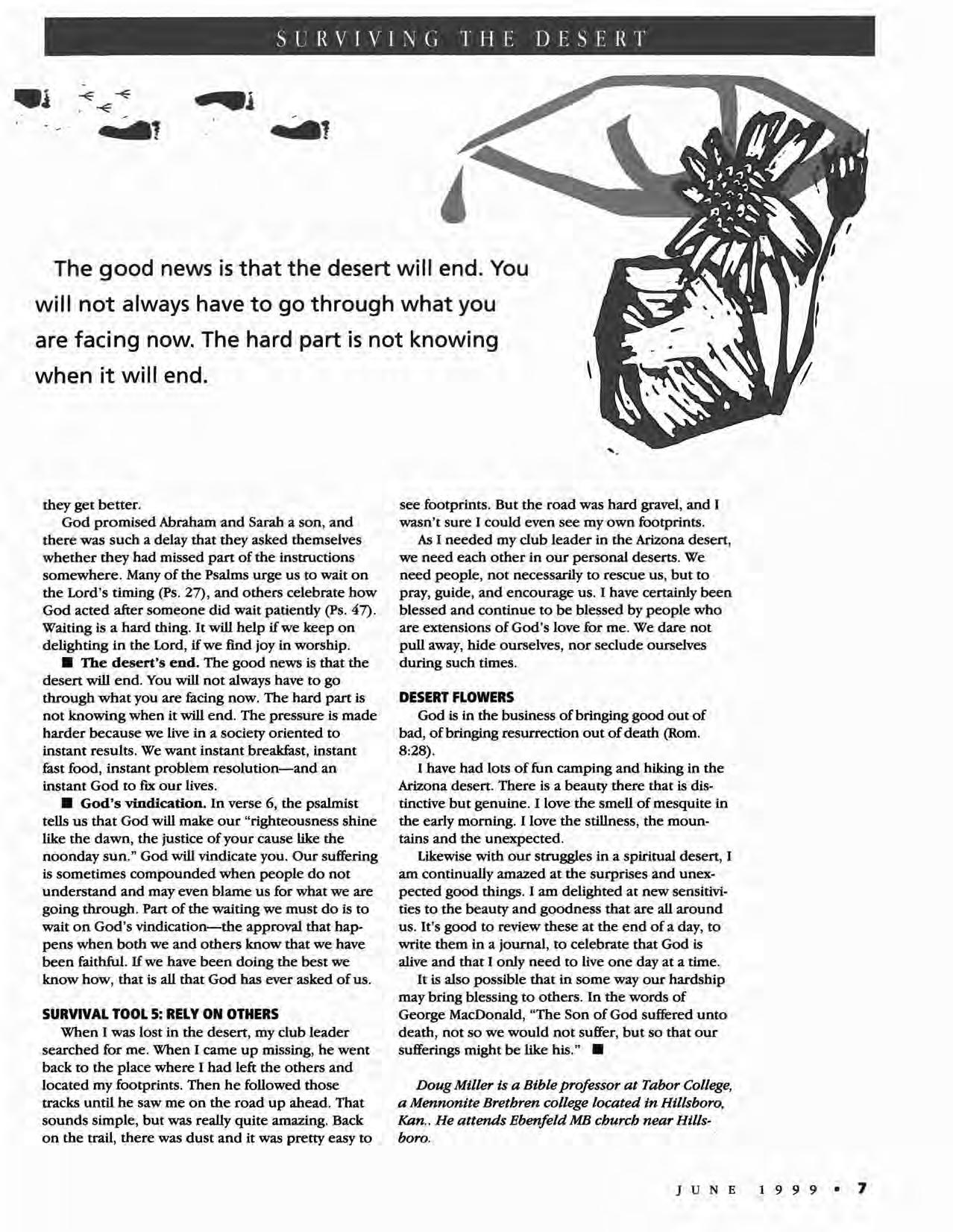
they get better.
God promised Abraham and Sarah a son, and there was such a delay that they asked themselves whether they had missed part of the instructions somewhere. Many of the Psalms urge us to wait on the Lord's timing (ps. 27), and others celebrate how God acted after someone did wait patiently (ps. 47). Waiting is a hard thing. It will help if we keep on delighting in the Lord, if we find joy in worship.
• The desert's end. The good news is that the desert will end. You will not always have to go through what you are facing now. The hard part is not knowing when it will end. The pressure is made harder because we live in a society oriented to instant results. We want instant breakfast, instant fast food, instant problem resolution-and an instant God to fix our lives.
• God's vindication. In verse 6, the psalmist tells us that God will make our "righteousness shine like the dawn, the justice of your cause like the noonday sun." God will vindicate you. Our suffering is sometimes compounded when people do not understand and may even blame us for what we are going through. Part of the waiting we must do is to wait on God's vindication-the approval that happens when both we and others know that we have been faithful. If we have been doing the best we know how, that is all that God has ever asked of us.
SURVIVAL TOOL 5: RELY ON OTHERS
When I was lost in the desert, my club leader searched for me. When I came up missing, he went back to the place where I had left the others and located my footprints. Then he followed those tracks until he saw me on the road up ahead. That sounds simple, but was really quite amazing. Back on the trail, there was dust and it was pretty easy to
see footprints. But the road was hard gravel, and I wasn't sure I could even see my own footprints.
As I needed my club leader in the Arizona desert, we need each other in our personal deserts. We need people, not necessarily to rescue us, but to pray, guide, and encourage us. I have certainly been blessed and continue to be blessed by people who are extensions of God's love for me. We dare not pull away, hide ourselves, nor seclude ourselves dUring such times.
DESERT FLOWERS
God is in the business of bringing good out of bad, of bringing resurrection out of death (Rom. 8:28).
I have had lots of fun camping and hiking in the Arizona desert. There is a beauty there that is distinctive but genuine. I love the smell of mesquite in the early morning. I love the stillness, the mountains and the unexpected.
Likewise with our struggles in a spiritual desert, I am continually amazed at the surprises and unexpected good things. I am delighted at new sensitivities to the beauty and goodness that are all around us. It's good to review these at the end of a day, to write them in a journal, to celebrate that God is alive and that I only need to live one day at a time.
It is also possible that in some way our hardship may bring blessing to others. In the words of George MacDonald, "The Son of God suffered unto death, not so we would not suffer, but so that our sufferings might be like his." •
Doug Miller is a Bible professor at Tabor College, a Mennonite Brethren college located in Hillsboro, Kan He attends Ebenfeld MB church near Hillsboro.
the kind of the parable ofa father's love come ac
BY VANGE THIESSEN
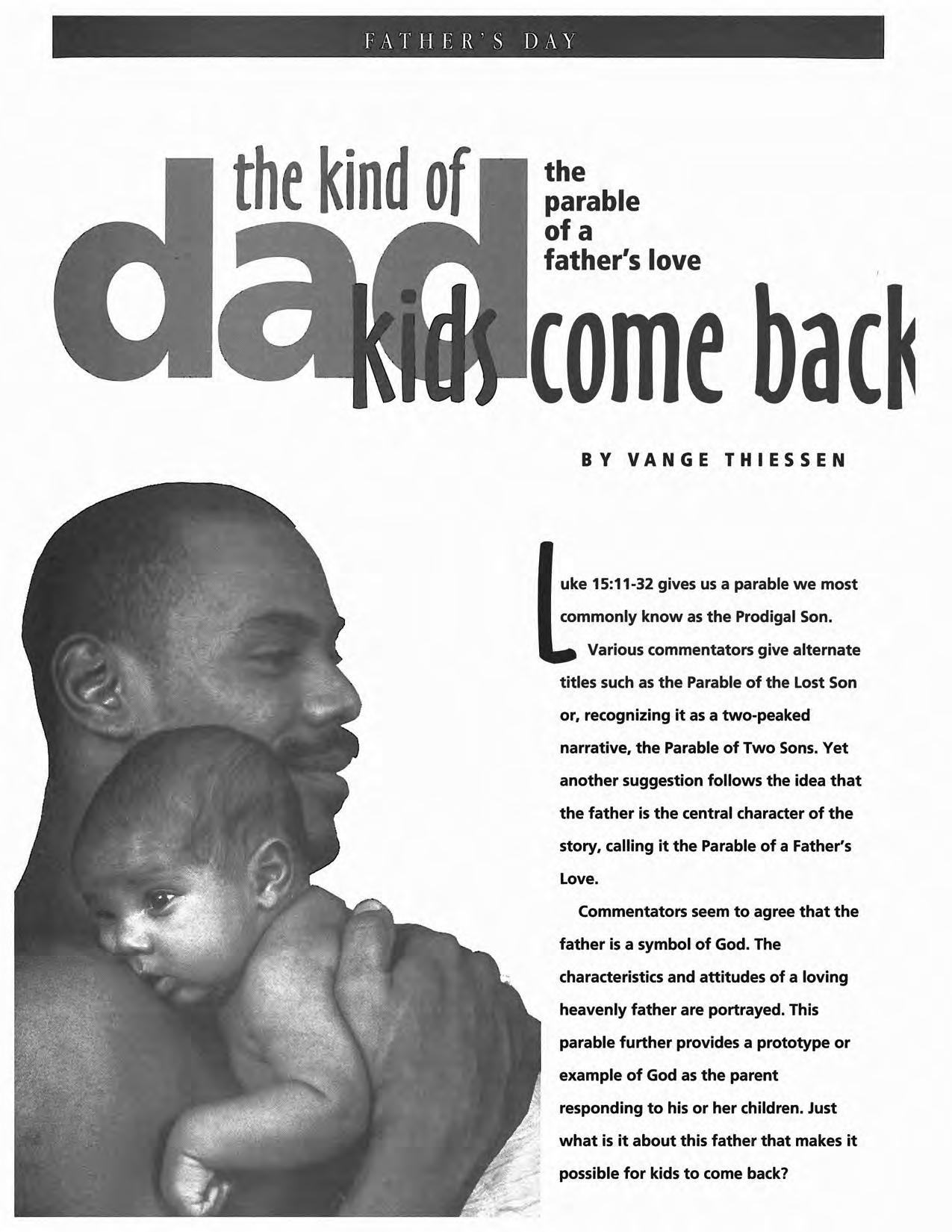
uke 15:11-32 gives us a parable we most commonly know as the Prodigal Son. Various commentators give alternate titles such as the Parable of the Lost Son or, recognizing it as a two-peaked narrative, the Parable of Two Sons. Yet another suggestion follows the idea that the father is the central character of the story, calling it the Parable of a Father's Love.
Commentators seem to agree that the father is a symbol of God. The characteristics and attitudes of a loving heavenly father are portrayed. This parable further provides a prototype or example of God as the parent responding to his or her children. Just what is it about this father that makes it possible for kids to come back?
He grants permission to leave
The story begins, "There was once a man who had two sons." The man is presumably a Palestinian Jewish farmer or landowner who is relatively well off. The younger son, in one of his bolder moments, comes to the father and requests his share of the estate. In the culture of that day, the younger son's share would have been one-third of the estate, since the elder was allotted a double portion. It still seems a ludicrous request, does it not? Imagine yourself in the place of this father. The family farm, business or vocation has been passed down from generation to generation. Your own struggle to follow in the family tradition, in time, creates a strong loyalty and commitment to the task. Over the years you have sacrificed in order for your children to gain a better education, a better start in life. And now this! Your son at age 18 wants his share of the inheritance. But what does he know about wise investments? How can you let him go on his own? Do you not feel an obligation to teach him the ways of the world? Thinking of all your mistakes in the past, you wish you could prevent his fall.
Again the request comes, and a response is required. Contrary to what many parents today would consider a wise and prudent choice, the father obliges. Though various authors comment on the rebellious or disobedient nature of the younger son, I do not see it in the text. The plan of action appears purposeful and intentional. Separation from the parental home is accomplished by a distinct physical removal to a "distant land." No longer under the watchful eye of his father, the son is able to live without restraint and accountability.
But it is more than a physical leaving. In that day, the command to honor parents was understood concretely as the responsibility to care for them in old age. By his actions the younger son also severed emotional relations with his father. He denied his status as son by cutting the ties of love and care.
What kind of father would give permission for a son to leave under such conditions? What merit is there in letting go? Is not the risk too great? There is no evidence in the narrative of a conflictual battle between father and son. And yet I can't imagine it was an easy separation. What might a father experi-
ence? Would you feel loss, anger, pain, fear, disappointment?
For many parents, this must be the most difficult aspect of parenting-letting go. This same struggle is depicted in the relationship of God and Israel. The metaphor for child and loving father is used:
''When Israel was a child, I loved him, and out of Egypt I called my son. It was I who taught Ephraim to walk, taking them by the arms; I led them with cords of human kindness, with ties of love; I lifted the yolk from their neck and bent down to feed them. But the more I called Israel the further they went from me. They did not realize it was I who healed them, how can I give you up, Ephraim? How can I hand you over, Israel? My heart is changed within me; all my compassion is aroused. I will not carry out my fierce anger, nor devastate Ephraim again. They will come back trembling I will settle them in their homes" (taken from Hosea 11: 1-4,8-9, 11).
In order for his child to come back, the father first gives the son permission to leave.
He maintains an open relationship of waiting and watching
Separations are often so difficult in relationships that one or both of the parties tend to move towards cutoff. Physical and ideological distancing may also lead to emotional distance.
But, just as the child begins to separate and explore the world beyond, an inner alarm seems to also trigger the child's need for reassurance. The child needs a secure place to come back to.
This is often very confusing for parents. How can one honestly remain there for the child when they are pushing so hard against everything one stands for? These critical points tend to occur during the toddler stage, in adolescence and, if not sufficiently resolved, again in midlife. I have encountered numerous adults in parenting classes who struggle with their family on origin issues when their own children reach preadolescence. How do we hold together the need both to separate and to be connected?
The father remains ever hopeful, waiting, perhaps daily searching the distant horizon for his son's reappearance. He believes his son will come back. Their meeting is no mere acknowledgment. The Greek word for compassion means "to have the bowels yeaming." I like that. It signifies a deep, inner response of affection and tender mercy. Some comment that a father in that culture would not nor· mally run as he did, which along with his embrace
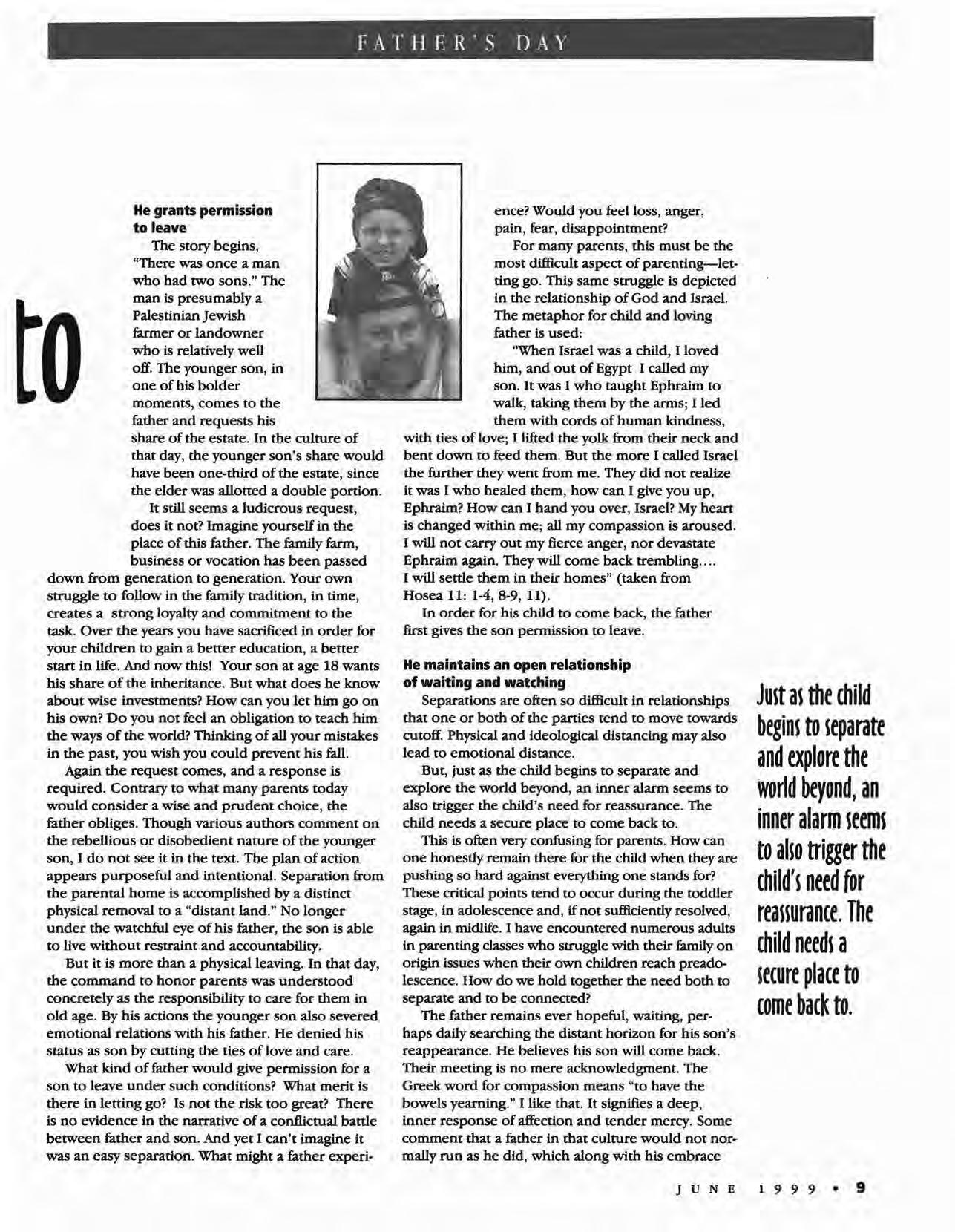
Just as the child begins to separate and explore the world beyond, an inner alarm seems to also trigger the child's need for reassurance. The child needs a secure place to come back to.
Think for a moment about the powerful nurturing force of getting there first. ... The father, in the case of the elder son, got there first. "e took the initiative to seek and to come alongside.
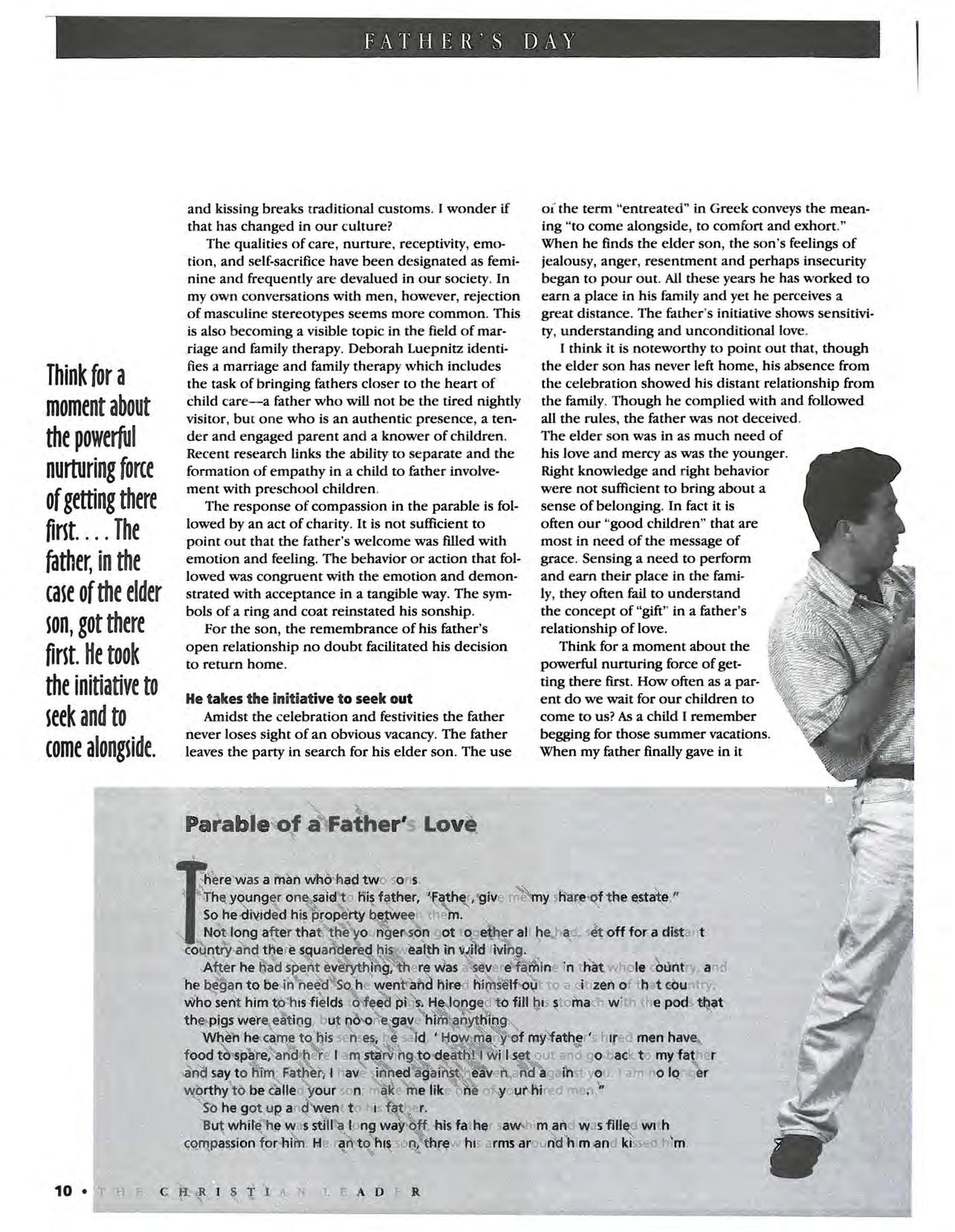
and kissing breaks traditional customs. I wonder if that has changed in our culture?
The qualities of care, nurture, receptivity, emotion, and self-sacrifice have been designated as feminine and frequently are devalued in our society. In my own conversations with men, however, rejection of masculine stereotypes seems more common. This is also becoming a visible topic in the field of marriage and family therapy. Deborah Luepnitz identifies a marriage and family therapy which includes the task of bringing fathers closer to the heart of child care-a father who will not be the tired nightly visitor, but one who is an authentic presence, a tender and engaged parent and a knower of children. Recent research links the ability to separate and the formation of empathy in a child to father involvement with preschool children.
The response of compassion in the parable is followed by an act of charity. It is not sufficient to point out that the father's welcome was filled with emotion and feeling. The behavior or action that followed was congruent with the emotion and demonstrated with acceptance in a tangible way. The symbols of a ring and coat reinstated his sonship.
For the son, the remembrance of his father's open relationship no doubt facilitated his decision to return home.
He takes the initiative to seek out
Amidst the celebration and festivities the father never loses sight of an obvious vacancy. The father leaves the party in search for his elder son. The use
oi:' the term "entreated" in Greek conveys the meaning "to come alongside, to comfort and exhort."
When he finds the elder son, the son's feelings of jealousy, anger, resentment and perhaps insecurity began to pour out. All these years he has worked to earn a place in his family and yet he perceives a great distance. The father's initiative shows sensitivity, understanding and unconditional love.
I think it is noteworthy to point out that, though the elder son has never left home, his absence from the celebration showed his distant relationship from the family. Though he complied with and followed all the rules, the father was not deceived. The elder son was in as much need of his love and mercy as was the younger. Right knowledge and right behavior were not sufficient to bring about a sense of belonging. In fact it is often our "good children" that are most in need of the message of grace. Sensing a need to perform and earn their place in the family, they often fail to understand the concept of "gift" in a father's relationship of love.
Think for a moment about the powerful nurturing force of getting there first. How often as a parent do we wait for our children to come to us? As a child I remember begging for those summer vacations. When my father finally gave in it
seemed a hollow victory. Somehow it never quite felt like a gift. What a different feeling when I received those dozen roses from my family right after graduation-I hadn't even asked for them!
A friend of mine shared another example. For weeks he responded to his daughter's nightly call to tuck her into bed. Before he left the room she would always say," I love you, Daddy." He then would echo," I love you too, Tamara." One night she broke the pattern, "I wish you had said that first, Daddy."
The father, in the case of the elder son, got there first. He took the initiative to seek and to come alongside.
He possesses the ability to celebrate
The statement, "We had to celebrate and be glad," seems to refer to something larger than the younger brother's physical return. In Luke 12, the joy of the lost being found is a common theme in the three parables of the lost sheep, the coin, and the younger son. While the father rejoices that his younger son is found and alive, he longs to be inclusive in the celebration and thus he extends the invitation to the elder son. The feast is a celebration of reconciled relationships.
Jean Vanier has some wonderful things to say about celebration. "To love someone is not to do something for them, but to rejoice in their existence. Forgiveness and celebration a(e at the heart of community. These are the two faces oflove."
Fathers, when you reveal to a child how happy you are that they exist, the process of trust is initiated. Celebration nourishes us, it stores hope and brings strength to live with the disappointments, the suffering and difficulty of everyday life.
The kind of dad kids come back to
This parable of a father's love gives us the characteristics of the kind of dad kids come back to. He gives permission to leave without imposing his personal expectations. Throughout the separation, he watches and awaits the younger son's return all the while maintaining an open, tender, hopeful and affectionate relationship. Not only is he available, but he takes the initiative to seek out the elder son. As he comes alongSide, he shows sensitivity and understanding to the questions, the resentments, the hostilities, the needs and the desires of his child. Finally he celebrates the joy of finding and reconciling broken relationships, the discovery of true connectedness between father and son, between father and daughter.
As men and fathers, I hope that your eyes continue to see more of God as the loving, nurturing, faithful parent.•
Vange 1biessen is afamily therapist and educational coordinator in British Columbia. She is involved in mediation in congregation and community settings. 1bis article is adapted by permission from All Are Witnesses, a collection of sermons by Mennonite Brethren women published by Kindred Productions (1996).
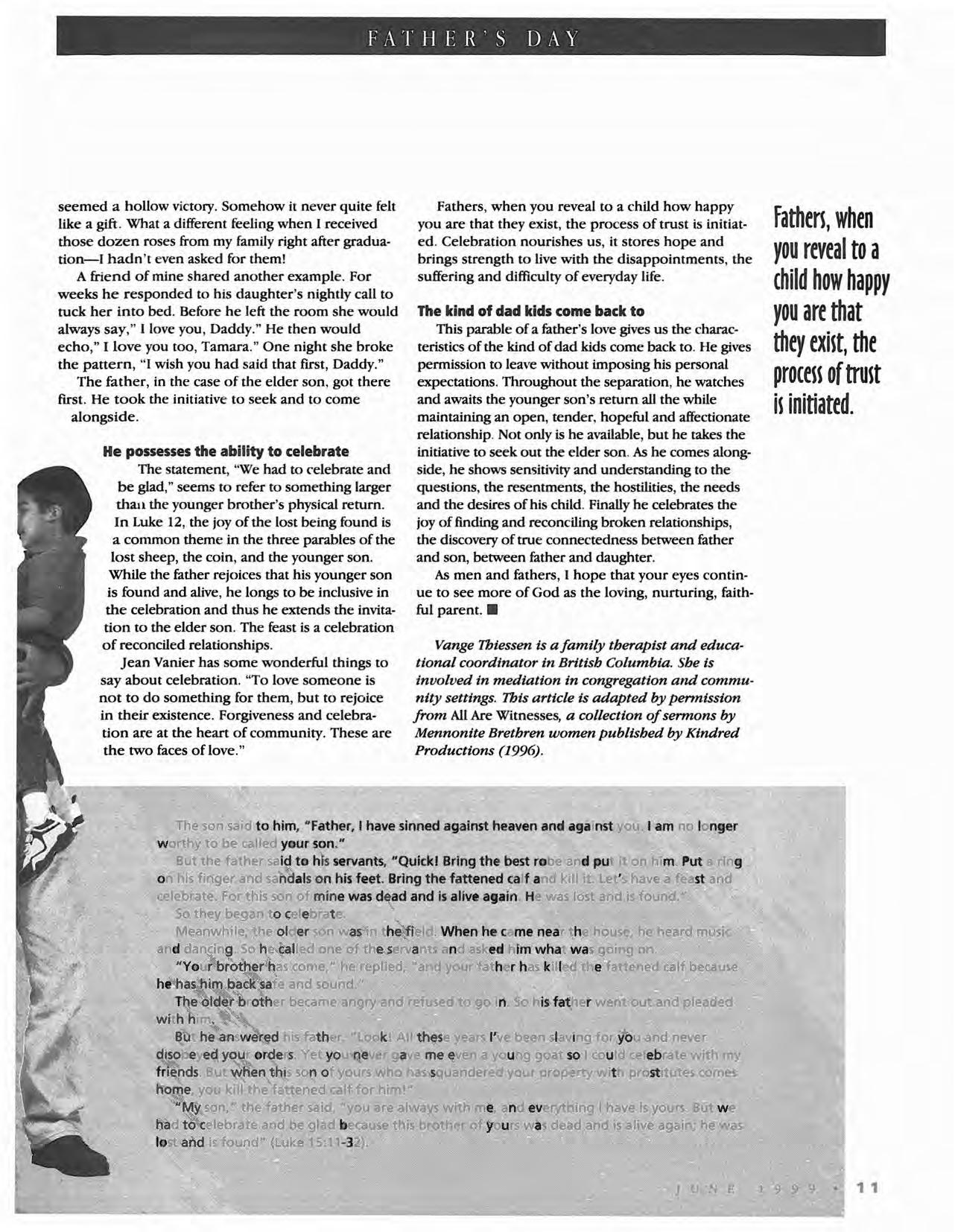
Fathers, when you reveal to a child how happy you are that they eXist, the proceu of trust initiated.
WHAT IS A •

BY ROLAND REIMER
In an age of Cinderella fanfare, what can we do to make our weddings reflect our faith?
'(1RE WEDDINGS A GODLY OR GOOFY EVENT?
Have weddings, customarily a churchly affair and worship service, become a Family Circus or even a Mickey Mouse operation?
About 1,700 couples were married at Disneyworld in one year, each event priced between $2,500 to $20,000. The Evangelical Press News reported that the higher price includes a service for 100 guests in front of Cinderella's Castle with a theme banquet, royal trumpeters, a horse-drawn coach, Tinkerbell and fireworks.
Weddings--the event that celebrates marriage, a God ordained relationship--have changed rather dramatically over the centuries, especially in recent years in our American culture and congregations. Changes in location, content, atmosphere, dress and expenses have made a wedding everything from a simple ceremony to an elaborate production.
As a pastor, I can trace a path through a maze of factors that have influenced my views and practices regarding weddings. Some of them seem increasingly meaningful with time. Others seem rather trite, even petty and sometimes painful when I weigh them against the scale of faithfulness to my call and credentials as a minister of the gospel in the Mennonite Brethren church.
WHAT IS A
WEDDING?
In the Bible, the origin of weddings begins with simple and informal family rituals. Marriage has its origin in the Creation Story (Gen. 1 and 2) as man and woman become one flesh through "leaving and cleaving" in family relationships. In the story of the
arranged marriage between Isaac and Rebekah, the wedding itself is either not mentioned or simply stat· ed. ''Then the servant told Isaac all the things that he had done. Isaac brought her into the tent of his mother Sarah, and he married Rebekah. So she became his wife, and he loved her " (Gen. 24:66, 67a).
Gradually, the event became an occasion involving the clan and took on a communal context. Marriage, a personal and family matter, was acknowledged by society. However, according to James Olthuis' I Pledge You My Troth: A Christian View of Marriage, Family and Friendship, there seems to be no evidence of religious ceremony or blessing of marriages for generations, possibly until the fourth century.
Nevertheless, New Testament records reflect that weddings were a common and public event, particularly for the people of God. Early in his ministry, Jesus attended a wedding by personal invitation. He and his followers participated in a unique wayturning water into wine when the host's supply of wine ran out-which made it a "God-event" with special significance for the kingdom of God Oohn 2:1-11). In his teaching ministry, Jesus anchored his views of marriage in the Creation Story and encour· aged his followers to do the same (Mark 10:5-9).
In the parables of Jesus and the writings of Paul, many of the metaphors for the church are familiar to the marriage and family context, such as the bride and groom marriage festival of the lamb, household of faith, and family of God. Ultimately, the link between the human and the divine is expressed in the statement of the apostle Paul, "Submit to one
another out of reverence for Christ" (Eph. 5:21).
Increasingly, with time, weddings became a sacred event emphasizing a spiritual covenant in which the people of God were present in a solemn yet celebratory atmosphere. Marriage is God's intent for all humanity. For the people of God, a wedding reflects an understanding of marriage as a sacred covenant, not merely a civil arrangement for cohabitation.
HOW TO MAKE WEDDINGS A SACRED EVENT
Jesus participated in a wedding that was a festive event consistent with cultural patterns. According to Scripture, he apparently had much more to say about marriage than about weddings. It seems appropriate, then, that believers' wedding practices should reflect marriage standards that Jesus endorsed rather than contemporary customs.
• Recognize the role of the church. With the development of the church as the primary group to which Christ followers belong, the Community of the Spirit (the congregation) becomes the agency of blessing for the union'of a marital couple and the source for their nurture in that covenant relationship. The presence and participation of the community of faith is significant. Couples should do more than merely stand before a minister, family and friends when they pledge their faithfulness to one another. Believers should do more than watch a performance when a man and a woman unite for life as husband and wife.
• Share the Gospel. Weddings can be opportunities to express ways the Gospel brings hope and forgiveness, so important to relationships that last and those that are threatened to break apart. I appreciate hearing that when and where there is a failure to follow Christ's way, the wonder of forgiveness and the power of the gospel is available for a renewed beginning for the couple.
• Include the famlly. Weddings can be times for biological families to celebrate and bond as they
participate in the service-not merely attend as spectators of a bride-centered ceremony.
• Choose meaningful music. The music can be a medium that promotes the eternal values of the faith and not mere popular ballads of a romantic or humanistic style or current fad.
• Read Scripture. The Scriptures-so relevant to life-can be read with meaning and given attention with respect and reverence. Choose songs and Scriptures that teach godly truths. Use creative and clear symbols that express and describe marital oneness for a lifetime.
• Include prayers of blessing. Prayers of blessing by significant persons in the lives of the couple can add a touch of tenderness and warmth to an event so sacred and yet so personal and familial in nature. Significant people in the church and families can offer their blessings and support which the couple need and cherish in the years ahead.
• Use sacred vows. I find contemporary vows are often incomplete and filled with fluff, whereas the traditional vows are very hard to improve on. Choose vows that specifically reflect the core values of the faith.
• Celebrate. Of course, through all of this, there should be a spirit of joy and celebration unequaled in the world.
A BEUEVER'S WEDDING
So, in this age of Cinderella fanfare, what is a wedding? Ideally for believers, weddings should reflect the biblical components of unreserved commitment, permanent exclusiveness and sacred oneness of the marriage covenant in a spirit of celebrative reverence in the presence of God and his people gathered in his name-for me, that is a wedding.•
Roland Reimer is the district minister for the Southern District of the U.S. Conference ofMennonite Brethren Churches. He attends First MB Church in Wichita, Kan
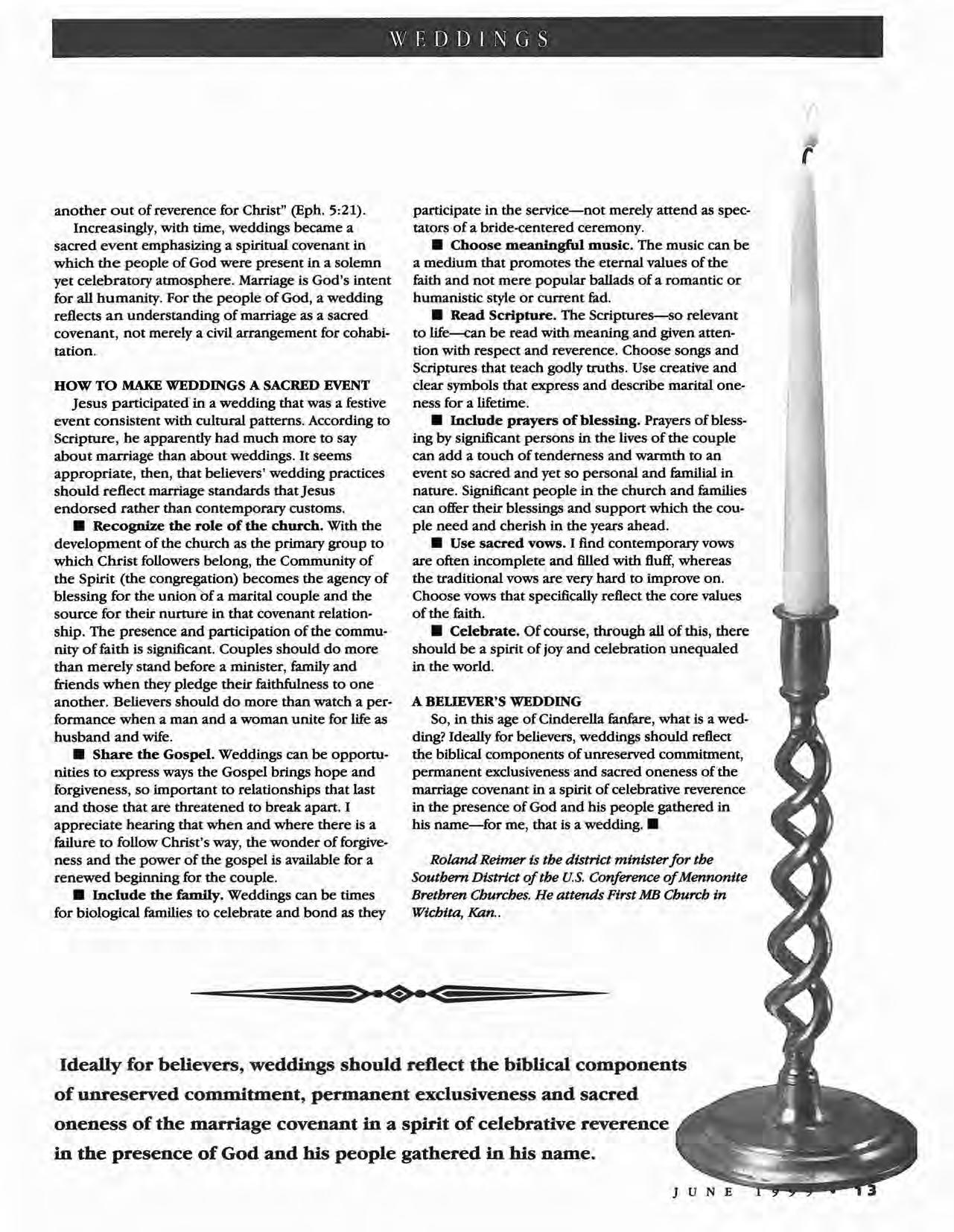
Ideally for believers, weddings should reflect the biblical components of unreserved commitment, permanent exclusiveness and sacred oneness of the marriage covenant in a spirit of celebrative reverence in the presence of God and his people gathered in his name.
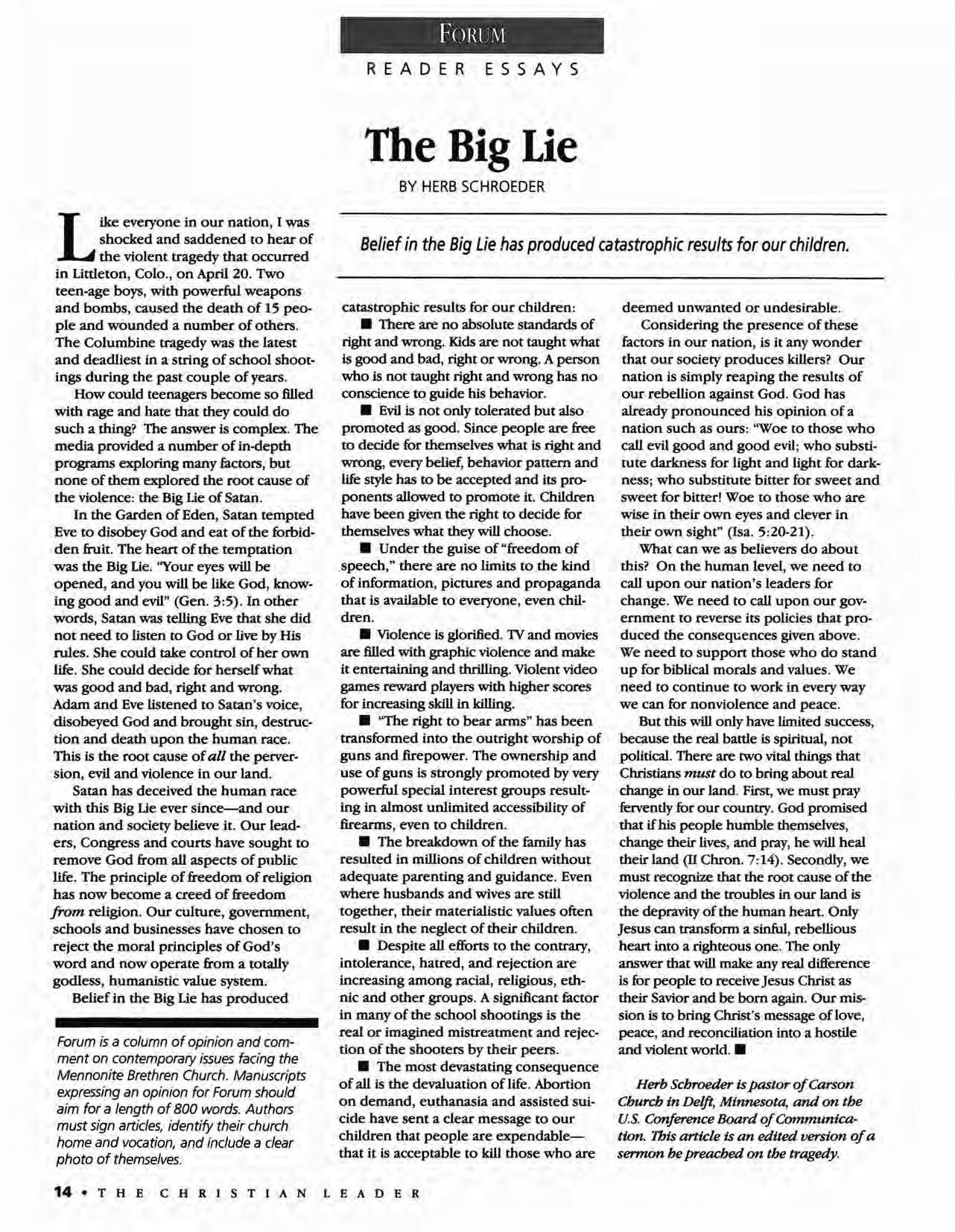
The Big Lie
BY HERB SCHROEDER
Like everyone in our nation, I was shocked and saddened to hear of the violent tragedy that occurred in littleton, Colo., on April 20. Two teen-age boys, with powerful weapons and bombs, caused the death of 15 people and wounded a number of others. The Columbine tragedy was the latest and deadliest in a string of school shootings during the past couple of years.
How could teenagers become so filled with rage and hate that they could do such a thing? The answer is complex. The media provided a number of in-depth programs exploring many factors, but none of them explored the root cause of the violence: the Big lie of Satan.
In the Garden of Eden, Satan tempted Eve to disobey God and eat of the forbidden fruit. The heart of the temptation was the Big lie. "Your eyes will be opened, and you will be like God, knowing good and evil" (Gen. 3:5). In other words, Satan was telling Eve that she did not need to listen to God or live by His rules. She could take control of her own life. She could decide for herself what was good and bad, right and wrong. Adam and Eve listened to Satan's voice, disobeyed God and brought sin, destruction and death upon the human race. This is the root cause of all the perversion, evil and violence in our land. Satan has deceived the human race with this Big Lie ever since-and our nation and society believe it. Our leaders, Congress and courts have sought to remove God from all aspects of public life. The principle of freedom of religion has now become a creed of freedom from religion. Our culture, government, schools and businesses have chosen to reject the moral principles of God's word and now operate from a totally godless, humanistic value system.
Belief in the Big Lie has produced
Forum is a column of opinion and comment on contemporary issues facing the Mennonite Brethren Church. Manuscripts expressing an opinion for Forum should aim for a length of 800 words. Authors must sign articles, identify their church home and vocation, and include a clear photo of themselves.
Belief in the Big Lie has produced catastrophic results for our children.
catastrophic results for our children:
• There are no absolute standards of right and wrong. Kids are not taught what is good and bad, right or wrong. A person who is not taught right and wrong has no conscience to guide his behavior.
• Evil is not only tolerated but also promoted as good. Since people are free to deCide for themselves what is right and wrong, every belief, behavior pattern and life style has to be accepted and its proponents allowed to promote it. Children have been given the right to decide for themselves what they will choose.
• Under the guise of "freedom of speech," there are no limits to the kind of information, pictures and propaganda that is available to everyone, even children.
• Violence is glorified. 1V and movies are filled with graphic violence and make it entertaining and thrilling. Violent video games reward players with higher scores for increasing skill in killing.
• "The right to bear arms" has been transformed into the outright worship of guns and firepower. The ownership and use of guns is strongly promoted by very powerful special interest groups resulting in almost unlimited accessibility of firearms, even to children.
• The breakdown of the family has resulted in millions of children without adequate parenting and guidance. Even where husbands and wives are still together, their materialistic values often result in the neglect of their children.
• Despite all efforts to the contrary, intolerance, hatred, and rejection are increasing among racial, religious, ethnic and other groups. A significantfactor in many of the school shootings is the real or imagined mistreattnent and rejection of the shooters by their peers.
• The most devastating consequence of all is the devaluation of life. Abortion on demand, euthanasia and assisted suicide have sent a clear message to our children that people are expendablethat it is acceptable to kill those who are
deemed unwanted or undesirable.
Considering the presence of these factors in our nation, is it any wonder that our society produces killers? Our nation is simply reaping the results of our rebellion against God. God has already pronounced his opinion of a nation such as ours: ''Woe to those who call evil good and good evil; who substitute darkness for light and light for darkness; who substitute bitter for sweet and sweet for bitter! Woe to those who are wise in their own eyes and clever in their own Sight" (Isa. 5:20-21).
What can we as believers do about this? On the human level, we need to call upon our nation's leaders for change. We need to call upon our government to reverse its policies that produced the conseql'ences given above. We need to support those who do stand up for biblical morals and values. We need to continue to work in every way we can for nonviolence and peace.
But this will only have limited success, because the real battle is spiritual, not political. There are two vital things that Christians must do to bring about real change in our land. First, we must pray fervently for our country. God promised that if his people humble themselves, change their lives, and pray, he will heal their land (II Cbron. 7:14). Secondly, we must recognize that the root cause of the violence and the troubles in our land is the depravity of the human heart. Only Jesus can transform a sinful, rebellious heart into a righteous one. The only answer that will make any real difference is for people to receive Jesus Christ as their Savior and be born again. Our mission is to bring Christ's message oflove, peace, and reconciliation into a hostile and violent world .•
Herb Schroeder is pastor of Carson Church in Delft, Minnesota, and on the U.S. Conference Board of Communication. 'Ibis article is an edited version ofa sermon he preached on the tragedy.
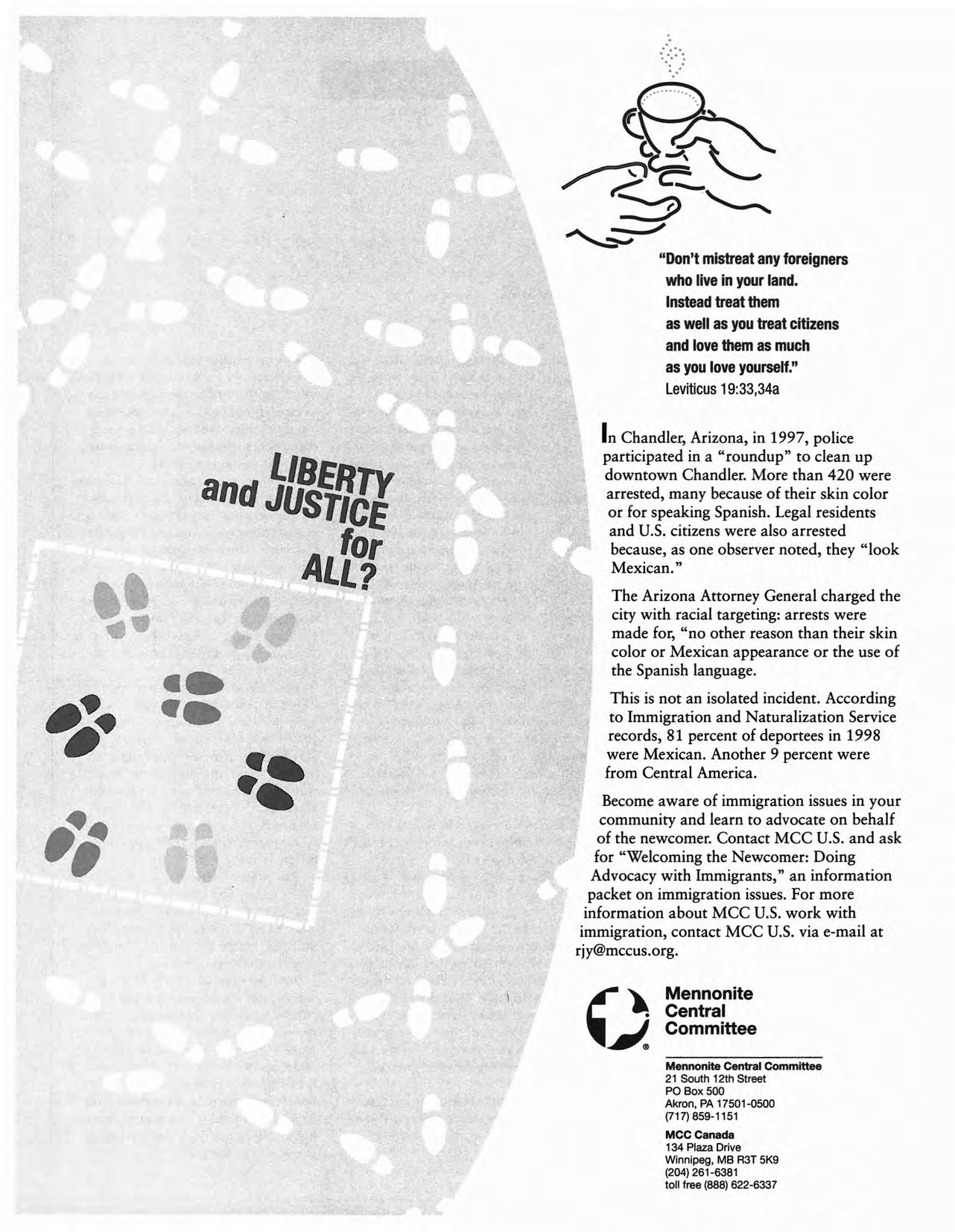
"Don't mistreat any foreigners who live in your land. Instead treat them as well as you treat citizens and love them as much as you love yourself."
Leviticus 19:33,34a
In Chandler, Arizona, in 1997, police participated in a "roundup" to clean up downtown Chandler. More than 420 were arrested, many because of their skin color or for speaking Spanish. Legal residents and U.S. citizens were also arrested because, as one observer noted, they "look Mexican."
The Arizona Attorney General charged the city with racial targeting: arrests were made for, "no other reason than their skin color or Mexican appearance or the use of the Spanish language .
This is not an isolated incident. According to Immigration and Naturalization Service records, 81 percent of deportees in 1998 were Mexican. Another 9 percent were from Central America
Become aware of immigration issues in your community and learn to advocate on behalf of the newcomer. Contact MCC U.S. and ask for "Welcoming the Newcomer: Doing Advocacy with Immigrants," an information packet on immigration issues. For more information about MCC U.S. work with immigration, contact MCC U.S. via e-mail at rjy@mccus.org.
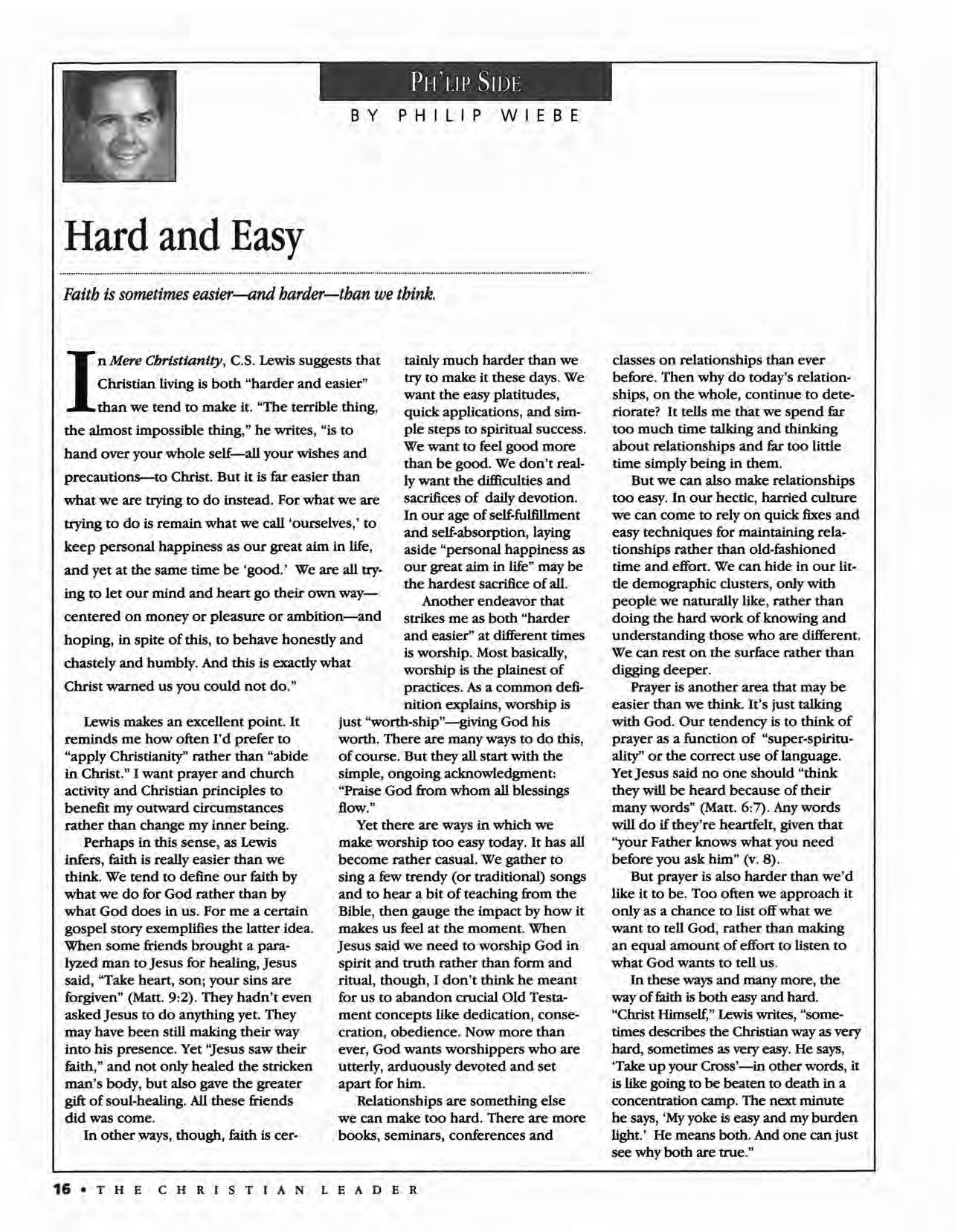
BY PHILIP WIEBE
Hard and Easy
Faith is sometimes easier-and harder-than we think.
InMere Christianity, C.S. Lewis suggests that Christian living is both "harder and easier" than we tend to make it. "The terrible thing, the almost impossible thing," he writes, "is to hand over your whole self-all your wishes and precautions--to Christ. But it is far easier than what we are trying to do instead. For what we are trying to do is remain what we call 'ourselves,' to keep personal happiness as our great aim in life, and yet at the same time be 'good.' We are all trying to let our mind and heart go their own waycentered on money or pleasure or ambition-and hoping, in spite of this, to behave honestly and chastely and humbly. And this is exactly what Christ warned us you could not do."
Lewis makes an excellent point. It reminds me how often I'd prefer to "apply Christianity" rather than "abide in Christ." I want prayer and church activity and Christian principles to benefit my outward circumstances rather than change my inner being.
Perhaps in this sense, as Lewis infers, faith is really easier than we think. We tend to define our faith by what we do for God rather than by what God does in us. For me a certain gospel story exemplifies the latter idea. When some friends brought a paralyzed man to Jesus for healing, Jesus said, "Take heart, son; your sins are forgiven" (Matt. 9:2). They hadn't even asked Jesus to do anything yet. They may have been still making their way into his presence. Yet "Jesus saw their faith," and not only healed the stricken man's body, but also gave the greater gift of soul-healing. All these friends did was come.
In other ways, though, faith is cer-
tainly much harder than we try to make it these days. We want the easy platitudes, quick applications, and simple steps to spiritual success. We want to feel good more than be good. We don't really want the difficulties and sacrifices of daily devotion. In our age of self-ful.fillment and self-absorption, laying aside "personal happiness as our great aim in life" may be the hardest sacrifice of all. Another endeavor that strikes me as both "harder and easier" at different times is worship. Most basically, worship is the plainest of practices. As a common definition explains, worship is just "worth-ship"-giving God his worth. There are many ways to do this, of course. But they all start with the simple, ongoing acknowledgment: "Praise God from whom all blessings Bow."
Yet there are ways in which we make worship too easy today. It has all become rather casual. We gather to sing a few trendy (or traditional) songs and to hear a bit of teaching from the Bible, then gauge the impact by how it makes us feel at the moment. When Jesus said we need to worship God in spirit and truth rather than form and ritual, though, I don't think he meant for us to abandon crucial Old Testament concepts like dedication, consecration, obedience. Now more than ever, God wantsworshippers who are utterly, arduously devoted and set apart for him.
Relationships are something else we can make too hard. There are more books, seminars, conferences and
classes on relationships than ever before. Then why do today's relationships, on the whole, continue to deteriorate? It tells me that we spend far too much time talking and thinking about relationships and far too little time simply being in them.
But we can also make relationships too easy. In our hectic, harried culture we can come to rely on quick fixes and easy techniques for maintaining relationships rather than old-fashioned time and effort. We can hide in our little demographic clusters, only with people we naturally like, rather than doing the hard work of knowing and understanding those who are different. We can rest on the surface rather than digging deeper.
Prayer is another area that may be easier than we think. It's just talking with God. Our tendency is to think of prayer as a function of "super-spirituality" or the correct use of language. Yet Jesus said no one should "think they will be heard because of their many words" (Matt. 6:7). Any words will do if they're heartfelt, given that "your Fatherknows what you need before you ask him" (v. 8).
But prayer is also harder than we'd like it to be. Too often we approach it only as a chance to list off what we want to tell God, rather than making an equal amount of effort to listen to what God wants to tell us.
In these ways and many more, the way of faith is both easy and hard. "Christ Himself," Lewis writes, "sometimes describes the Christian way as very hard, sometimes as very easy. He says, 'Take up your Cross'-in other words, it is like going to be beaten to death in a concentration camp. The next minute he says, 'My yoke is easy and my burden light.' He means both. And one can just see why both are true."
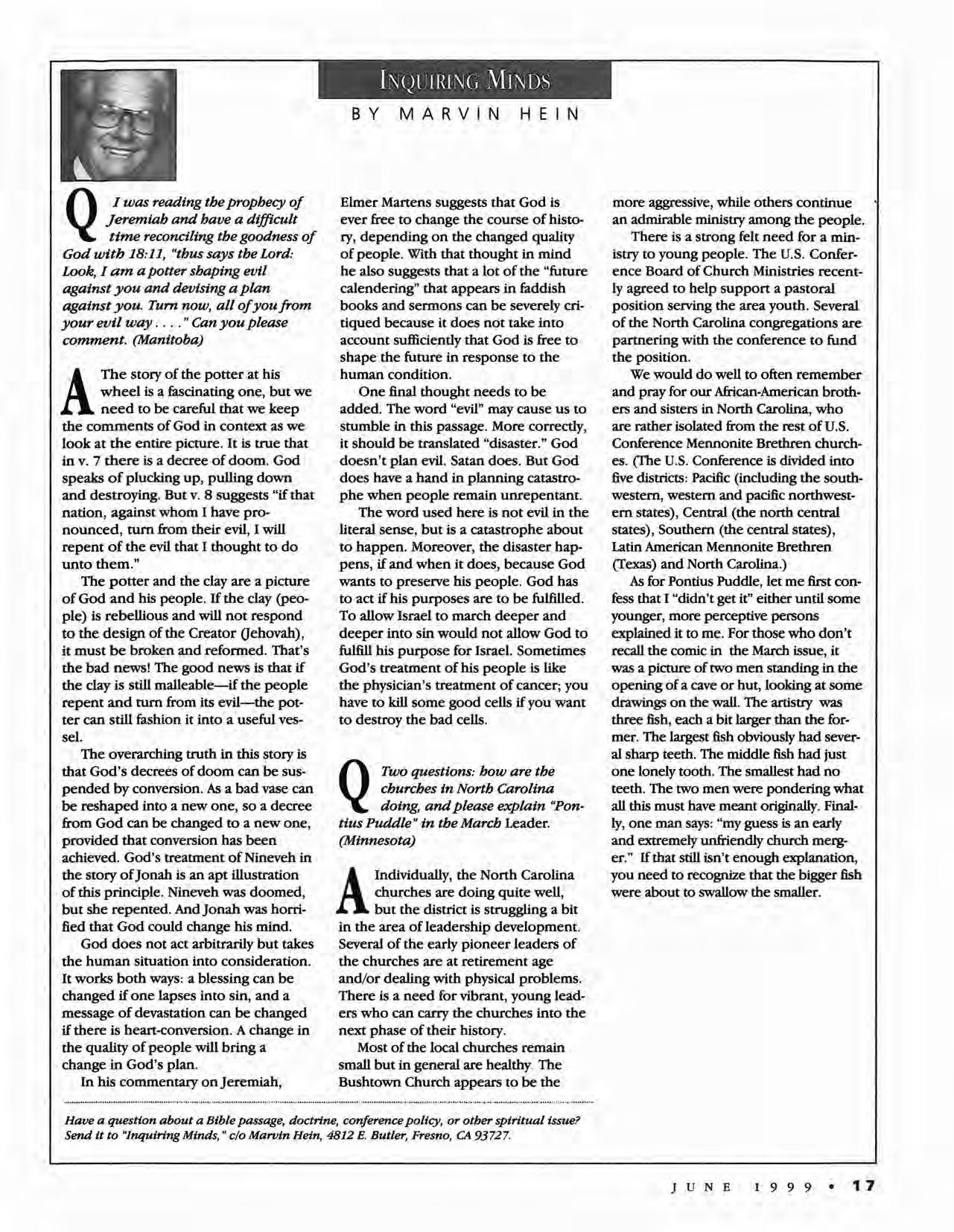
INQUIRING MINDS
BY MARVIN HEIN
QI was reading the prophecy of Jeremiah and have a difficult time reconciling the goodness of God with 18:11, "thus says the Lord: Look, I am a potter shaping evil against you and devising a plan against you. Turn now, all ofyou from your evil way ... " Can you please comment. (Manitoba)
AThe story of the potter at his wheel is a fascinating one, but we need to be careful that we keep the comments of God in context as we look at the entire picture. It is true that in v. 7 there is a decree of doom. God speaks of plucking up, pulling down and destroying. But v. 8 suggests "if that nation, against whom I have pronounced, tum from their evil, I will repent of the evil that I thought to do unto them."
The potter and the clay are a picture of God and his people. If the clay (people) is rebellious and will not respond to the design of the Creator Oehovah), it must be broken and reformed. That's the bad news! The good news is that if the clay is still malleable-if the people repent and turn from its evil-the potter can still fashion it into a useful vessel.
The overarching truth in this story is that God's decrees of doom can be suspended by conversion. As a bad vase can be reshaped into a new one, so a decree from God can be changed to a new one, provided that conversion has been achieved. God's treatment of Nineveh in the story of Jonah is an apt illustration of this principle. Nineveh was doomed, but she repented. And Jonah was horrified that God could change his mind.
God does not act arbitrarily but takes the human situation into consideration. It works both ways: a blessing can be changed if one lapses into sin, and a message of devastation can be changed if there is heart-conversion. A change in the quality of people will bring a change in God's plan.
In his commentary on Jeremiah,
Elmer Martens suggests that God is ever free to change the course of history, depending on the changed quality of people. With that thought in mind he also suggests that a lot of the "future calendering" that appears in faddish books and sermons can be severely critiqued because it does not take into account sufficiently that God is free to shape the future in response to the human condition.
One final thought needs to be added. The word "evil" may cause us to stumble in this passage. More correctly, it should be translated "disaster." God doesn't plan evil. Satan does. But God does have a hand in planning catastrophe when people remain unrepentant.
The word used here is not evil in the literal sense, but is a catastrophe about to happen. Moreover, the disaster happens, if and when it does, because God wants to preserve his people. God has to act if his purposes are to be fulfilled. To allow Israel to march deeper and deeper into sin would not allow God to fulfill his purpose for Israel. Sometimes God's treatment of his people is like the physician's treatment of cancer; you have to kill some good cells if you want to destroy the bad cells.
QTwo questions: how are the churches in North Carolina doing, and please explain "Pontius Puddle" in the March Leader. (Minnesota)
AIndividually, the North Carolina churches are doing quite well, but the district is struggling a bit in the area of leadership development. Several of the early pioneer leaders of the churches are at retirement age and/or dealing with physical problems. There is a need for vibrant, young leaders who can carry the churches into the next phase of their history.
Most of the local churches remain small but in general are healthy. The Bushtown Church appears to be the
Have a question about a Bible passage, doctrine, conference policy, or other spiritual issue? Send it to "Inquiring Minds," c/o Marvin Hein, 4812 E. Butler, Fresno, CA 93727.
more aggressive, while others continue an admirable ministry among the people.
There is a strong felt need for a ministry to young people. The U.S. Conference Board of Church Ministries recently agreed to help support a pastoral position serving the area youth. Several of the North Carolina congregations are partnering with the conference to fund the position.
We would do well to often remember and pray for our African-American brothers and sisters in North Carolina, who are rather isolated from the rest of U.S. Conference Mennonite Brethren churches. (The U.S. Conference is divided into five districts: Pacific (including the southwestern, western and pacific northwestern states), Central (the north central states), Southern (the central states), Latin American Mennonite Brethren (Texas) and North Carolina.)
As for Pontius Puddle, let me first confess that I "didn't get it" either until some younger, more perceptive persons explained it to me. For those who don't recall the comic in the March issue, it was a picture of two men standing in the opening of a cave or hut, looking at some drawings on the wall. The artistry was three fish, each a bit larger than the former. The largest fish obviously had several sharp teeth. The middle fish had just one lonely tooth. The smallest had no teeth. The two men were pondering what all this must have meant originally. Finally, one man says: "my guess is an early and extremely unfriendly church merger." If that still isn't enough explanation, you need to recognize that the bigger fish were about to swallow the smaller.
ON THE JOUR1\fEY
BY ROSE BUSCHMAN
Reflections on Columbine
When I got home from school, I turned on the 1V and watched in horror as the dreadful drama unfolded.
Columbine. The state flower of Colorado.
It is a beautiful flower with its creamand lilac-colored petals that sits in a water-filled glass on my table. Last year, after hearing that a neighbor had successfully raised columbines, we planted several plants and now, this year, are blessed with some magnificent blooms.
Columbine High School, Littleton, Colo. Ahighly respected suburban high school known for its high academic standards and good athletic programs.
I had never heard of Columbine High School until I read an e-mail message from my principal the afternoon of April 20, 1999. He advised us that because of the tragedy there, we were to keep a watchful eye in our areas. We were asked to report anything suspicious to his office immediately. Between classes I checked with other teachers in my area. Does anyone know what this message is aU about? What's happened at Columbine High? Where is it? None of us knew.
As soon as I got home from school I turned on the 1V and watched in horror as the dreadful drama unfolded. I sat stunned. I couldn't believe it was happening. By the time my husband arrived home from work I was in tears.
The next morning, our principal read a statement to the entire school over our in-house 1V system. He asked us to observe 31 seconds of silence, one second for each of the known victimsthose killed and those injured. In my classroom everyone just froze. The room was totally quiet. No shuffling of feet or books. No sneezes. Nothing. Following this period of silence the principal suggested that we could talk about what had happened. I looked at my students and said, "I don't know what to
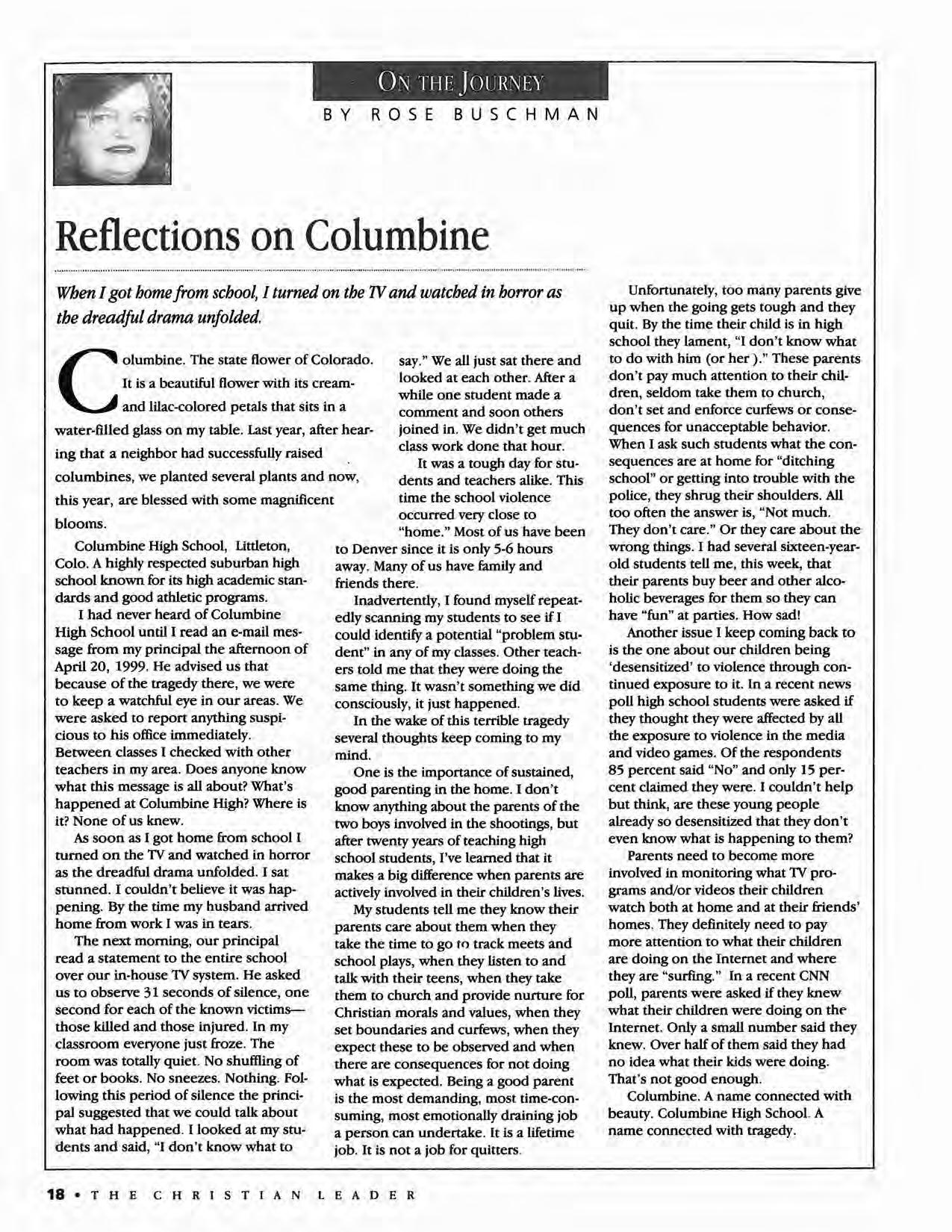
say." We all just sat there and looked at each other. After a while one student made a comment and soon others joined in. We didn't get much class work done that hour.
It was a tough day for students and teachers alike. This time the school violence occurred very close to "home." Most of us have been to Denver since it is only 5-6 hours away. Many of us have family and friends there.
Inadvertently, I found myself repeatedly scanning my students to see if I could identify a potential "problem student" in any of my classes. Other teachers told me that they were doing the same thing. It wasn't something we did consciously, it just happened.
In the wake of this terrible tragedy several thoughts keep coming to my mind.
One is the importance of sustained, good parenting in the home. I don't know anything about the parents of the two boys involved in the shootings, but after twenty years of teaching high school students, I've learned that it makes a big difference when parents are actively involved in their children's lives.
My students tell me they know their parents care about them when they take the time to go tc) track meets and school plays, when they listen to and talk with their teens, when they take them to church and provide nurture for Christian morals and values, when they set boundaries and curlews, when they expect these to be observed and when there are consequences for not doing what is expected. Being a good parent is the most demanding, most time-consuming, most emotionally draining job a person can undertake. It is a lifetime job. It is not a job for quitters.
Unfortunately, too many parents give up when the going gets tough and they qUit. By the time their child is in high school they lament, "I don't know what to do with him (or her )." These parents don't pay much attention to their children, seldom take them to church, don't set and enforce curlews or consequences for unacceptable behavior. When I ask such students what the con· sequences are at home for "ditching school" or getting into trouble with the police, they shrug their shoulders. All too often the answer is, "Not much. They don't care." Or they care about the wrong things. I had several sixteen-year· old students tell me, this week, that their parents buy beer and other alcoholic beverages for them so they can have "fun" at parties. How sad!
Another issue I keep coming back to is the one about our children being 'desensitized' to violence through continued exposure to it. In a recent news poll high school students were asked if they thought they were affected by all the exposure to violence in the media and video games. Of the respondents 85 percent said "No" and only 15 per· cent claimed they were. I couldn't help but think, are these young people already so desensitized that they don't even know what is happening to them?
Parents need to become more involved in monitoring what 1V programs and/or videos their children watch both at home and at their friends' homes. They definitely need to pay more attention to what their children are doing on the Internet and where they are "surfing." In a recent CNN poll, parents were asked if they knew what their children were doing on tht' Internet. Only a small number said they knew. Over half of them said they had no idea what their kids were doing. That's not good enough.
Columbine. A name connected with beauty. Columbine High School. A name connected with tragedy.

"Benchmark data taken from the USA Today Banking Center - April 13, 1999.
·Going... Make Disciples'
Going into our towns and cities to plant churches can create the same apprehension in Christ's followers today that it did among the eleven disciples on the mountain with Jesus. As they worshipped the risen Christ there were doubters among them but Jesus still gave them the commission to "make disciples of all nations, baptizing them in the name of the Father and the Son and of the Holy Spirit, and teaching them to obey everything I have commanded you." Key to their obedience were the words of encouragement that followed, "And surely I amwith you always, to the very end of the age?' We have that same assurance today! The formidable command to bring the lost to Christ continues, but so does the awesome partnership of doing it together with Christ!
Tom and Amy Cartney have answered the call to be disciplemakers. They plan to move to Minnesota to begin a new work in the Minneapolis-St. Paul area. The Central District began to target this metropolitan area for a church plant several years ago. As the project developed, Mission USA was asked to partner with them. A task force formed and the work is in progress.
HLost people m"tter to God "nd therefore m"tte, to us." -Tom C",tney
Tom, a recent graduate of the Mennonite Brethren Biblical Seminary in Fresno, Calif. will continue preparation for ministry in Minnesota while the church plant is emerging. An internship with Wooddale Church is being finalized at present.
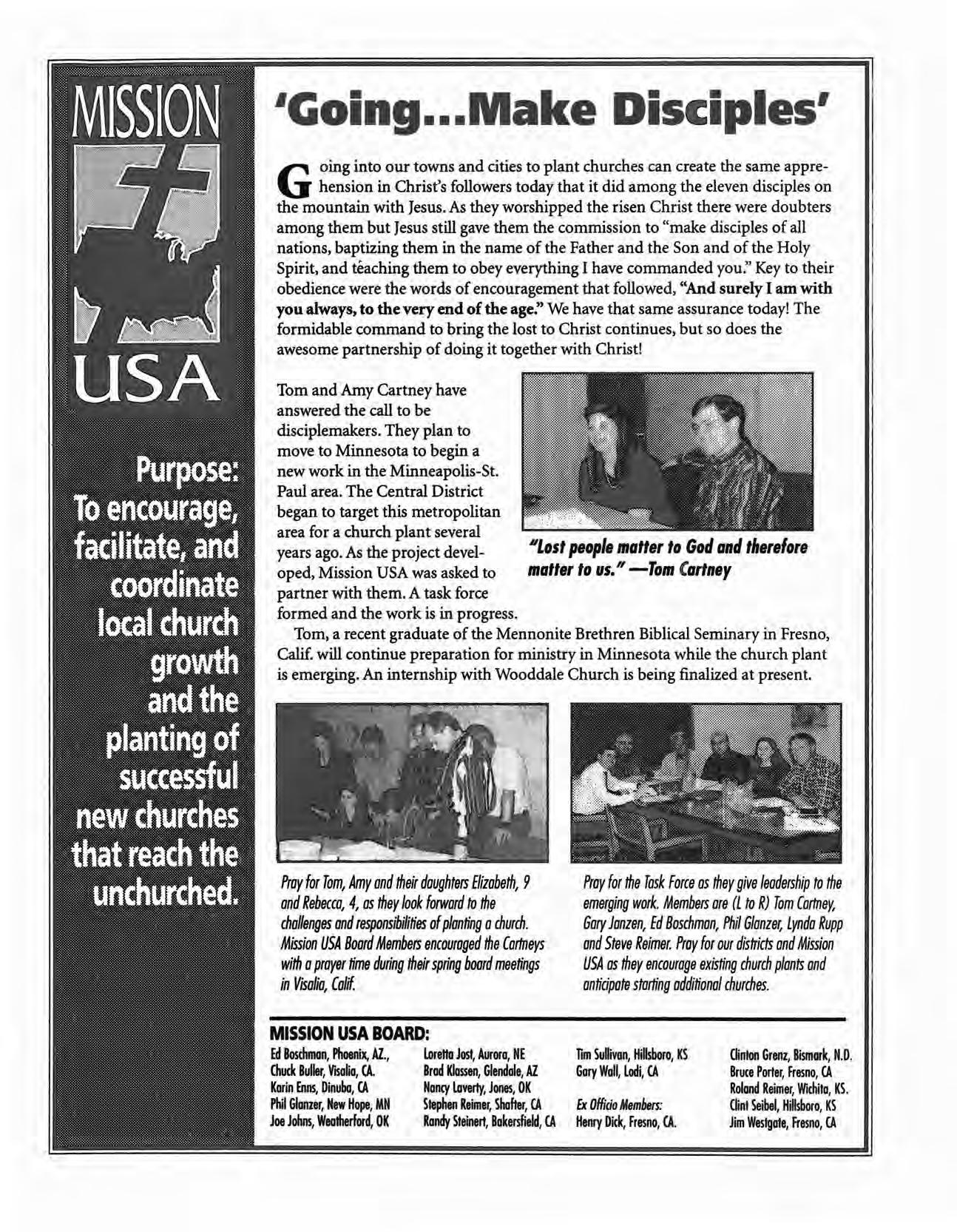
Pray for Tom, Amy and their daughters Elizabeth, 9 and Rebecca, 4, as they look forward ta the challenges and responsibilities of planting achurch. Mission USA Board Members encouraged the Cartneys with aprayer time during their spring board meetings in Visalia, Calif.
MISSION USA BOARD:
Ed Bosthman, Phoenix, AI.., Loretta Jost, Aurora, NE
Chuck Buller, V"lSOlia, CA. Brad Klassen, Glendale, AI.
Karin Enns, Dinubo, CA
Nancy Laverty, Jones, OK
Phil Glanzer, New Hope, MN Stephen Reimer, Shafter, CA
Joe Johns, Wealherford, OK
Randy Steinert, Bakersfield, CA
Pray for the Task Force as they give leadership to the emerging work. Members are (L to R) Tom Cartney, Gary Janzen, Ed Boschman, Phil Glanzer, Lynda Rupp and Steve Reimer. Pray for our districts and Mission USA os they encourage existing church plants and anticipate starting additional churches.
Tim Sullivan, Hillsboro, KS
Gary Wall, Lodi, CA
Ex ORido Members: Henry Dick, Fresno, CA.
ainton Grenz, Bismark, N.D.
Bruce Porter, Fresno, CA
Roland Reimer, Wichita, KS.
Clint Seibel, Hillsboro, KS
Jim Westgate, Fresno, CA
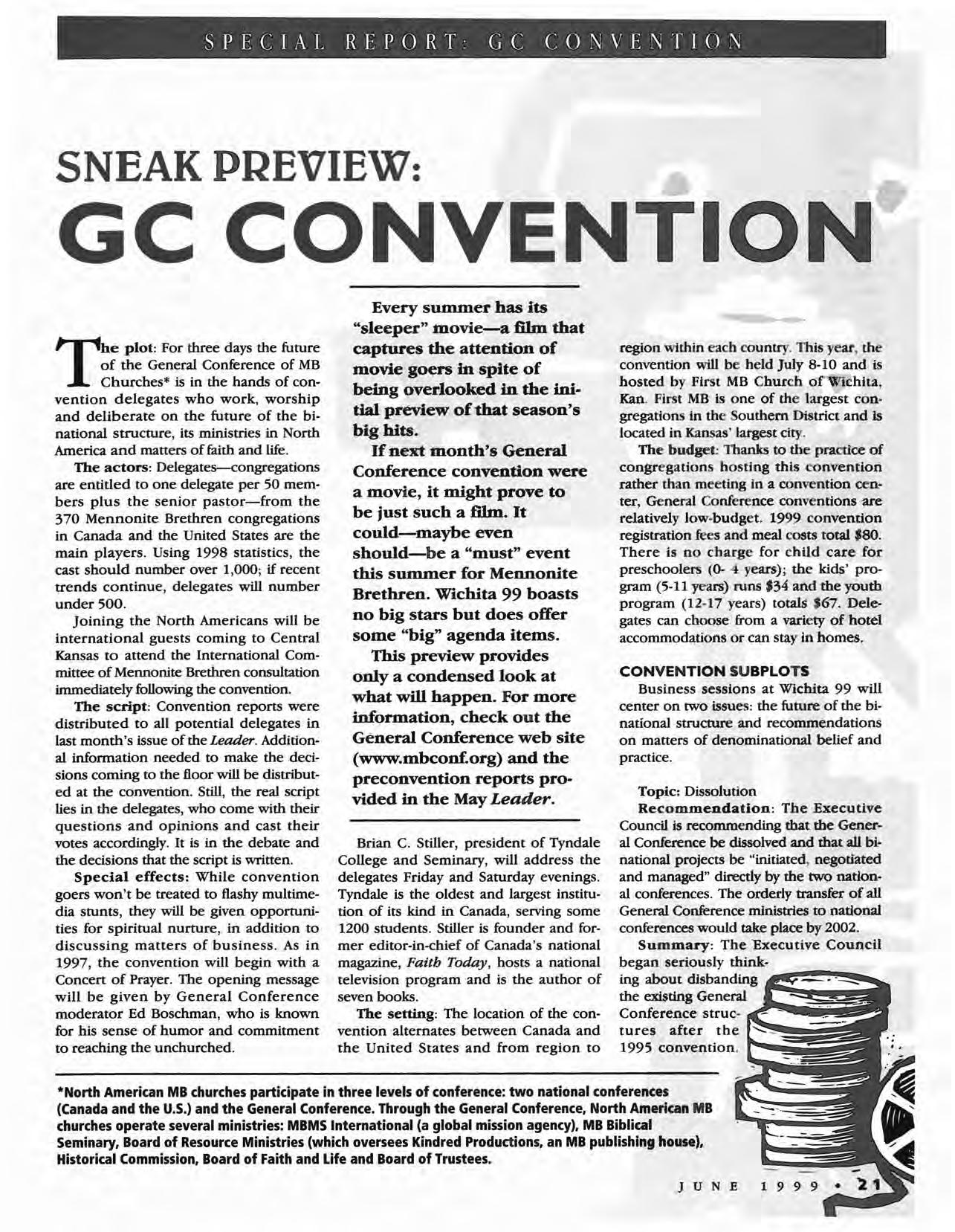
SNEAK PREVIEW: GC CONVENTION
The plot: For three days the future of the General Conference of MB Churches* is in the hands of convention delegates who work, worship and deliberate on the future of the binational structure, its ministries in North America and matters of faith and life.
The actors: Delegates-<:ongregations are entitled to one delegate per 50 members plus the senior pastor-from the 370 Mennonite Brethren congregations in Canada and the United States are the main players. Using 1998 statistics, the cast should number over 1,000; if recent trends continue, delegates will number under 500.
Joining the North Americans will be international guests coming to Central Kansas to attend the International Committee of Mennonite Brethren consultation immediately following the convention.
The script: Convention reports were distributed to all potential delegates in last month's issue of the Leader. Additional information needed to make the decisions coming to the floor will be distributed at the convention. Still, the real script lies in the delegates, who come with their questions and opinions and cast their votes accordingly. It is in the debate and the decisions that the script is written.
Special effects: While convention goers won't be treated to flashy multimedia stunts, they will be given opportunities for spiritual nurture, in addition to discussing matters of business. As in 1997, the convention will begin with a Concert of Prayer. The opening message will be given by General Conference moderator Ed Boschman, who is known for his sense of humor and commitment to reaching the unchurched.
Every summer has its "sleeper" tilovie-a film that captures the attention of movie goers in spite of being overlooked in the initial preview of that season's big hits.
If next month's General Conference convention were a movie, it might prove to be just such a film. It could-maybe even should-be a "must" event this summer for Mennonite Brethren. Wichita 99 boasts no big stars but does offer some "big" agenda items. This preview provides only a condensed look at what will happen. For more information, check out the General Conference web site (www.mbconf.org) and the preconvention reports provided in the May Leader.
Brian C. Stiller, president of Tyndale College and Seminary, will address the delegates Friday and Saturday evenings. Tyndale is the oldest and largest institution of its kind in Canada, serving some 1200 students. Stiller is founder and former editor-in-chief of Canada's national magazine, Faith Today, hosts a national television program and is the author of seven books.
The setting: The location of the convention alternates between Canada and the United States and from region to
region within each country. This year, the convention will be held July 8-10 and is hosted by Flt'st MB Church of ehita, Kan. First MB is one of the largest con· gregations in the Southern District and is located in Kansas' largest city.
The budget: Thanks to the practice of congregations hosting this convention rather than meeting in a convention center, General Conference conventions are relatively low-budget. 1999 convention registration fees and meal costs total '80. There is no charge for child care for preschoolers (0- 4 years); the kicl$' program (5-11 years) runs $34 and the youth program (12-17 years) totalS $67. Delegates can choose from a variety of botel accommodations or can stay in
CONVENTION SUBPLOTS
Business sessions at Wichita 99 will center on two issues: the future of the binational structure and recommendations on matters of denominational belief and practice.
Topic: Dissolution
Recommendation: The Executive Council is recommending that the al Conference be dissolved and that all bi· national projects be "initiated, negotiated and managed" directly by the two national conferences. The orderly transfer of all General Conference ministries to national conferences would take place by 2002.
Summary: The Executive Council began seriously thinking about disbanding -the existing General
Conference structures after the 1995 convention.
*North American MB churches participate in three levels of conference: two national conferences (Canada and the U.S.) and the General Conference. Through the General Conference, North American MB churches operate several ministries: MBMS International (a global mission agency), MB Biblical Seminary, Board of Resource Ministries (which oversees Kindred Produdions, an MB publishing house), Historical Commission, Board of Faith and Life and Board of Trustees.
SPECIAL REPORT: GC CONVENTION
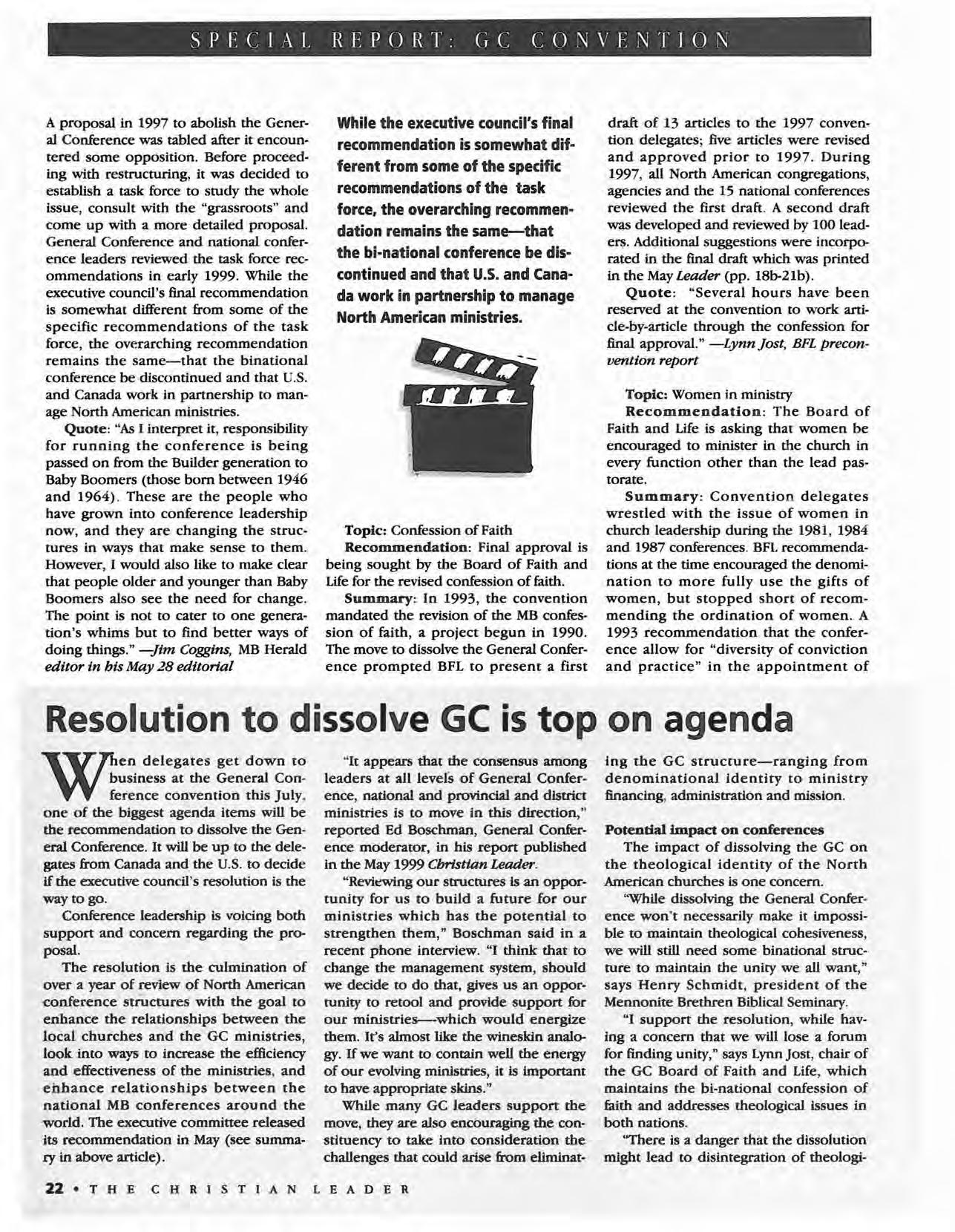
A proposal in 1997 to abolish the General Conference was tabled after it encountered some opposition. Before proceeding with restructuring, it was decided to establish a task force to study the whole issue, consult with the "grassroots" and come up with a more detailed proposal. General Conference and national conference leaders reviewed the task force recommendations in early 1999. While the executive council's final recommendation is somewhat different from some of the specific recommendations of the task force, the overarching recommendation remains the same-that the binational conference be discontinued and that U.S. and Canada work in partnership to manage North American ministries.
Quote: "As I interpret it, responsibility for running the conference is being passed on from the Builder generation to Baby Boomers (those born between 1946 and 1964). These are the people who have grown into conference leadership now, and they are changing the structures in ways that make sense to them. However, I would also like to make clear that people older and younger than Baby Boomers also see the need for change. The point is not to cater to one generation's whims but to find better ways of doing things." -Jim Coggins, MB Herald editor in his May 28 editorial
While the executive council's final recommendation is somewhat different from some of the specific recommendations of the task force, the overarching recommendation remains the same-that the bi-national conference be discontinued and that U.S. and Canada work in partnership to manage North American ministries.
draft of 13 articles to the 1997 convention delegates; five articles were revised and approved prior to 1997. During 1997, all North American congregations, agencies and the 15 national conferences reviewed the first draft. A second draft was developed and reviewed by 100 leaders. Additional suggestions were incorporated in the final draft which was printed in the May Leader (pp. 18h-21b).
Quote: "Several hours have been reserved at the convention to work article-by-article through the confession for final approval." -Lynn Jost, BFL preconvention report
Topic: Women in ministry
Recommendation: The Board of Faith and Life is asking that women be encouraged to minister in the church in every function other than the lead pastorate.
Topic: Confession of Faith
Recommendation: Final approval is being sought by the Board of Faith and Life for the revised confession of faith.
Summary: In 1993, the convention mandated the revision of the MB confession of faith, a project begun in 1990. The move to dissolve the General Conference prompted BFL to present a first
Summary: Convention delegates wrestled with the issue of women in church leadership dUring the 1981, 1984 and 1987 conferences. BFL recommendations at the time encouraged the denomination to more fully use the gifts of women, but stopped short of recommending the ordination of women. A 1993 recommendation that the conference allow for "diversity of conviction and practice" in the appointment of
Resolution to dissolve GC is top on agenda
w:en delegates get down to business at the General Conference convention this July, one of the biggest agenda items will be the recommendation to dissolve the General Conference. It will be up to the delegates frolil Canada and the U.S. to decide if the executive council's resolution is the way to go.
Conference leadership is voicing both support and concern regarding the proposal.
The resolution is the culmination of over a year of review of North American 'Conference structures with the goal to enhance the relationships between the local churches and the GC ministries, look into ways to increase the efficiency and effectiveness of the ministries, and ehhance relationships between the national MB conferences around the world. The executive committee released its recommendation in May (see summa· ry in above article).
"It appears that the consensus among leaders at all levers of General Conference, national and provincial and district ministries is to move in this direction," reported Ed Boschman, General Conference moderator, in his report published in the May 1999 Christian Leader.
"Reviewing our structures is an opportunity for us to build a future for our ministries which has the potential to strengthen them," Boschman said in a recent phone interview. "I think that to change the management system, should we decide to do that, gives us an opportunity to retool and provide support for our ministries---which would energize them. It's almost like the wineskin analogy. If we want to contain well the energy of our evolVing ministries, it is important to have appropriate skins."
While many GC leaders support the move, they are also encouraging the con· stituency to take into consideration the challenges that could arise from eliminat-
ing the GC structure-ranging from denominational identity to ministry financing, administration and mission.
Potential impact on conferences
The impact of dissolving the GC on the theological identity of the North American churches is one concern.
''While dissolving the General Conference won't necessarily make it impossible to maintain theological cohesiveness, we will still need some binational structure to maintain the unity we all want," says Henry Schmidt, president of the Mennonite Brethren Biblical Seminary.
"I support the resolution, while having a concern that we will lose a forum for finding unity," says Lynn Jost, chair of the GC Board of Faith and Life, which maintains the bi-national confession of fuith and addresses theological issues in both nations.
''There is a danger that the dissolution might lead to disintegration of theologi-
SPECIAL REPORT: GC CONVENTION
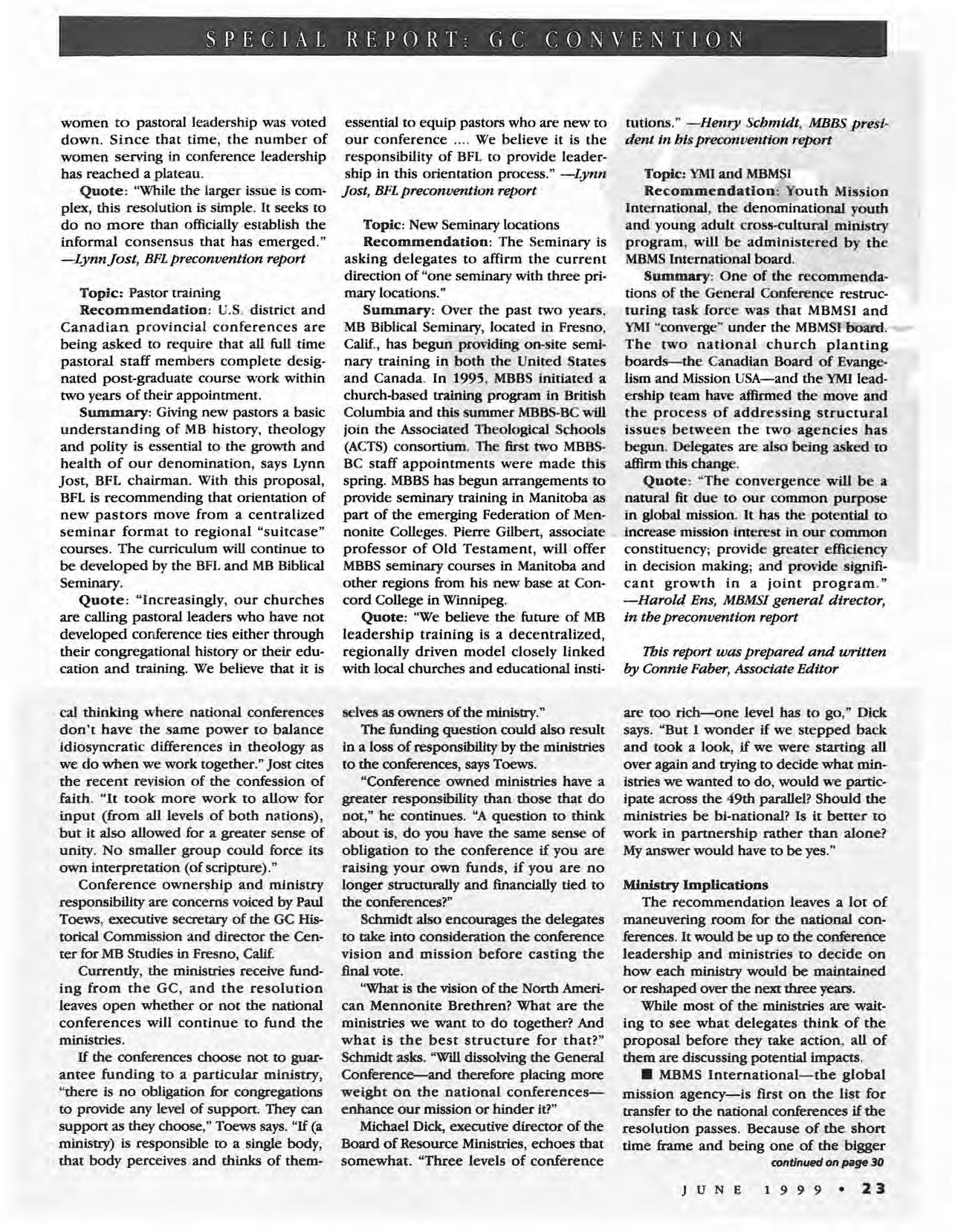
women to pastoral leadership was voted down. Since that time, the number of women serving in conference leadership has reached a plateau.
Quote: "While the larger issue is complex, this resolution is simple. It seeks to do no more than officially establish the informal consensus that has emerged."
-LynnJost, BFL preconvention report
Topic: Pastor training
Recommendation: U.S. district and Canadian provincial conferences are being asked to require that all full time pastoral staff members complete designated post-graduate course work within two years of their appointment.
Summary: Giving new pastors a basic understanding of MB history, theology and polity is essential to the growth and health of our denomination, says Lynn Jost, BFL chairman. With this proposal, BFL is recommending that orientation of new pastors move from a centralized seminar format to regional "suitcase" courses. The curriculum will continue to be developed by the BFL and MB Biblical Seminary.
Quote: "Increasingly, our churches are calling pastoral leaders who have not developed conference ties either through their congregational history or their education and training. We believe that it is
cal thinking where national conferences don't have the same power to balance idiosyncratic differences in theology as we do when we work together." Jost cites the recent revision of the confession of faith. "It took more work to allow for input (from all levels of both nations), but it also allowed for a greater sense of unity. No smaller group could force its own interpretation (of sCripture). "
Conference ownership and ministry responsibility are concerns voiced by Paul Toews, executive secretary of the GC Historical Commission and director the Center for MB Studies in Fresno, Calif.
Currently, the ministries receive funding from the GC, and the resolution leaves open whether or not the national conferences will continue to fund the ministries.
If the conferences choose not to guarantee funding to a particular ministry, "there is no obligation for congregations to provide any level of support. They can support as they choose," Toews says. "If (a ministry) is responsible to a single body, that body perceives and thinks of them-
essential to equip pastors who are new to our conference We believe it is the responsibility of BFL to provide leadership in this orientation process." -Lynn Jost, BFL preconvention report
Topic: New Seminary locations
Recommendation: The Seminary is asking delegates to affirm the current direction of "one seminary with three primary locations."
Summary: Over the past two years, MB Biblical Seminary, located in Fresno, Calif., has begun providing on-site seminary training in both the United States and Canada. In 1995, MBBS initiated a church-based training program in British Columbia and this summer MBBS·BC will join the Associated Theological Schools (ACTS) consortium. The first two MBB8BC staff appointments were made this spring. MBBS has begun arrangements to provide seminary training in Manitoba as part of the emerging Federation of Mennonite Colleges. Pierre Gilbert, associate professor of Old Testament, will offer MBBS seminary courses in Manitoba and other regions from his new base at Concord College in Winnipeg.
Quote: "We believe the future of MB leadership training is a decentralized, regionally driven model closely linked with local churches and educational insti-
selves as owners of the ministry."
The funding question could also result in a loss of responsibility by the ministries to the conferences, says Toews.
"Conference owned ministries have a greater responsibility than those that do not," he continues. "A question to think about is, do you have the same sense of obligation to the conference if you are raising your own funds, if you are no longer structutally and financially tied to the conferences?"
Schmidt also encourages the delegates to take into consideration the conference vision and mission before casting the flnaI vote.
"What is the vision of the North American Mennonite Brethren? What are the ministries we want to do together? And what is the best structure for that?" Schmidt asks. "Will dissolving the General Conference-and therefore placing more weight on the national conferencesenhance our mission or hinder it?"
Michael Dick, executive director of the Board of Resource Ministries, echoes that somewhat. "Three levels of conference
tutions." -Henry Schmidt, MBBS prest-
Topic: YMI and MBMSI
Recommendation: Youth Mission International, the denominational youth and young adult cross-cultural ministry program, will be administered by the MBMS International board.
Summary: One of the recommendations of the General Conference restructuring task force was that MBMSI and YMI "converge" under the MBMSI-tx>a:rrl. The two national church planting boards-the Canadian Board of Evangelism and Mission USA-and the YMI leadership team have affirmed the move and the process of addressing structural issues between the two agencies has begun. Delegates are also being asked to affirm this change.
Quote: "The convergence will be a natural fit due to our common purpose in global mission. It has the potential to increase mission Interest in our common constituency; provide greater efficiency in decision making; and provide significant growth in a joint program." -Harold. Ens, MBMSI general director, in the preconvention report
This report was prepared and written by Connie Faber, Associate Editor
are too rich-one level has to go," Dick says. "But I wonder if we stepped back and took a look, if we were starting all over again and trying to decide what ministries we wanted to do, would we participate across the 49th parallel? Should the ministries be bi-national? Is it better to work in partnership rather than alone? My answer would have to be yes."
Ministry ImpHcations
The recommendation leaves a lot of maneuvering room for the natlonal conferences. It would be up to the conference leadership and ministries to decide on how each ministry would be mai,ntained or reshaped over the next three years.
While mOst of the ministries are waiting to see what delegates think of the proposal before they take action, all of them are discussing potential impacts.
• MBMS International-the global mission agency-is first on the list for transfer to the national conferences if the resolution passes. Because of the shott time frame and being one of the bigger continued on page 30
Members of the Iglesia EI Buen MB in Orange Cove, Calif., assemble boxes of food to be distributed to families who are struggling finandally after the December 1998 citrus fruit freeze left them jobless.
Two California MB churches walk the talk
• West Park and Raisin City reach out to community hit by California's December severe freeze with food and funds
The congregation at West Park Hispanic MB Church listens to Jose Elizondo, associate district minister of the Pacific District Conference, speak powerfully and sincerely of God's love and gift of salvation. He speaks passionately of the hope that Christ offers to a hopeless world. "Will you give your life to Christ and receive
His gift of love?" he asks in Spanish. Twelve people make their way down the aisle to the front of the small rural church to receive Christ as their Savior.
The week before, 45 people received Christ at West Park. Four months ago, only 20 people attended this church, now it is growing weekly with conversions practically each week. Not very far
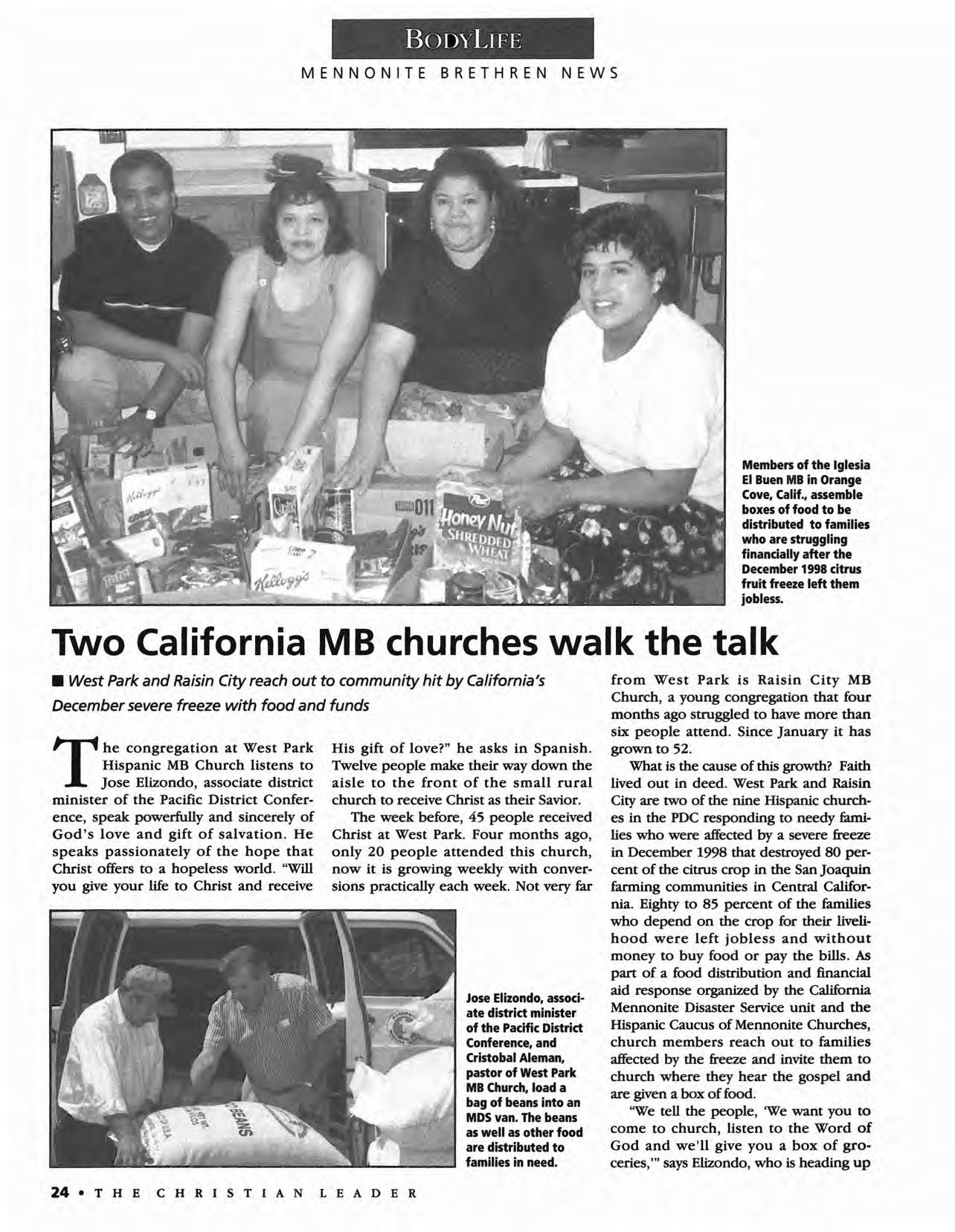
Jose Elizondo, associate district minister of the Pacific District Conference, and Cristobal Aleman, pastor of West Park MB Church, load a bag of beans into an MDS van. The beans as well as other food are distribu1ed to families in need.
from West Park is Raisin City MB Church, a young congregation that four months ago struggled to have more than six people attend. Since January it has grown to 52.
What is the cause of this growth? Faith lived out in deed. West Park and Raisin City are two of the nine Hispanic churches in the PDC responding to needy families who were affected by a severe freeze in December 1998 that destroyed 80 percent of the citrus crop in the San Joaquin farming communities in Central California. Eighty to 85 percent of the families who depend on the crop for their livelihood were left jobless and without money to buy food or pay the bills. As part of a food distribution and financial aid response organized by the California Mennonite Disaster Service unit and the Hispanic Caucus of Mennonite Churches, church members reach out to families affected by the freeze and invite them to church where they hear the gospel and are given a box of food.
"We tell the people, 'We want you to come to church, listen to the Word of God and we'll give you a box of groceries, '" says Elizondo, who is heading up
the response. "Many of these people have no biblical knowledge. They need to hear the basics of the Word of God and this is a perfect opportunity. In James 2 it says 'What good is it, my brothers, if a man claims to have faith but has no deeds? As the body without the spirit is dead, so faith without deeds is dead.' We're giving these people physical nourishment, but more importantly, we're giving them spiritual nourishment. We could just hand out the groceries, but that would only bring them temporary relief. Giving them Christ brings eternal relief."
With contributions received from local churches as well as the MDS binational office, food is purchased in bulk from the Fresno Community Food Bank. Normally used to transport tools and able bodies to work sites, each Friday an MDS van is filled with cereal, canned goods, potatoes, onions and other food and taken to a warehouse where it is distributed among the nine churches. Since February the churches have handed out
boxes of groceries to 2,600 families.
"The churches have really benefitted from thiS response," says Elizondo. "They have come together to assist their brothers and sisters in need and as a result, welcomed many people into the family of believers. There will probably be some drop off (of people attending) after the response ends, but some will stay and even if only one family stays, it is a gain. Seeds are being planted."
There are sufficient funds to continue providing food to families in need through June; however, more money is needed to assist with rent and utility payments. Contributions designated for the citrus fruit freeze relief can be sent to Wayne Zimmerman, MDS Calif. Unit treasurer, 8539 S. Columbia Ave, Reedley, CA 93654.
MDS is a network through which various constituencies of the Anabaptist churches can respond to areas affected by disasters in North America. -by Marisa Doncevic, MDS administrative assistant
MDS volunteers rebuild after tornadoes
• May tornadoes kill 45 in Kansas and Oklahoma
Late last month, Mennonite Disaster Service volunteers began rebuilding homes lost when violent tornadoes tore through Oklahoma and Kansas May 3 killing 45 people, injuring more than 850 and destroying countless homes and businesses. Early estimates of property damage nudged close to $1 billion.
In Oklahoma, 41 people were killed, 750 were injured and an estimated 3,000 homes and business v.:fere (lestroyed. The most destructive of the four dozen tornadoes to hit the state was an F-S, the highest rating on the 'Fujuita scale of tornado damage. Such a storm destroys neatly everything in its path. The May 3 twister stayed on 4te ground about four hours, and the tornado was reporteEl to be a half-mile wide with winds that topped 260 mph. Hardest hit in Oklahoma was the Oklahoma City area, to three Mennonite congregations.
"Our first thoughts as all thiS started happening went tOwards our church fumily that lived on the south side of the city-wondering if they were safe," says Mennonite Bretlu:en pastor Paul Klassen.
I'My second response was wondering what I could do and yet; on the other hand having a sense of helplessness
It caused me to reflect on what happened here four ago with the 'bombing (of the Murrah BuUding)," says ;K:blssen, "There are some of the same feelings, such as see-
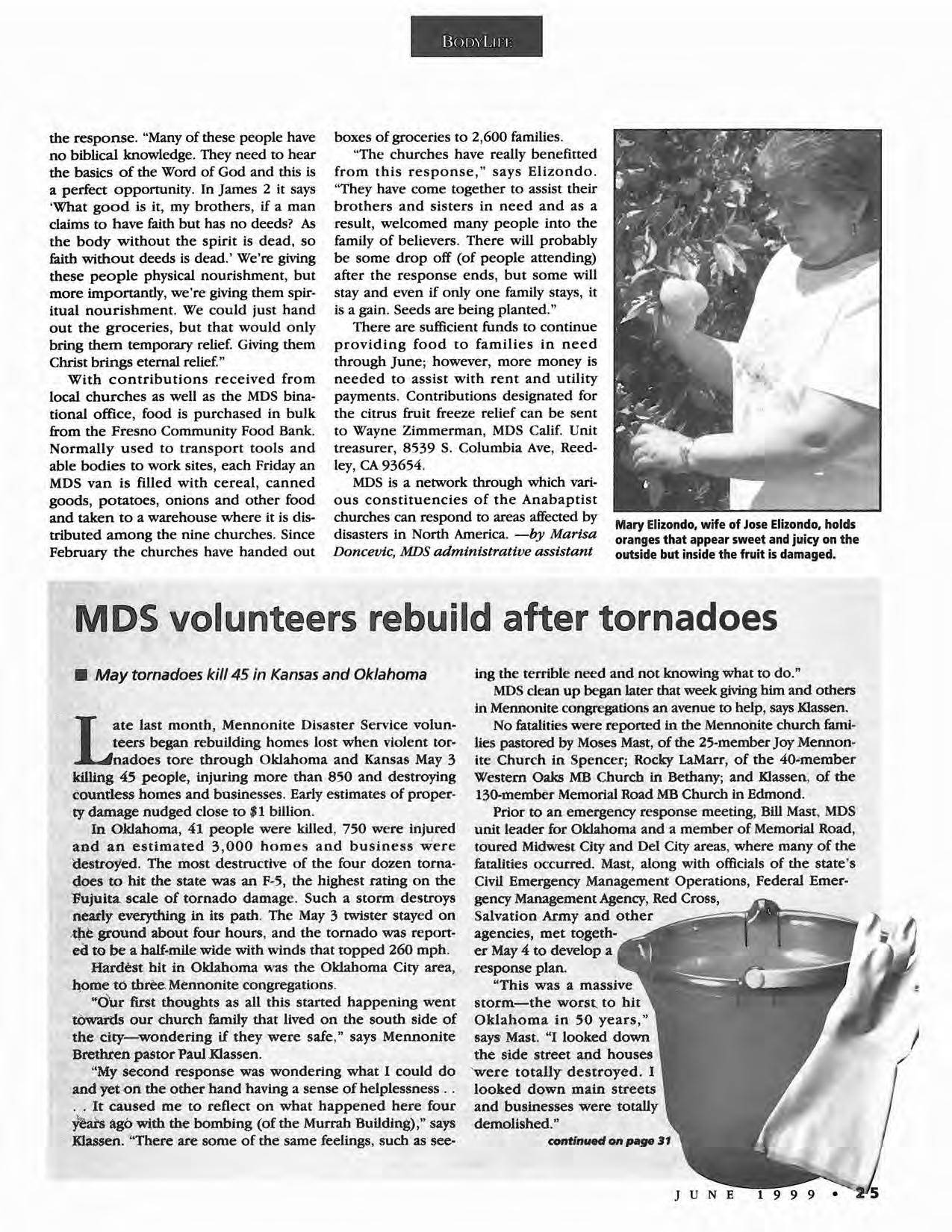
ing the terrible need and not knOWing what to do."
MDS clean up began later that week giving him and others in Mennonite congregations an avenue to help, says I<lassen.
No finalities were reported in the Mennohite church &milies pastored by Moses Mast, of the 25-member Joy Mennonite Church in Spencer; Rocky LaMarr, of the 40-member Western Oaks MB Church in Bethany; and Klassen, of the 13o-member Memorial Road MB Church in Edmond.
Prior to an emergency response meeting, Bill Mast, MDS unit leader for Oklahoma and a member of Memorial Road, toured Midwest City and Del City areas, where many of the fatalities occurred. Mast, along with officials of the state's CivU Emergency Management Operations, Federal Emergency Management Agency, Red Cross, Salvation Army and other agencies, met tQgether May 4 to develop a response plan.
"This was a massive storm-the worst to hit Oklahoma in 50 years," saYS' Mast. "I looked down the side stteet and houses were totaUy destroyed. I looked down main streets and businesses were totally demolished. " continued on".., 31
Mary Elizondo. wife of Jose Elizondo, holds oranges that appear sweet and juicy on the outside but inside the fruit is damaged.
MB church bands together with others in wake of Columbine shootings
• Denver area MB and Mennonite congregations reach out to the community affected by school killings
The last time substitute teacher Rich Kauffman taught at Columbine High School in Littleton, Colo., was April 16, four days before 12 students and a fellow teacher died in a shooting spree by two teenagers who then killed themselves.
The fact that he didn't substitute April 20, the day of the shooting, didn't soften the blow of news reports he watched from home, says Kauffman, a member of Belleview Acres MB Church in Littleton. He retired from Columbine in 1997 after 24 years of teaching chemistry and physics.
He watched as 1V reports told Denver metro residents that many of the 1,800 students at the Jefferson County high school hid in closets and under desks from two killers dressed in black trench coats using guns and bombs.
"I couldn't imagine what students were going through while seeing their friends right beside them being shot," said Kauffman in an April 21 telephone interview. "I tried to imagine what this will do to them in their lives. It will be with them for the rest oftheir lives."
Faith has helped the stunned and
Students mourn during the Sunday, April 25, memorial service for the teacher and Columbine students killed April 20.
grieving community to cope as people turn to God and each other, Kauffman said later that week.
"Church services have been continuing here every day and churches seem to be the primary place where the students want to hang out," Kauffman said.
"The Columbine students who belong to those churches are now bringing their friends While faith was strong in the
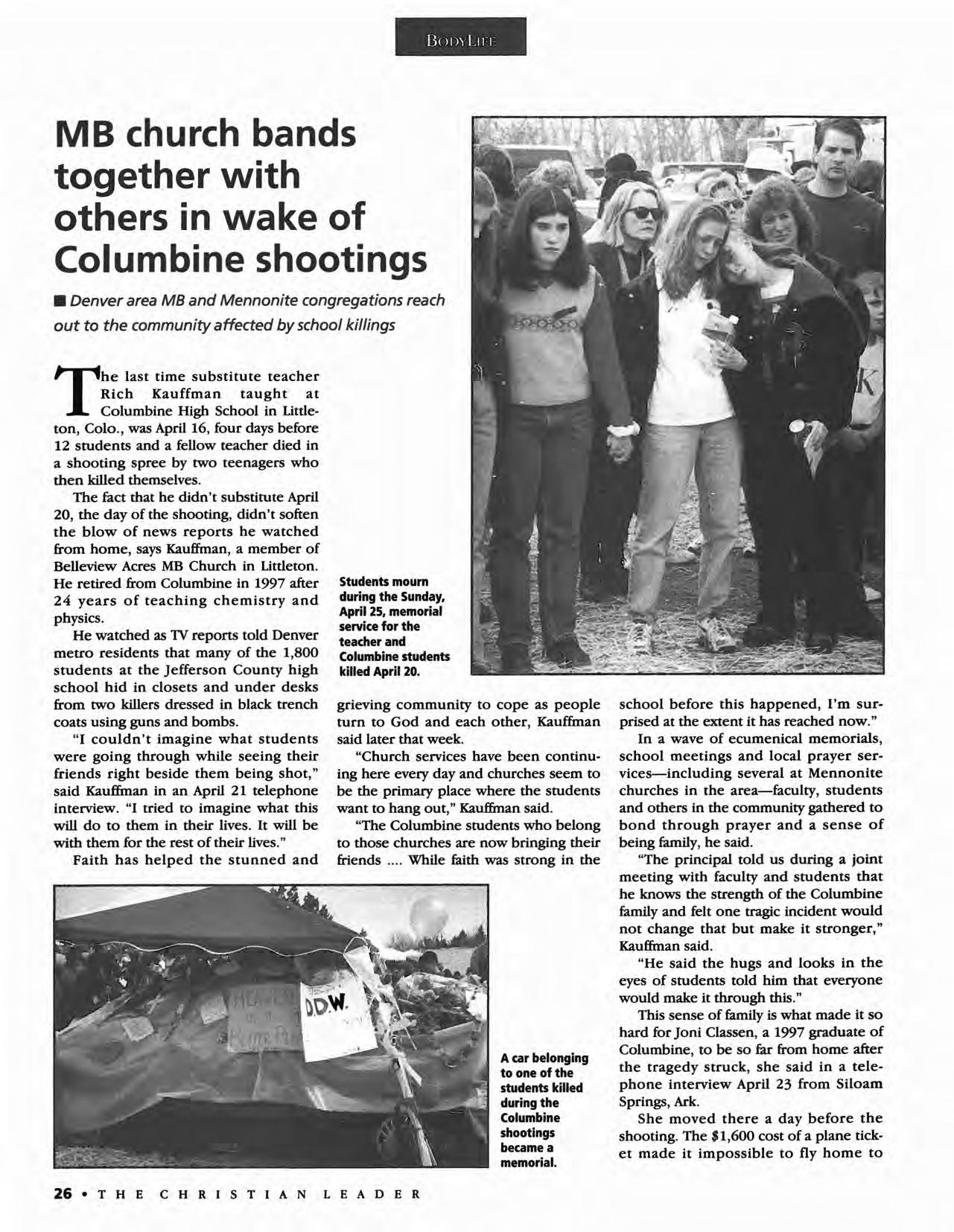
A car belonging to one of the students killed during the Columbine shootings became a memorial.
school before this happened, I'm surprised at the extent it has reached now."
In a wave of ecumenical memorials, school meetings and local prayer services-including several at Mennonite churches in the area-faculty, students and others in the community gathered to bond through prayer and a sense of being family, he said.
"The principal told us during a joint meeting with faculty and students that he knows the strength of the Columbine family and felt one tragic incident would not change that but make it stronger," Kauffman said.
"He said the hugs and looks in the eyes of students told him that everyone would make it through this."
This sense of family is what made it so hard for Joni Classen, a 1997 graduate of Columbine, to be so far from home after the tragedy struck, she said in a telephone interview April 23 from Siloam Springs, Ark.
She moved there a day before the shooting. The $1,600 cost of a plane ticket made it impossible to fly home to
exchange hugs, tears and comfort with her parents, Vern and Janet Classen of Littleton, and her friends and their siblings at Columbine. The Classens have attended Belleview Acres in the past.
"I asked my mom to please put some flowers with a note, but it's just not the same as being there," Classen said. "I saw some of my friends on TV and just wished that I could go up to them and hug them and ask if they are all right."
Classen was especially close to slain teacher William Sanders, her track coach as a senior when she went to state finals in shot put. She's sorry she wasn't able to go home to pay him proper tribute.
"The teachers (at Columbine) treat students like their family and that's what it was like with Coach Sanders," she said. "Because he's gone, many students have lost a best friend."
Churches, pastors, youth workers, teachers and counselors have banded together to help heal the deep sense of loss.
Annette Miller, a former English teacher at Columbine and now a fifthgrade teacher at Bear Creek Elementary School close to that high school, was part of a Jefferson County-wide, fourhour lock-in with her class of 30 students the day of the shooting.
Her main mission is to be with her kids and to help normalize things for them, said Miller, a member of Belleview Acres.
"I need to just love them as they are," Miller said. "Some are angry; some are sad. Some families say their kids are too afraid to come to school."
Congregations also reached out. Belleview Acres held a special prayer ser-
vice as did First Mennonite Church of Denver and Peace Mennonite Community Church in Aurora. Glennon Heights Mennonite Church in Lakewood held an informal dialogue session for their youth.
At an April 21 meeting, Mennonite pastors discussed the need for broad and lengthy ministry. The tragedy affected a large community that will grieve for a long time, said Vern Rempel, pastor of First Mennonite Church.
"It's almost true for everyone here that they have personal connections (to Columbine)," he said. "The personal connections radiate out and run into our daily lives. We need to address that feeling of instability and shattering." -by Mennonite Weekly Review assistant editor Laurie Oswald
VORP program reduces school conflict
Ten years ago, eighth grade teacher Roxanne Claassen began looking for a way to combine her commitment to restorative with the need to deal with conflict and misbehavior in her Raisin City, Calif., classroom. Together with her husband, Ron who is the founder and ditector of Fresno County (Calif.) VORP, Roxanne developed an approach to classroom discipline that the Claassens call "Discipline That !\estores."
Roxanne begins each year asking her students to write what they would do if they were shOWing respect for each other, for the teacher, for the books and furniture and what the teacher would do if the teacher were shOWing respect to the students. Claassen then works together with the students to develop a classroom agreement for how they will be together.
When students forget to abide by their agreement, Claassen talks with them and meets with the student indiVidually if the problem persists. She emphasizes the importance of working 'together to solve problems and reports that some students actually ask if she would just punish them. Then they wouldn't have to keep making these agreements that they are expect-
ed to keep.
"At first those who watched her thought she was 'soft' on misbehavior," wrote Ron recently in the Fresno VORP newsletter. "But, as the principal and other teachers noticed, her approach not only reduced the misbe. havior, it began to transform the cli-
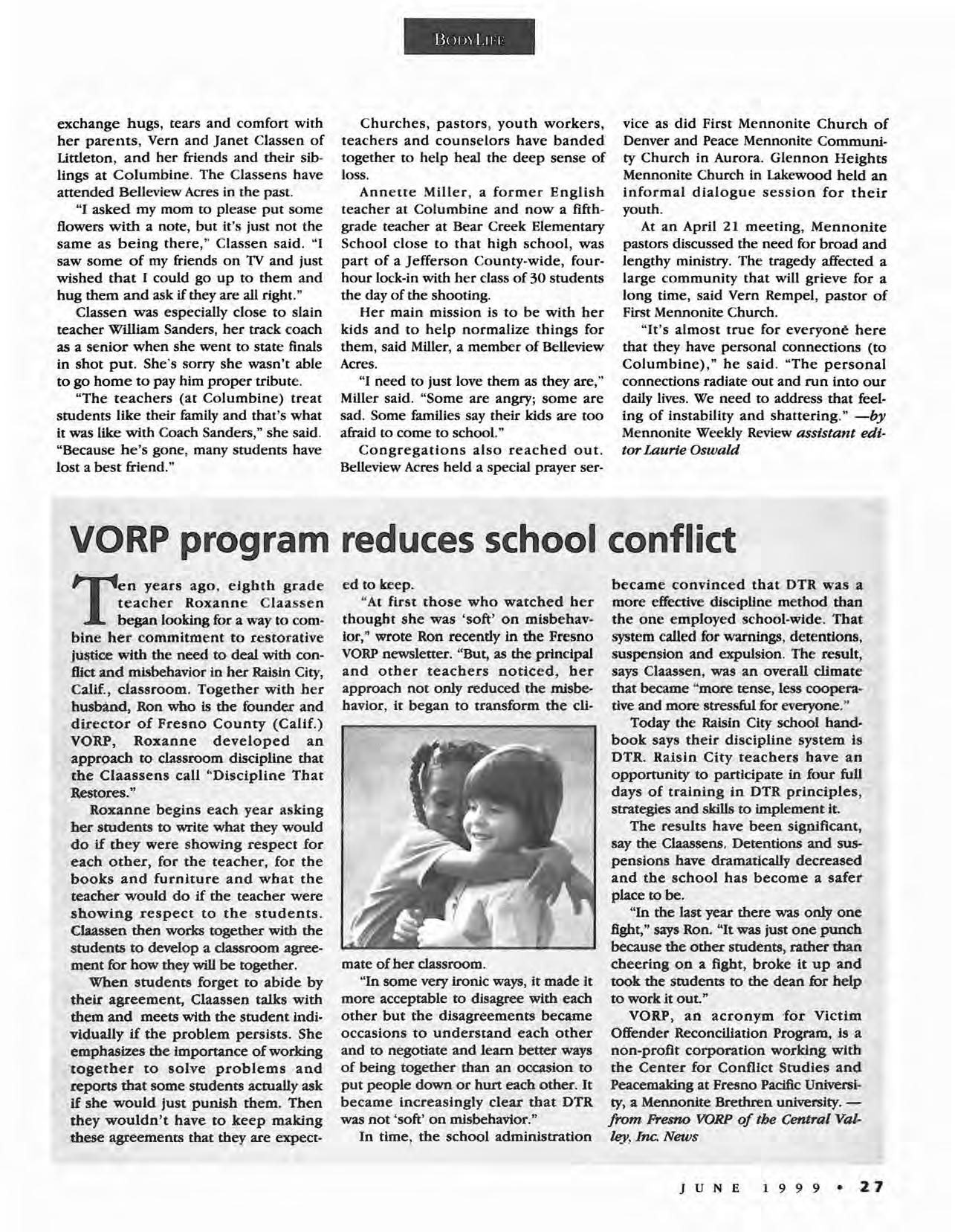
mate of her classroom.
"In some very ironic ways, it made it more acceptable to disagree with each other but the disagreements became occasions to understand each other and to negotiate and learn better ways of being together than an occasion to put people down or hurt each other. It became increasingly clear that DTR was not 'soft' on misbehavior."
In time, the school administration
became convinced that DTR was a more effective discipline method than the one employed school-Wide. That system called for warnings, detentions, suspension and expulsion. The result, says Claassen, was an overall climate that became "more tense, less cooperative and more stressful for everyone."
Today the Raisin City school handbook says their discipline system is DTR. Raisin City teachers have an opportunity to participate in four full days of training in DTR principles, strategies and skills to implement it.
The results have been significant, say the CIaassens. Detentions and suspensions have dramatically decreased and the school has become a safer place to be.
"In the last year there was only one fight," says Ron. "It was just one punch because the other students, rathet than cheering o.n a fight, broke it up and took the students to the dean for help to work it out."
VORP, an acronym for Victim Offender Reconciliation Program, is a non-profit corporation working with the Center for Conflict Studies and Peacemaking at Fresno Pacific University, a Mennonite Brethren university.from Fresno VORP of the Central Valley, Inc. News
Tent cities have sprung up in Albania as thousands of Kosovar refugees flood across the border. less visible are the thousands of refugees who have been welcomed into the homes of Albanian families, who are themselves poor. Some two room apartments are now shared by 20 to 30 people. MCC will concentrate its aid on helping these Kosovar refugees and their Albanian hosts. large aid organizations, such as the United Nations, are running refugee camps.
MCC workers hear tales of atrocity in Kosovo
• "This is a time to be moved by the things that move the heart of God, " says MCC worker Dan Hess
Dan and Evanna Hess of Lancaster, Pa., are getting a close-up look at the jagged emotional wounds of the Kosovo refugees. The Hesses are relief workers with Mennonite Central Committee, a world relief
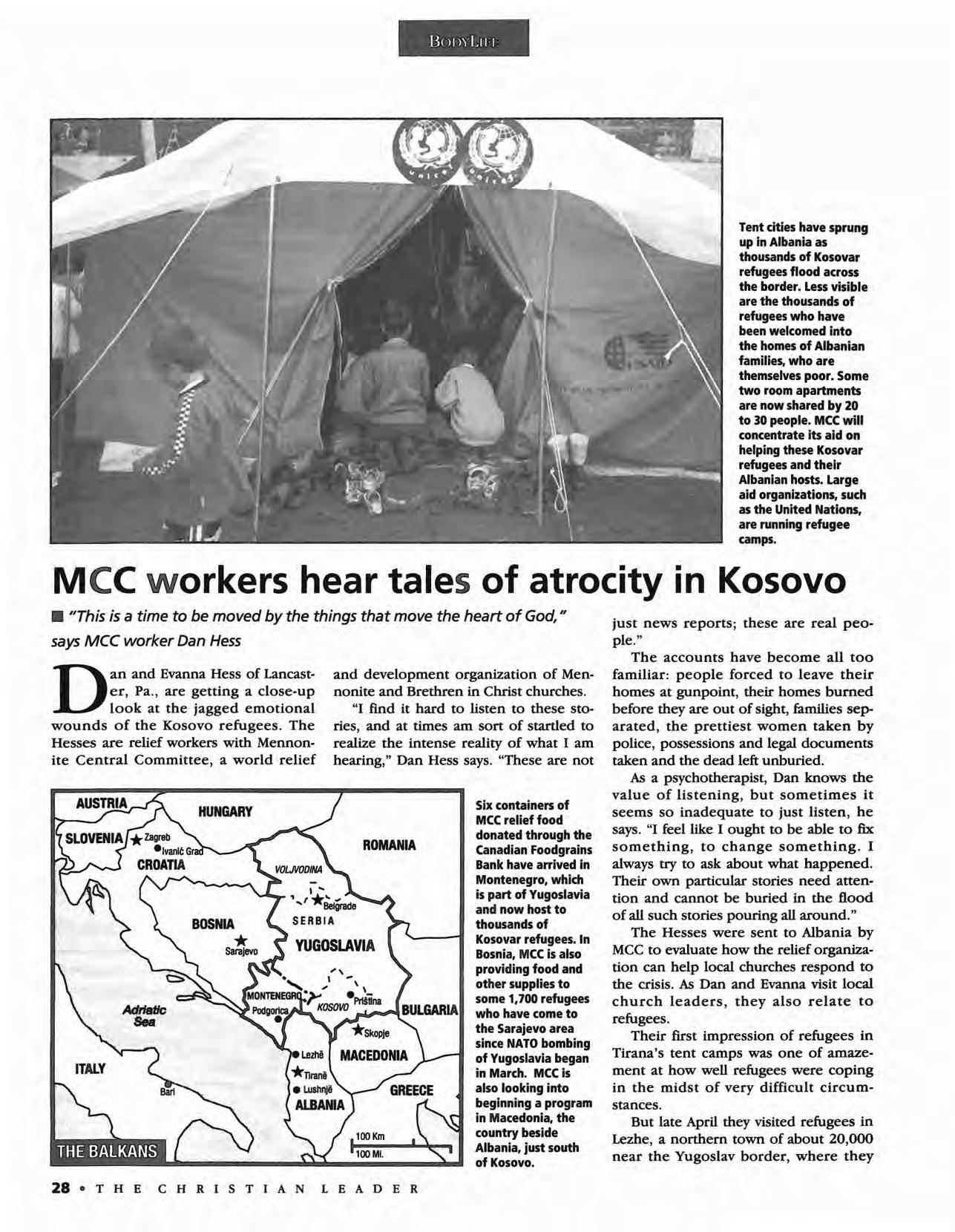
and development organization of Mennonite and Brethren in Christ churches.
"I find it hard to listen to these stories, and at times am sort of startled to realize the intense reality of what 1 am hearing," Dan Hess says. "These are not
Six containers of MCC relief food donated through the Canadian Foodgrains Bank have arrived in Montenegro, which is part of Yugoslavia and now host to thousands of Kosovar refugees. In Bosnia, MCC is also providing food and other supplies to some 1,700 refugees who have come to the Sarajevo area since NATO bombing of Yugoslavia began in March. MCC is also looking into beginning a program in Macedonia, the country beside Albania, just south of Kosovo.
just news reports; these are real people."
The accounts have become all too familiar: people forced to leave their homes at gunpoint, their homes burned before they are out of sight, families separated, the prettiest women taken by police, possessions and legal documents taken and the dead left unburied.
As a psychotherapist, Dan knows the value of listening, but sometimes it seems so inadequate to just listen, he says. "I feel like 1 ought to be able to fix something, to change something. 1 always try to ask about what happened. Their own particular stories need attention and cannot be buried in the flood of all such stories pouring all around."
The Hesses were sent to Albania by MCC to evaluate how the relief organization can help local churches respond to the crisis. As Dan and Evanna visit local church leaders, they also relate to refugees.
Their first impression of refugees in Tirana's tent camps was one of amazement at how well refugees were coping in the midst of very difficult circumstances.
But late April they visited refugees in Lezhe, a northern town of about 20,000 near the Yugoslav border, where they
HUNGARY
ROMANIA
learned in more personal detail the pain refugees are coping with. About 9,700 refugees are reportedly living in the city.
A Mennonite pastor, Paul Krops, took the Hesses, arms full of MCC canned meat, to three families who just moved into an unfinished building. The relief workers were welcomed by about 24 people, ranging from 1 year old to 70 years old.
They listened, through a translator, as one woman, tearfully and dramatically, told her version of the familiar story.
While they listened, Evanna watched tears glisten in the eyes of one young man as he studied a picture of his classmates. Earlier he said he didn't know where any of them were anymore. After a while, he flung the picture aside.
The children ran around without anything to do. The older women looked worried and sad, almost hopeless, Evanna says.
Knowing what to say was difficult, Evanna says, but it seemed to be really important to them just to have someone listen. The women hugged her for a long time before they left. "God bless you,"
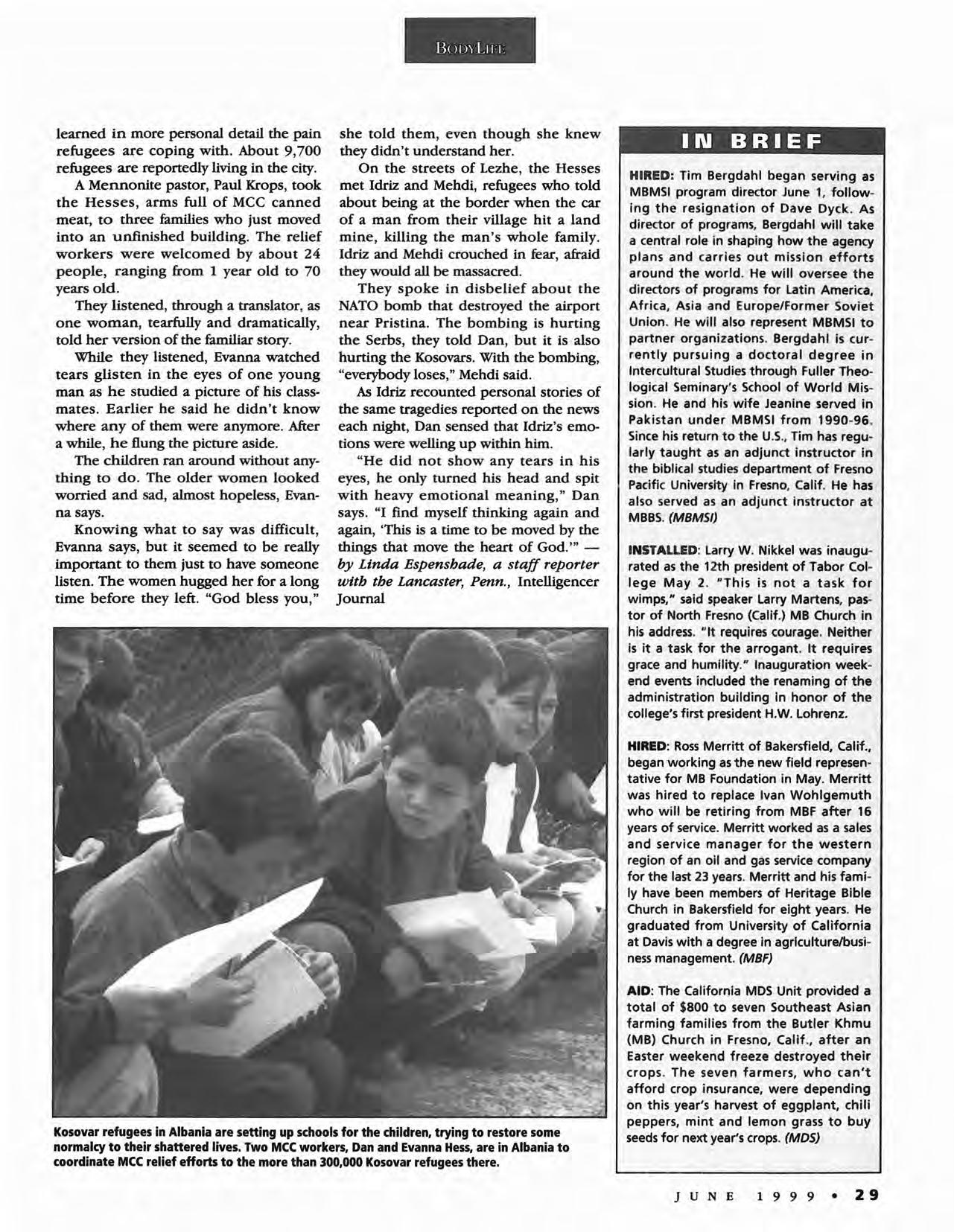
she told them, even though she knew they didn't understand her.
On the streets of Lezhe, the Hesses met Idriz and Mehdi, refugees who told about being at the border when the car of a man from their village hit a land mine, killing the man's whole family. Idriz and Mehdi crouched in fear, afraid they would all be massacred.
They spoke in disbelief about the NATO bomb that destroyed the airport near Pristina. The bombing is hurting the Serbs, they told Dan, but it is also hurting the Kosovars. With the bombing, "everybody loses," Mehdi said.
As Idriz recounted personal stories of the same tragedies reported on the news each night, Dan sensed that Idriz's emotions were welling up within him.
"He did not show any tears in his eyes, he only turned his head and spit with heavy emotional meaning," Dan says. "I find myself thinking again and again, 'This is a time to be moved by the things that move the heart of God. '"by Linda Espenshade, a staff reporter with the Lancaster, Penn., Intelligencer Journal
IN BRIEF
HIRED: Tim Bergdahl began serving as MBMSI program director June 1, following the resignation of Dave Dyck. As director of programs, Bergdahl will take a central role in shaping how the agency plans and carries out mission efforts around the world. He will oversee the directors of programs for Latin America, Africa, Asia and Europe/Former Soviet Union. He will also represent MBMSI to partner organizations. Bergdahl is currently pursuing a doctoral degree in Intercultural Studies through Fuller Theological Seminary's School of World Mission. He and his wife Jeanine served in Pakistan under MBMSI from 1990-96. Since his return to the U.S., Tim has regularly taught as an adjunct instructor in the biblical studies department of Fresno Pacific University in Fresno, Calif. He has also served as an adjunct instructor at MBBS. (MBMSI)
INSTALLED: Larry W. Nikkel was inaugurated as the 12th president of Tabor College May 2. "This is not a task for wimps, H said speaker Larry Martens, pastor of North Fresno (Calif.) MB Church in his address. "It requires courage. Neither is it a task for the arrogant. It requires grace and humility." Inauguration weekend events included the renaming of the administration building in honor of the college's first president H.W. Lohrenz.
HIRED: Ross Merritt of Bakersfield, Calif., began working as the new field representative for MB Foundation in May. Merritt was hired to replace Ivan Wohlgemuth who will be retiring from MBF after 16 years of service. Merritt worked as a sales and service manager for the western region of an 011 and gas service company for the last 23 years. Merritt and his family have been members of Heritage Bible Church in Bakersfield for eight years. He graduated from University of California at Davis with a degree in agriculturelbusiness management. (MBF)
AID: The California MDS Unit prOVided a total of $800 to seven Southeast Asian farming families from the Butler Khmu (MB) Church in Fresno, Calif., after an Easter weekend freeze destroyed their crops. The seven farmers, who can't afford crop insurance, were depending on this year's harvest of eggplant, chili peppers, mint and lemon grass to buy seeds for next year's crops. (MDS)
Kosovar refugees in Albania are setting up schools for the children, trying to restore some normalcy to their shattered lives. Two MCC workers, Dan and Evanna Hess, are in Albania to coordinate MCC relief efforts to the more than 300,000 Kosovar refugees there.
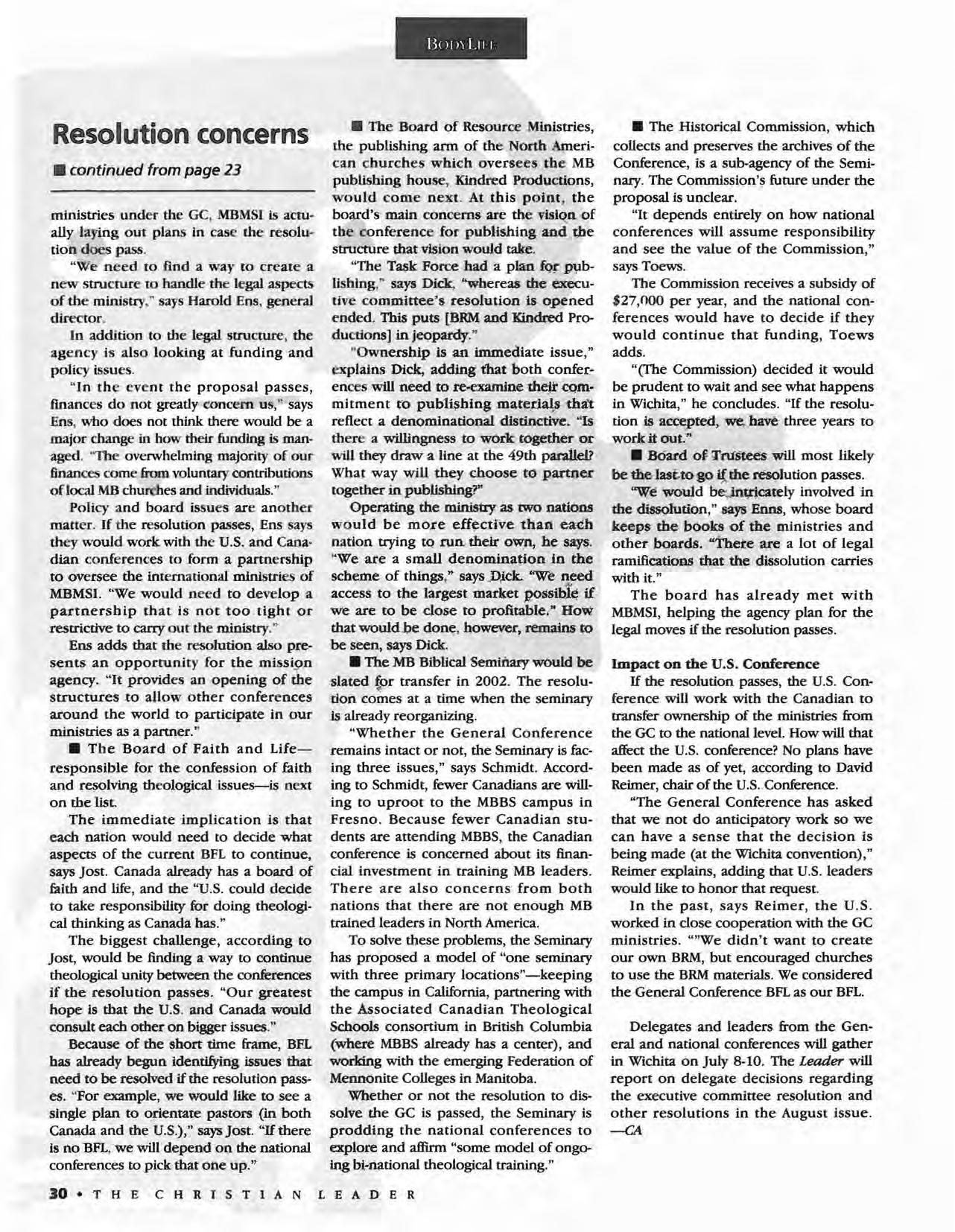
Resolution concerns
• continued from page 23
ministries under the GC, MBMSI is actually laying out plans in case the resolution pass.
"We need to find a way to create a new structure to handle the legal aspects of the ministry," says Harold Ens, general director.
In addition to the legal structure, the agency is also looking at funding and policy issues.
"In the event the proposal passes, fmances do not greatly COncern us," says Ens, who does not think there would be a major change in how their funding is man· aged. "lbe overwhelming majority of our finances come .from voluntary contributions of local MB churches and individuals."
Policy and board issues are another matter. If the resolution passes, Ens says they would work with the U.S. and Canadian conferences to form a partnership to oversee the international ministries of MBMSI. "We would need to develop a partnership that is not too tight or restrictive to carry out the ministry."
Ens adds that the resolution also presents an opportunity for the missi9n agency. "It provides an opening of the structu.res to allow other conferences around the world to participate in our ministries as a partner."
• The Board of Faith and Liferesponsible for the confession of faith and resolving theological issues-is next on the list.
The immediate implication is that each nation would need to decide what aspects of the current BFL to continue, says Jost. Canada already has a board of faith and life, and the "U.S. could decide to take responsibility for doing theological thinking as Canada has."
The biggest challenge, according to Jost, would be finding a way to continue theological unity between the conferences if the resolution passes. "Our greatest hope is that the U.S. and Canada would consult each other on bigger issues."
Because of the short time frame, BFL has already begun identifying issues that need to he resolved if the resolution passes. "For example, we would like to see a single plan to orientate pastors (in both Canada and the U.S.)," says Jost. "If there is no BFL, we will depend on the national conferences to pick that one up."
• The Board of Resource Ministries, the publishing arm of the North American churches which oversees the MB publishing house, Kindred Productions, would come next. At this point, the bo d's main concerns are the of tbe conference for publishing and the structUre that vision would take.
"The Tatlk Force had a plan fQr Wblishing," says Dick, ''whereas the tive committee's resolution is opened ended. This puts [BRM and Kindred Productions) in jeopardy. "
"Ownership is an immediate issue," explains Dick, adding tbat both conferences will need to re-examine thcji' cqmmitment to pub1illhing matej'ial, reflect a denominational distinctive. "Is there a willingness to work together or will they draw a line at the 49th parallel? What way will they choose t(j together in publishingr'
Operating the ministry as two nations would be mote t'hut each nation trying to 1110.. their ow,n, he uys. "We are a small denomination in the scheme of things," says J),ick. "We need access to the largest market J;?ossib!c;; if we are to be close to profitable," How that would-be done, however, remains to be seen, says Dick.
• The MB Biblical seminary would be slated (or transfer in 2002. The resolution comes at a time when the seminary is already reorganizing.
"Whether the General Conference remains intact or not, the Seminary is facing three issues," says Schmidt. According to Schmidt, fewer Canadians are willing to uproot to the MBBS campus in Fresno. Because fewer Canadian students are attending MBBS, the Canadian conference is concerned about its financial investment in training MB leaders. There are also concerns from both nations that there are not enough MB trained leaders in North America.
To solve these problems, the Seminary has proposed a model of "one seminary with three primary locations"-keeping the campus in California, pannering with the Associated Canadian Theological Schools consortium in British Columbia (where MBBS already has a center), and working with the emerging Federation of Mennonite Colleges in Manitoba.
Whether or not the resolution to dissolve the GC is passed, the Seminary is prodding the national conferences to explore and affirm "some model of ongoing bi-national theological training."
• The Historical Commission, which collects and preserves the archives of the Conference, is a sub-agency of the Seminary. The Commission's future under the proposal is unclear.
"It depends entirely on how national conferences will assume responsibility and see the value of the Commission," says Toews.
The Commission receives a subsidy of $27,000 per year, and the national conferences would have to decide if they would continue that funding, Toews adds.
"(The Commission) decided it would be prudent to wait and see what happens in Wichita," he concludes. "If the resolution 1$ accepted, we, have three years to workitout....
• BOard of ll'custees will most likely be the last-to go i( the resolution passes.
'''\Ve would be:.Jnt,tjcately involved in the dfss91ution," sa)'lJ Enos, whose board kecp$ the bOoks of the ministries and other boards. "there are a lot of legal ramifications that the 4issolution carries with it."
The board has already met with MBMSI, helping the agency plan for the legal moves if the resolution passes.
Impact on the u.s. Conference
If the resolution passes, the U.S. Conference will work with the Canadian to transfer ownership of the ministries from the GC to the national level. How will that affect the U.S. conference? No plans have been made as of yet, according to David Reimer, chair of the U.S. Conference.
"The General Conference has asked that we not do anticipatory work so we can have a sense that the decision is being made (at the Wichita convention)," Reimer explains, adding that U.S. leaders would like to honor that request.
In the past, says Reimer, the U.S. worked in close cooperation with the GC ministries We didn't want to create our own BRM, but encouraged churches to use the BRM materials. We considered the General Conference BFL as our BFL.
Delegates and leaders from the General and national conferences will gather in Wichita on July 8-10. The Leader will report on delegate decisions regarding the executive committee resolution and other resolutions in the August issue. -CA
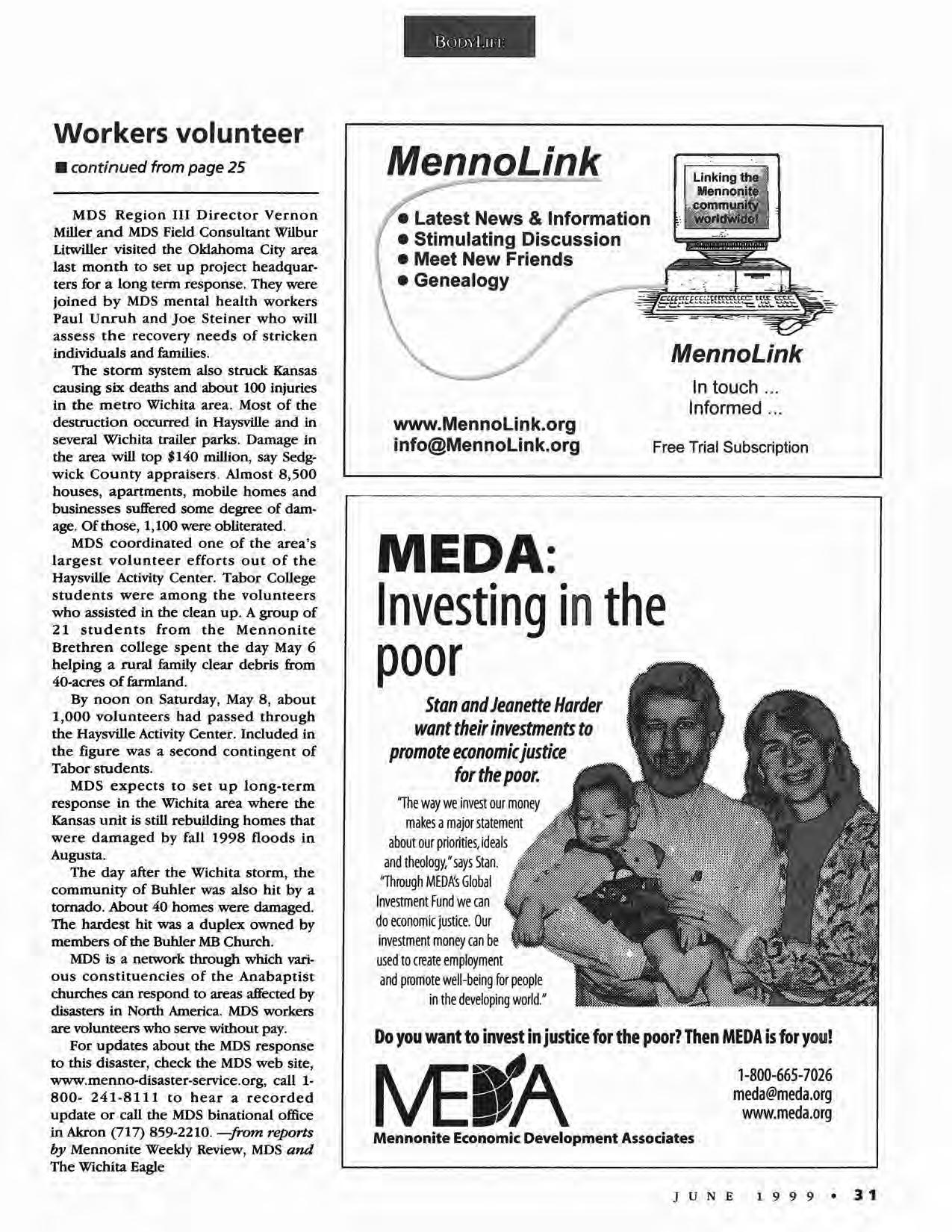
Workers volunteer
• continued from page 25
MDS Region III Director Vernon Miller and MDS Field Consultant Wilbur Litwiller visited the Oklahoma City area last month to set up project headquarters for a long term response. They were joined by MDS mental health workers Paul Unruh and Joe Steiner who will assess the recovery needs of stricken individuals and families.
The storm system also struck Kansas causing six deaths and about 100 injuries in the metro Wichita area. Most of the destruction occurred in Haysville and in several Wichita trailer parks. Damage in the area will top $140 million, say Sedgwick County appraisers. Almost 8,500 houses, apartments, mobile homes and businesses suffered some degree of damage. Of those, 1,100 were obliterated.
MDS coordinated one of the area's largest volunteer efforts out of the Haysville Activity Center. Tabor College students were among the volunteers who assisted in the clean up. A group of 21 students from the Mennonite Brethren college spent the day May 6 helping a rural family clear debris from 40-acres of farmland.
By noon on Saturday, May 8, about 1,000 volunteers had passed through the Haysville Activity Center. Included in the figure was a second contingent of Tabor students.
MDS expects to set up long-term response in the Wichita area where the Kansas unit is still rebuilding homes that were damaged by fall 1998 floods in Augusta.
The day after the Wichita storm, the community of Buhler was also hit by a tomado. About 40 homes were damaged. The hardest hit was a duplex owned by members of the Buhler MB Church.
MDS is a network through which various constituencies of the Anabaptist churches can respond to areas affected by disasters in North America. MDS workers are volunteers who serve without pay.
For updates about the MDS response to this disaster, check the MDS web Site, www.menno-disaster-service.org, call 1800- 241-8111 to hear a recorded update or call the MDS binational office in Akron (717) 859-2210. -from reports by Mennonite Weekly Review, MDS and The Wichita Eagle
poor
Stan and Jeanette Harder wont their investments to promote economic justice for the
'lhe way we invest our money makes amajor statement about our
and theology," says Stan. 'lhrough MEDA's Global Investment Fund we can do
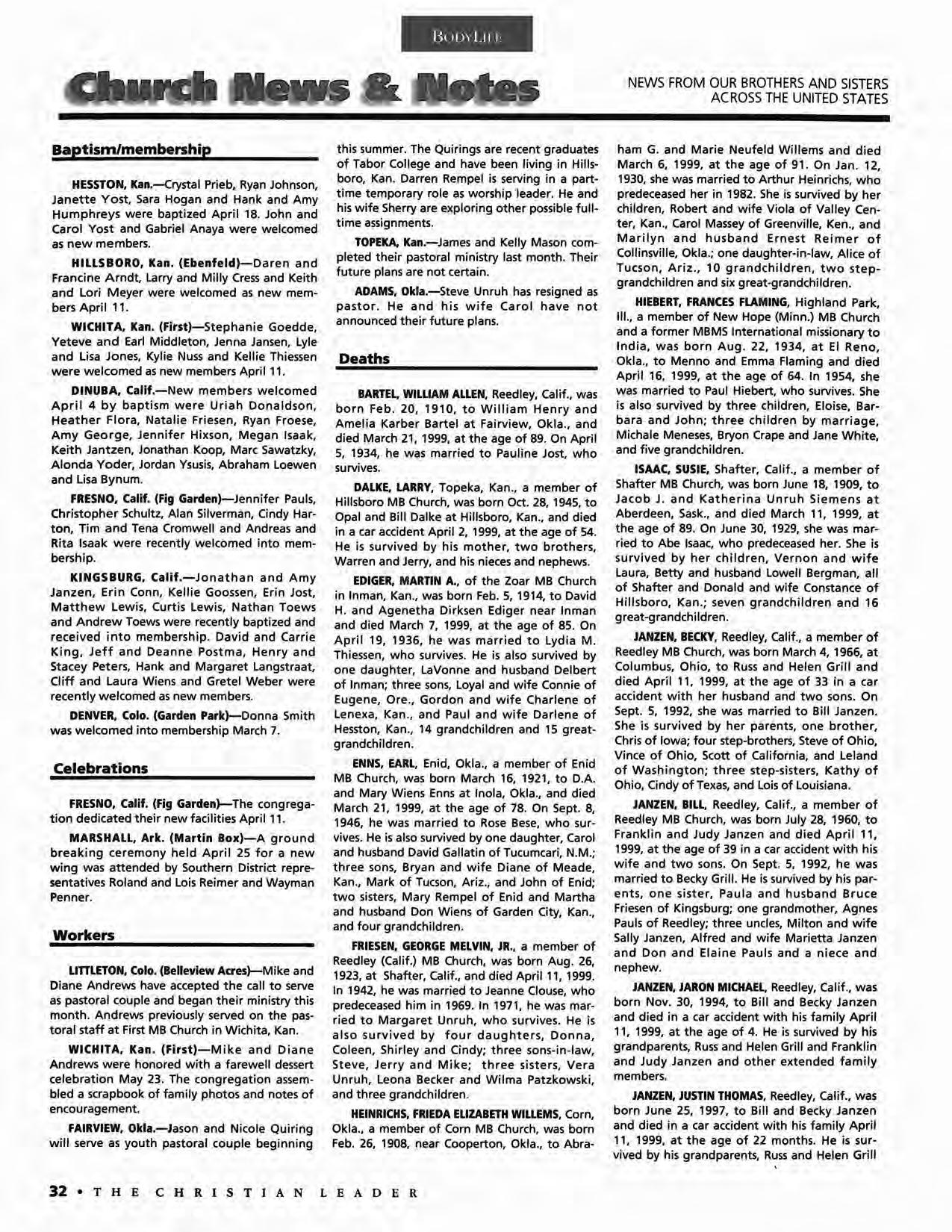
Baptism/membership
HESSTON, Kan.-Crystal Prieb, Ryan Johnson, Janette Yost, Sara Hogan and Hank and Amy Humphreys were baptized April 18. John and Carol Yost and Gabriel Anaya were welcomed as new members.
HILLSBORO. Kan. (Ebenfeld)-Daren and Francine Arndt, Larry and Milly Cress and Keith and Lori Meyer were welcomed as new members April 11.
WICHITA. Kan. (First)-Stephanie Goedde, Yeteve and Earl Middleton, Jenna Jansen, Lyle and Lisa Jones, Kylie Nuss and Kellie Thiessen were welcomed as new members April 11.
DINUBA. CaUf.-New members welcomed April 4 by baptism were Uriah Donaldson, Heather Flora, Natalie Friesen, Ryan Froese, Amy George, Jennifer Hixson, Megan Isaak. Keith Jantzen, Jonathan Koop, Marc Sawatzky, Alonda Yoder, Jordan Ysusis, Abraham Loewen and Lisa Bynum.
FRESNO. Calif. (Fig Garden)-Jennifer Pauls, Christopher Schultz, Alan Silverman, Cindy Harton. Tim and Tena Cromwell and Andreas and Rita Isaak were recently welcomed into membership.
KINGSBURG. CaUf.-Jonathan and Amy Janzen, Erin Conn, Kellie Goossen, Erin Jost, Matthew Lewis, Curtis Lewis, Nathan Toews and Andrew Toews were recently baptized and received into membership. David and Carrie King, Jeff and Deanne Postma, Henry and Stacey Peters, Hank and Margaret Langstraat, Cliff and Laura Wiens and Gretel Weber were recently welcomed as new members.
DENVER. Colo. (Garden Park)-Donna Smith was welcomed into membership March 7.
Celebrations
FRESNO. Calif. (Fig Garden)-The congregation dedicated their new facilities April 11.
MARSHALL, Ark. (Martin Box)-A ground breaking ceremony held April 25 for a new wing was attended by Southern District representatives Roland and Lois Reimer and Wayman Penner.
Workers
LITTLETON, Colo. (Belleview Acres)-Mike and Diane Andrews have accepted the call to serve as pastoral couple and began their ministry this month. Andrews previously served on the pastoral staff at First MB Church in Wichita, Kan.
WICHITA. Kan. (First)-Mike and Diane Andrews were honored with a farewell dessert celebration May 23. The congregation assembled a scrapbook of family photos and notes of encouragement.
FAIRVIEW. Okla.-Jason and Nicole Quiring will serve as youth pastoral couple beginning
this summer. The Quirings are recent graduates of Tabor College and have been living in Hillsboro, Kan. Darren Rempel is serving in a parttime temporary role as worship leader. He and his wife Sherry are exploring other possible fulltime assignments.
TOPEKA, Kan.-James and Kelly Mason completed their pastoral ministry last month. Their future plans are not certain.
ADAMS. Okla.-Steve Unruh has resigned as pastor. He and his wife Carol have not announced their future plans.
Deaths
BARTEL. WILLIAM ALLEN, Reedley, Calif., was born Feb. 20, 1910, to William Henry and Amelia Karber Bartel at Fairview, Okla., and died March 21, 1999, at the age of 89. On April 5, 1934, he was married to Pauline Jost, who survives.
DALKE. LARRY, Topeka. Kan., a member of Hillsboro MB Church, was born Oct. 28, 1945, to Opal and Bill Dalke at Hillsboro, Kan., and died in a car accident April 2, 1999, at the age of 54. He is survived by his mother, two brothers. Warren and Jerry, and his nieces and nephews.
EDIGER, MARTIN A., of the Zoar MB Church in Inman, Kan., was born Feb. 5. 1914, to David H. and Agenetha Dirksen Ediger near Inman and died March 7, 1999. at the age of 85. On April 19, 1936, he was married to Lydia M. Thiessen, who survives. He is also survived by one daughter, LaVonne and husband Delbert of Inman; three sons, Loyal and wife Connie of Eugene, Ore., Gordon and wife Charlene of Lenexa, Kan., and Paul and wife Darlene of Hesston, Kan., 14 grandchildren and 15 greatgrandchildren.
ENNS, EARL, Enid, Okla., a member of Enid MB Church, was born March 16, 1921, to D.A. and Mary Wiens Enns at Inola, Okla., and died March 21, 1999, at the age of 78. On Sept. 8, 1946, he was married to Rose Bese, who survives. He is also survived by one daughter, Carol andhusband David Gallatin of Tucumcari, N.M.; three sons, Bryan and wife Diane of Meade, Kan., Mark of Tucson, Ariz., and John of Enid; two sisters, Mary Rempel of Enid and Martha and husband Don Wiens of Garden City, Kan., and four grandchildren.
FRIESEN, GEORGE MELVIN. JR., a member of Reedley (Calif.) MB Church, was born Aug. 26, 1923, at Shafter, Calif., and died April 11, 1999. In 1942, he was married to Jeanne Clouse, who predeceased him in 1969. In 1971, he was married to Margaret Unruh, who survives. He is also survived by four daughters, Donna, Coleen, Shirley and Cindy; three sons-in-law, Steve, Jerry and Mike; three sisters, Vera Unruh, Leona Becker and Wilma Patzkowski, and three grandchildren.
HEINRICHS. FRIEDA ELIZABETH WILLEMS, Corn, Okla., a member of Corn MB Church, was born Feb. 26, 1908, near Cooperton, Okla., to Abra-
ham G. and Marie Neufeld Willems and died March 6, 1999, at the age of 91. On Jan. 12, 1930, she was married to Arthur Heinrichs, who predeceased her in 1982. She is survived by her children, Robert and wife Viola of Valley Center, Kan., Carol Massey of Greenville, Ken., and Marilyn and husband Ernest Reimer of Collinsville, Okla.; one daughter-in-law, Alice of Tucson, Ariz., 10 grandchildren, two stepgrandchildren and six great-grandchildren.
HIEBERT, FRANCES FLAMING, Highland Park, III., a member of New Hope (Minn.) MB Church and a former MBMS International missionary to India, was born Aug. 22, 1934, at EI Reno, Okla., to Menno and Emma Flaming and died April 16, 1999, at the age of 64. In 1954. she was married to Paul Hiebert, who survives. She is also survived by three children, Eloise, Barbara and John; three children by marriage, Michale Meneses, Bryon Crape and Jane White. and five grandchildren.
ISAAC, SUSIE. Shafter, Calif., a member of Shafter MB Church, was born June 18, 1909, to Jacob J. and Katherina Unruh Siemens at Aberdeen, Sask., and died March 11, 1999, at the age of 89. On June 30, 1929, she was married to Abe Isaac, who predeceased her. She is survived by her children, Vernon and wife Laura, Betty and husband Lowell Bergman, all of Shafter and Donald and wife Constance of Hillsboro, Kan.; seven grandchildren and 16 great-grandchildren.
JANZEN. BECKY, Reedley, calif., a member of Reedley MB Church, was born March 4, 1966, at Columbus, Ohio, to Russ and Helen Grill and died April 11, 1999, at the age of 33 in a car accident with her husband and two sons. On Sept. 5, 1992, she was married to Bill Janzen. She is survived by her parents, one brother, Chris of Iowa; four step-brothers, Steve of Ohio. Vince of Ohio, Scott of California, and Leland of Washington; three step-sisters, Kathy of Ohio, Cindy of Texas, and Lois of Louisiana.
JANZEN. BILL, Reedley, Calif., a member of Reedley MB Church, was born July 28, 1960, to Franklin and Judy Janzen and died April 11. 1999, at the age of 39 in a car accident with his wife and two sons. On Sept. 5, 1992, he was married to Becky Grill. He is survived by his parents, one sister, Paula and husband Bruce Friesen of Kingsburg; one grandmother, Agnes Pauls of Reedley; three uncles, Milton and wife Sally Janzen, Alfred and wife Marietta Janzen and Don and Elaine Pauls and a niece and nephew.
JANZEN. JARON MICHAEL, Reedley, Calif., was born Nov. 30, 1994, to Bill and Becky Janzen and died in a car accident with his family April 11, 1999, at the age of 4. He is survived by his grandparents, Russ and Helen Grill and Franklin and Judy Janzen and other extended family members.
JANZEN. JUSTIN THOMAS, Reedley, Calif., was born June 25, 1997, to Bill and Becky Janzen and died in a car accident with his family April 11, 1999, at the age of 22 months. He is survived by his grandparents, Russ and Helen Grill
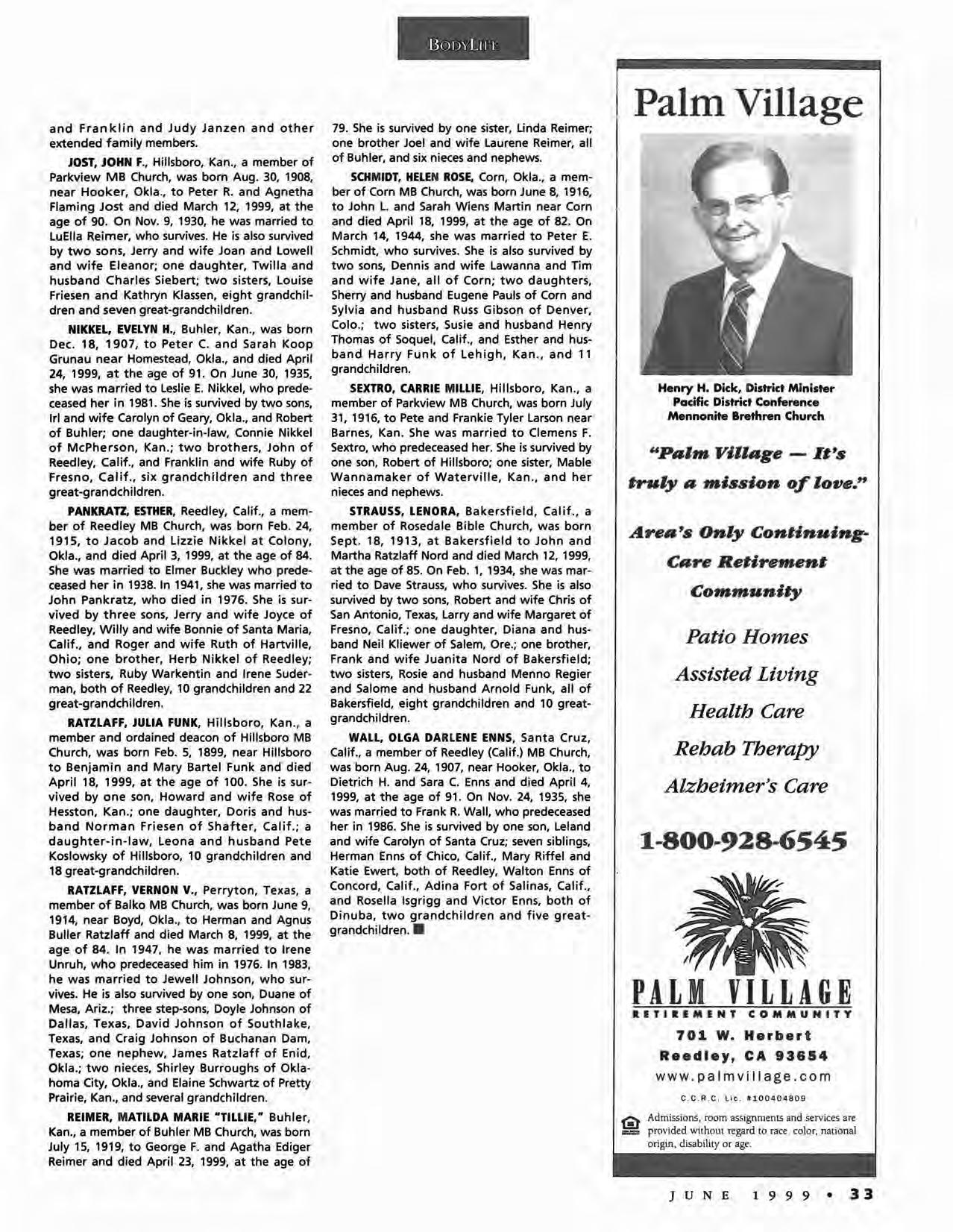
and Franklin and Judy Janzen and other extended family members.
JOST, JOHN F., Hillsboro, Kan., a member of Parkview MB Church, was born Aug. 30, 1908, near Hooker, Okla., to Peter R. and Agnetha Flaming Jost and died March 12, 1999, at the age of 90. On Nov. 9, 1930, he was married to LuElla Reimer, who survives. He is also survived by two sons, Jerry and wife Joan and Lowell and wife Eleanor; one daughter, Twilla and husband Charles Siebert; two sisters, Louise Friesen and Kathryn Klassen, eight grandchildren and seven great-grandchildren.
NIKKEL, EVELYN H., Buhler, Kan., was born Dec. 18, 1907, to Peter C. and Sarah Koop Grunau near Homestead, Okla., and died April 24, 1999, at the age of 91. On June 30, 1935, she was married to Leslie E. Nikkel, who predeceased her in 1981. She is survived by two sons, Irl and wife Carolyn of Geary, Okla., and Robert of Buhler; one daughter-in-law, Connie Nikkel of McPherson, Kan.; two brothers, John of Reedley, Calif., and Franklin and wife Ruby of Fresno, Calif., six grandchildren and three great-grandchildren.
PANKRATZ. ESTHER, Reedley, Calif., a member of Reedley MB Church, was born Feb. 24, 1915, to Jacob and Lizzie Nikkel at Colony, Okla., and died April 3, 1999, at the age of 84. She was married to Elmer Buckley who predeceased her in 1938. In 1941, she was married to John Pankratz, who died in 1976. She is survived by three sons, Jerry and wife Joyce of Reedley, Willy and wife Bonnie of Santa Maria, Calif., and Roger and wife Ruth of Hartville, Ohio; one brother, Herb Nikkel of Reedley; two sisters, Ruby Warkentin and Irene Suderman, both of Reedley, 10 grandchildren and 22 great-grandchildren.
RATZLAFF, JULIA FUNK, Hillsboro, Kan., a member and ordained deacon of Hillsboro MB Church, was born Feb. 5, 1899, near Hillsboro to Benjamin and Mary Bartel Funk and died April 18, 1999, at the age of 100. She is survived by one son, Howard and wife Rose of Hesston, Kan.; one daughter, Doris and husband Norman Friesen of Shafter, Calif.; a daughter-in-law, Leona and husband Pete Koslowsky of Hillsboro, 10 grandchildren and 18 great-grandchildren.
RATZLAFF, VERNON V., Perryton, Texas, a member of Balko MB Church, was born June 9, 1914, near Boyd, Okla., to Herman and Agnus Buller Ratzlaff and died March 8, 1999, at the age of 84. In 1947, he was married to Irene Unruh, who predeceased him in 1976. In 1983, he was married to Jewell Johnson, who survives. He is also survived by one son, Duane of Mesa, Ariz.; three step-sons, Doyle Johnson of Dallas, Texas, David Johnson of Southlake, Texas, and Craig Johnson of Buchanan Dam, Texas; one nephew, James Ratzlaff of Enid, Okla.; two nieces, Shirley Burroughs of Oklahoma City, Okla., and Elaine Schwartz of Pretty Prairie, Kan., and several grandchildren.
REIMER, MATILDA MARIE MTILLlE, M Buhler, Kan., a member of Buhler MB Church, was born July 15, 1919, to George F. and Agatha Ediger Reimer and died April 23, 1999, at the age of
79. She is survived by one sister, Linda Reimer; one brother Joel and wife Laurene Reimer, all of Buhler, and six nieces and nephews.
SCHMIDT, HELEN ROSE, Corn, Okla., a member of Corn MB Church, was born June 8, 1916, to John L. and Sarah Wiens Martin near Corn and died April 18, 1999, at the age of 82. On March 14, 1944, she was married to Peter E. Schmidt, who survives. She is also survived by two sons, Dennis and wife Lawanna and Tim and wife Jane, all of Corn; two daughters, Sherry and husband Eugene Pauls of Corn and Sylvia and husband Russ Gibson of Denver, Colo.; two sisters, Susie and husband Henry Thomas of Soquel, Calif., and Esther and husband Harry Funk of Lehigh, Kan., and 11 grandchildren.
SEXTRO, CARRIE MILLIE, Hillsboro, Kan., a member of Parkview MB Church, was born July 31, 1916, to Pete and Frankie Tyler Larson near Barnes, Kan. She was married to Clemens F. Sextro, who predeceased her. She is survived by one son, Robert of Hillsboro; one sister, Mable Wannamaker of Waterville, Kan., and her nieces and nephews.
STRAUSS, LENORA, Bakersfield, Calif., a member of Rosedale Bible Church, was born Sept. 18, 1913, at Bakersfield to John and Martha Ratzlaff Nord and died March 12, 1999, at the age of 85. On Feb. 1, 1934, she was married to Dave Strauss, who survives. She is also survived by two sons, Robert and wife Chris of San Antonio, Texas, Larry and wife Margaret of Fresno, Calif.; one daughter, Diana and husband Neil Kliewer of Salem, Ore.; one brother, Frank and wife Juanita Nord of Bakersfield; two sisters, Rosie and husband Menno Regier and Salome and husband Arnold Funk, all of Bakersfield, eight grandchildren and 10 greatgrandchildren.
WALL, OLGA DARLENE ENNS, Santa Cruz, Calif., a member of Reedley (Calif.) MB Church, was born Aug. 24, 1907, near Hooker, Okla., to Dietrich H. and Sara C. Enns and died April 4, 1999, at the age of 91. On Nov. 24, 1935, she was married to Frank R. Wall, who predeceased her in 1986. She is survived by one son, Leland and wife Carolyn of Santa Cruz; seven siblings, Herman Enns of Chico, Calif., Mary Riffel and Katie Ewert, both of Reedley, Walton Enns of Concord, Calif., Adina Fort of Salinas, Calif., and Rosella Isgrigg and Victor Enns, both of Dinuba, two grandchildren and five greatgrandchildren .•
Henry H. Dick, District Minister Pacific District Conference
Mennonite Brethren Church
Clearinghouse
Have a position to fill? Looking for a new employment or ministry opportunity? Have a gathering or celebration to promote? Reach U.S. Mennonite Brethren through a Clearinghouse classified ad. The charge is 40 cents per word, with a $15 minimum. Withhold payment until an invoice is received. MB institutions advertising vacancies or position announcements may be eligible for a no-cost ad. Contact the editor for more information.
EMPLOYMENT--CHURCH
Associate Pastor
Vinewood Community Church in Lodi, CA, is seeking a full-time Associate Pastor. The position will be tailored according to the gifting of the individual who has a deep love for Jesus, a passion for ministry, a heart for people, and a willingness to function in a team environment. A negotiable combination of some of the following ministry needs would complete the job description: Music, Christian Education, Assimilation of Newcomers, Discipleship/Small Groups. Submit resume and reference to: Pastor Search, 1900 W Vine Street, Lodi CA 95242; e-mail gwall@vinewoodchurch.com.
Director of Church Family Ministries
First Mennonite Brethren Church in Wichita, Kan., seeks full-time staff to develop and lead caregiving ministries and provide personal pastoral care in a growing church of over 700, rooted in Anabaptist tradition. Responsibilities: 1) assessing needs; 2) developing responses through deacon ministry, support systems, family enrichment events, assimilation and hospitality; 3) leading and equipping lay caregivers ministry team. Experience: 5 years related field, church ministry, group dynamics and family systems, assessment skills. Requires master's degree and seminary training or equivalent. Submit resume and references to: DCFM Search Committee, FMBC, 8000 W. 21st Street, Wichita, Kansas 67205-1744, fax (316) 7225931. Complete job description available upon request.
Director of Music and Worship
Director of Music and Worship sought by First Mennonite Brethren Church in Wichita, Kan. A full-time position to direct multiple music ministries and lead blended worship. This visionary, growing, suburban church of 700 attenders of all age groups is rooted in Anabaptist theology and committed to relevant ministry. Master's degree or equivalent experience preferred. Submit resume and references to: Music Search, 8000 W. 21st St., Wichita, KS 67205-1744; fax (316) 722-5931; e-mail fmbc@feist.com.
Pastor of Student Ministries
Vinewood Community Church in Lodi, CA, is seeking a full-time Pastor of Student Ministries. This person will provide leadership for Jr. High, High School and College student ministries. Submit resume and reference to: Pastor Search, 1900 W Vine Street. Lodi CA 95242; e-mail gwall@vinewoodchurch.com.
Youth Minister
Buhler (Kan.) Mennonite Brethren Church is accepting applications for the full time position of youth minister. We are a progressive and growing church of 350 with an established youth program. Our family life center that will complement the youth program is near completion. The successful applicant
Explort Europt
August 5-21, 1999
• Hear the Anabaptist stories
• See the sites you've read about in the Martyrs Mirror
• Make European Mennonite friends Europe is the birthplace of the Anabaptist faith; discover your heritage and learn about yourself!
• and much more will continue the program to encourage the spiritual growth and Christian fellowship of youth and young adults of our congregation and community. Send resume to Buhler Mennonite Brethren Church, Youth Minister Search Committee, P.O. Box 126, Buhler, KS 67522 .•
Find
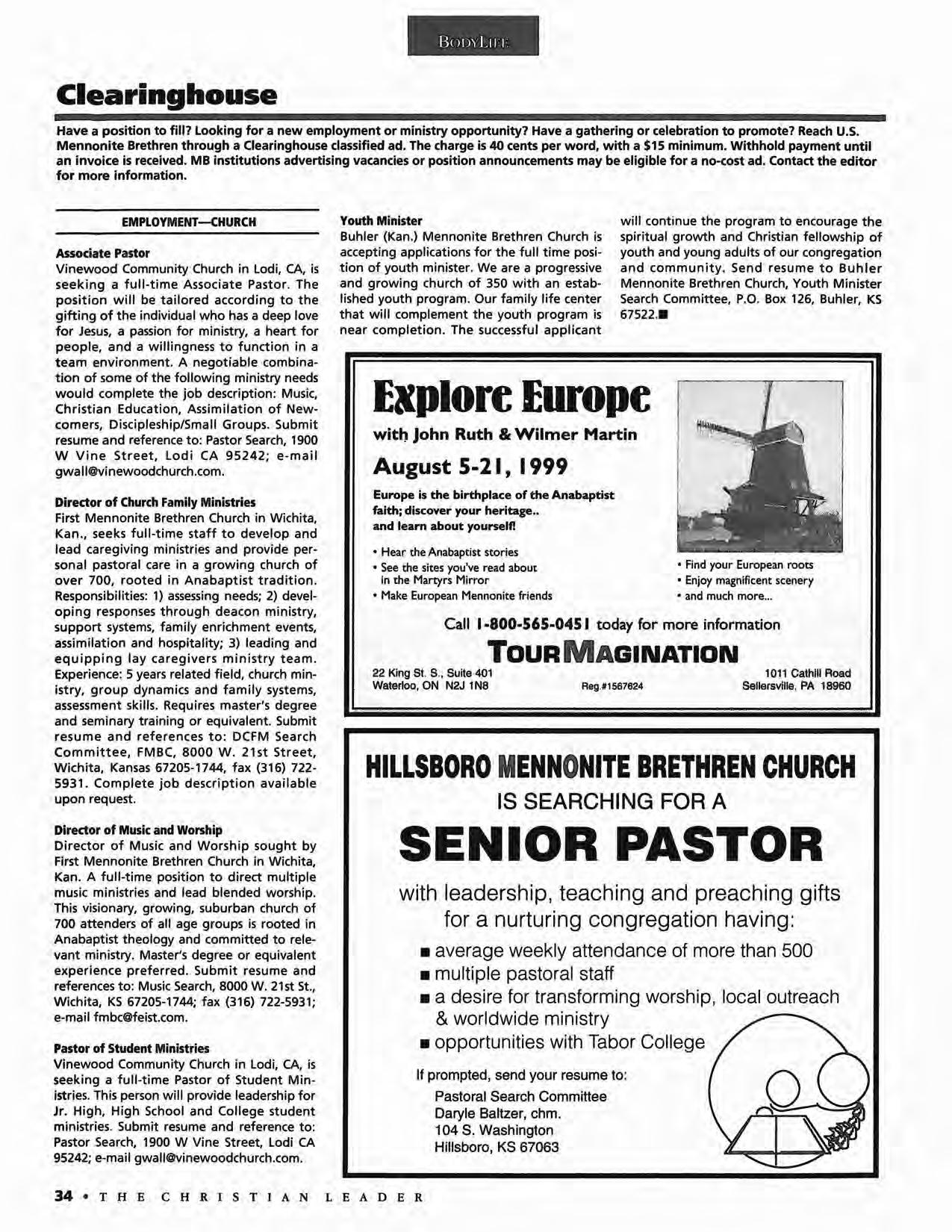
SENIOR PASTOR
with leadership, teaching and preaching gifts for a nurturing congregation having:
• average weekly attendance of more than 500
• multiple pastoral staff
•a desire for transforming worship, local outreach & worldwide ministry
• opportunities with Tabor College
If prompted, send your resume to: Pastoral Search Committee Daryle Baltzer, chm. 104 S. Washington Hillsboro, KS 67063
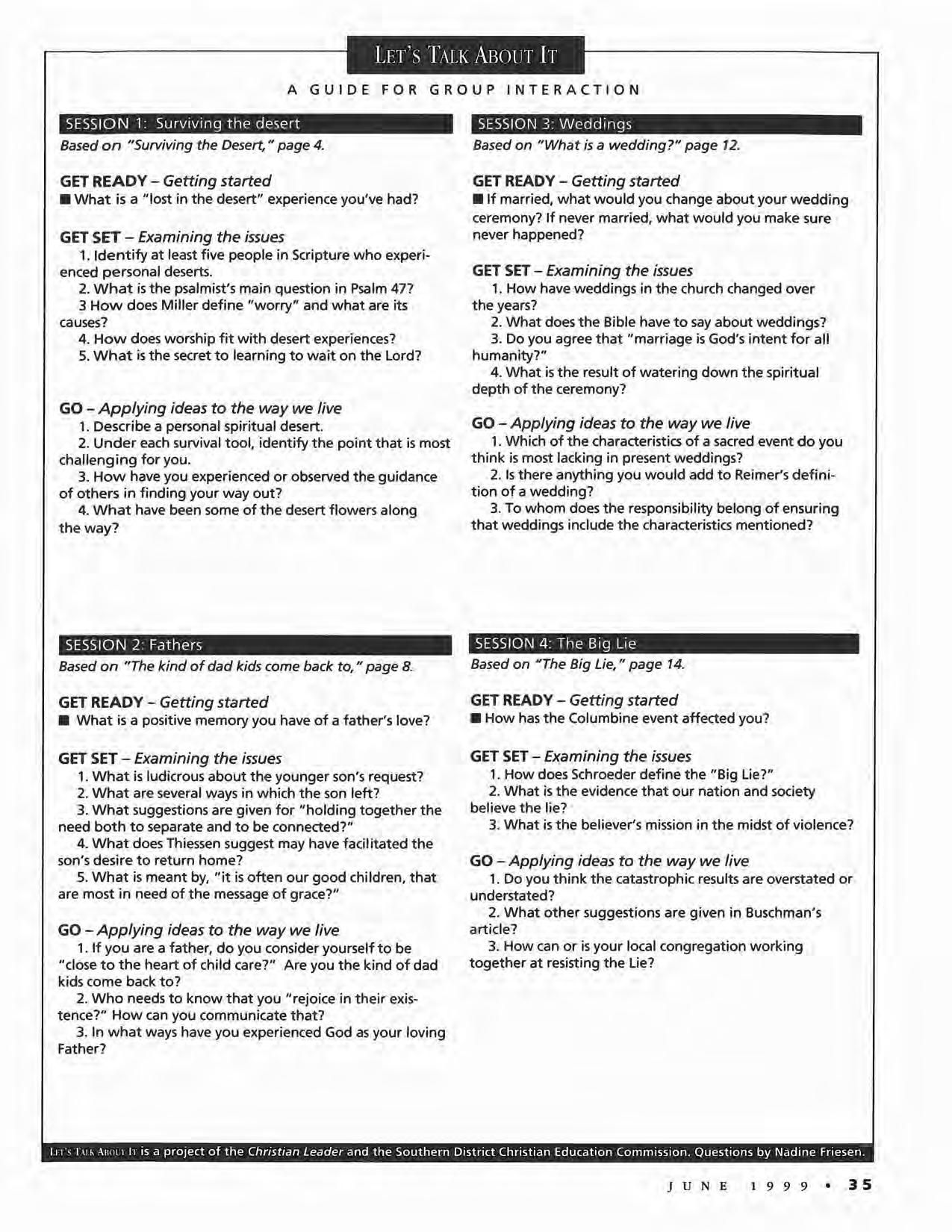
SESSION 1: Surviving the desert
Based on "Surviving the Desert, " page 4.
GET READY - Getting started
• What is a "lost in the desert" experience you've had?
GET SET - Examining the issues
1. Identify at least five people in Scripture who experienced personal deserts.
2. What is the psalmist's main question in Psalm 47?
3 How does Miller define "worry" and what are its causes?
4. How does worship fit with desert experiences?
5. What is the secret to learning to wait on the Lord?
GO - Applying ideas to the way we live
1. Describe a personal spiritual desert.
2. Under each survival tool, identify the point that is most challenging for you.
3. How have you experienced or observed the guidance of others in finding your way out?
4. What have been some of the desert flowers along the way?
SESSION 2: Fathers
Based on "The kind of dad kids come back to, " page 8.
GET READY - Getting started
• What is a positive memory you have of a father's love?
GET SET - Examining the issues
1. What is ludicrous about the younger son's request?
2. What are several ways in which the son left?
3. What suggestions are given for "holding together the need both to separate and to be connected?"
4. What does Thiessen suggest may have facilitated the son's desire to return home?
5. What is meant by, "it is often our good children, that are most in need of the message of grace?"
GO - Applying ideas to the way we live
1. If you are a father, do you consider yourself to be "close to the heart of child care?" Are you the kind of dad kids come back to?
2. Who needs to know that you "rejoice in their existence?" How can you communicate that?
3. In what ways have you experienced God as your loving Father?
SESSION 3: Weddings
Based on "What is a wedding?" page 12.
GET READY - Getting started
• If married, what would you change about your wedding ceremony? If never married, what would you make sure never happened?
GET SET - Examining the issues
1. How have weddings in the church changed over the years?
2. What does the Bible have to say about weddings?
3. Do you agree that "marriage is God's intent for all humanity?"
4. What is the result of watering down the spiritual depth of the ceremony?
GO - Applying ideas to the way we live
1. Which of the characteristics of a sacred event do you think is most lacking in present weddings?
2. Is there anything you would add to Reimer's definition of a wedding?
3. To whom does the responsibility belong of ensuring that weddings include the characteristics mentioned?
SESSION 4: The Big Lie
Based on "The Big Lie, " page 14.
GET READY - Getting started
• How has the Columbine event affected you?
GET SET - Examining the issues
1. How does Schroeder define the "Big Lie?"
2. What is the evidence that our nation and society believe the lie?
3. What is the believer's mission in the midst of violence?
GO - Applying ideas to the way we live
1. Do you think the catastrophic results are overstated or understated?
2. What other suggestions are given in Buschman's article?
3. How can or is your local congregation working together at resisting the Lie?
Questions by Nadine Friesen.
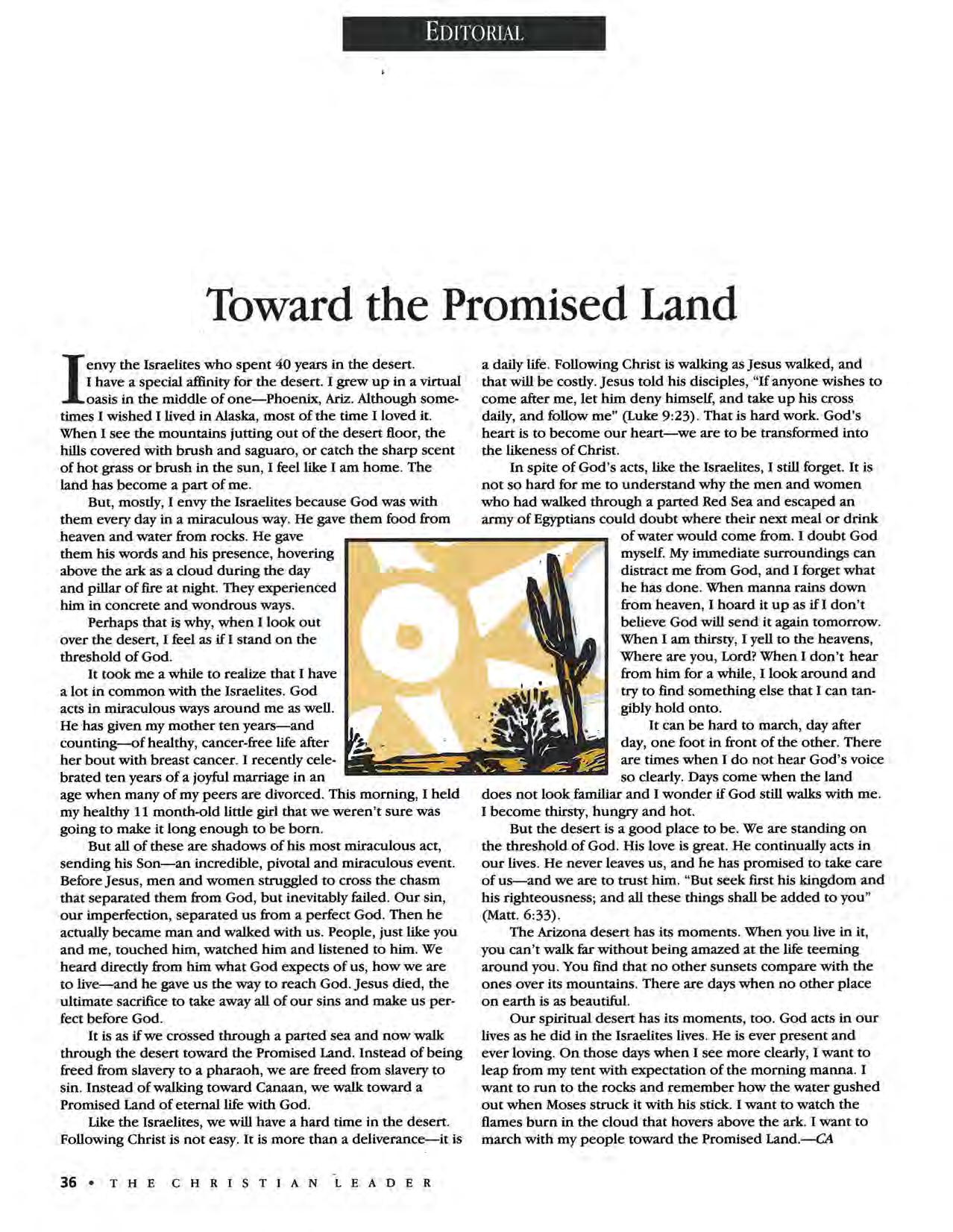
Toward the Promised Land
Ienvy the Israelites who spent 40 years in the desert.
I have a special affinity for the desert. I grew up in a virtual oasis in the middle of one-Phoenix, Ariz. Although sometimes I wished I lived in Alaska, most of the time I loved it. Whel) I see the mountains jutting out of the desert floor, the hills covered with brush and saguaro, or catch the sharp scent of hot grass or brush in the sun, I feel like I am home. The land has become a part of me.
But, mostly, I envy the Israelites because God was with them every day in a miraculous way. He gave them food from heaven and water from rocks. He gave them his words and his presence, hovering above the ark as a cloud during the day and pillar of fire at night. They experienced him in concrete and wondrous ways.
Perhaps that is why, when I look out over the desert, I feel as if I stand on the threshold of God.
It took me a while to realize that I have a lot in common with the Israelites. God acts in miraculous ways around me as well. He ,has given my mother ten years-and counting-of healthy, cancer-free life after her bout with breast cancer. I recently celebrated ten years of a joyful marriage in an age when many of my peers are divorced. This morning, I held my healthy 11 month-old little girl that we weren't sure was going to make it long enough to be born.
But all of these are shadows of his most miraculous act, sending his Son-an incredible, pivotal and miraculous event. Before Jesus, men and women struggled to cross the chasm that separated them from God, but inevitably failed. Our sin, our imperfection, separated us from a perfect God. Then he actually became man and walked with us. People, just like you and me, touched him, watched him and listened to him. We heard directly from him what God expects of us, how we are to live-and he gave us the way to reach God. Jesus died, the ultimate sacrifice to take away all of our sins and make us perfect before God.
It is as if we crossed through a parted sea and now walk through the desert toward the Promised Land. Instead of being freed from slavery to a pharaoh, we are freed from slavery to sin. Instead of walking toward Canaan, we walk toward a Promised Land of eternal life with God.
Like the Israelites, we will have a hard time in the desert. Following Christ is not easy. It is more than a deliverance-it is
a daily life. Following Christ is walking as Jesus walked, and that will be costly. Jesus told his disciples, "If anyone wishes to come after me, let him deny himself, and take up his cross daily, and follow me" (Luke 9:23). That is hard work. God's heart is to become our heart-we are to be transformed into the likeness of Christ.
In spite of God's acts, like the Israelites, I still forget. It is not so hard for me to understand why the men and women who had walked through a parted Red Sea and escaped an army of Egyptians could doubt where their next meal or drink of water would come from. I doubt God myself. My immediate surroundings can distract me from God, and I forget what he has done. When manna rains down from heaven, I hoard it up as if I don't believe God will send it again tomorrow. When I am thirsty, I yell to the heavens, Where are you, Lord? When I don't hear from him for a while, I look around and try to find something else that I can tangibly hold onto.
It can be hard to march, day after day, one foot in front of the other. There are times when I do not hear God's voice so clearly. Days come when the land does not look familiar and I wonder if God still walks with me. I become thirsty, hungry and hot.
But the desert is a good place to be. We are standing on the threshold of God. His love is great. He continually acts in our lives. He never leaves us, and he has promised to take care of us-and we are to trust him. "But seek first his kingdom and his righteousness; and all these things shall be added to you" (Matt. 6:33).
The Arizona desert has its moments. When you live in it, you can't walk far without being amazed at the life teeming around you. You find that no other sunsets compare with the ones over its mountains. There are days when no other place on earth is as beautiful.
Our spiritual desert has its moments, too. God acts in our lives as he did in the Israelites lives. He is ever present and ever loving. On those days when I see more clearly, I want to leap from my tent with expectation of the morning manna. I want to run to the rocks and remember how the water gushed out when Moses struck it with his stick. I want to watch the flames burn in the cloud that hovers above the ark. I want to march with my people toward the Promised Land.-CA
